You're currently viewing a custom sorting.
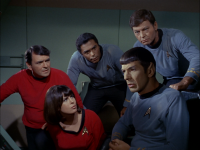
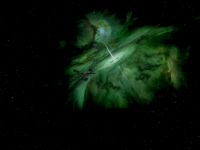
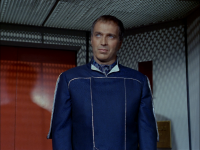
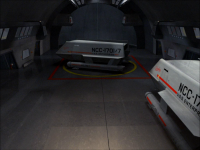
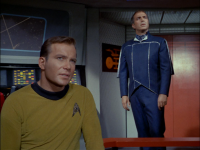
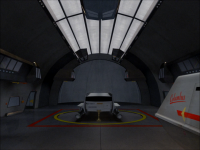
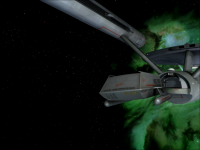
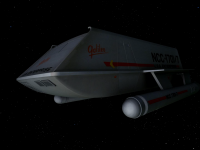
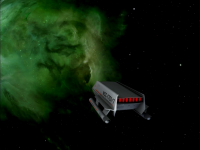
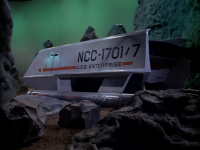
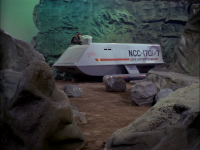
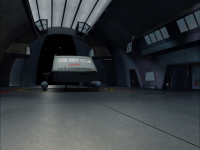
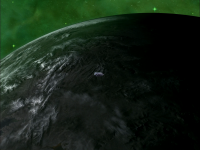
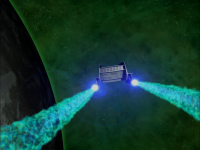
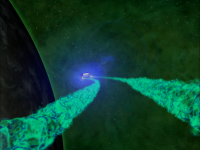
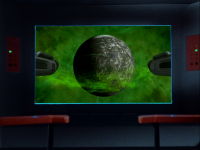
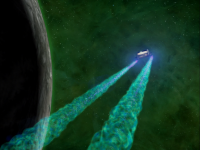
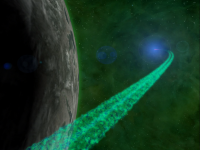
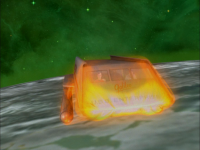
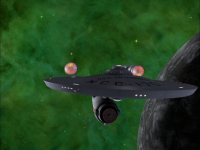
Star Trek TOS - 1x16 - The Galileo Seven
Originally Aired: 1967-1-5
Synopsis:
Seven Enterprise crew members go on a shuttle mission with Spock in command. [Blu-ray] [DVD]
Filler Quotient:
2, filler, but an enjoyable episode nevertheless. You can skip this one, but you'd miss out on some fun.
- There's no essential plot or exposition in this episode that renders it unskippable, but it's definitely a fun ride!
Problems
- Kirk says Spock's shuttle could be lost in one of "four complete solar systems in the immediate vicinity" in the teaser. Uhura later in the scene also mentions one of the "solar systems." This is a common error. The term they were looking for is planetary system. The planetary system we live in is called the Solar System because our star is named Sol. As such, the term "Solar System" is a proper noun, not a generic term.
- The Murasaki quasar system was originally intended to be an actual quasar, but scientific knowledge has advanced considerably since the time that this episode was filmed. As a consequence, we now know that there are no quasars in the Milky Way galaxy. A quasar is in fact an extremely bright but distant galaxy. As such, we must conclude that the system under study in this episode actually a quasar-like phenomenon rather than an actual quasar. This is luckily a reasonable conclusion for us to draw because Kirk's standing orders were stated to be that he study any "quasars or quasar-like phenomena" that he should encounter.
- The rock prop that fell on Spock's leg was so light that Nimoy actually had to quite obviously hold it on his leg to make it appear "stuck" there.
Factoids
- This episode received an extensive visual effects update when it was remastered that was far greater in scope than that of the other remastered episodes.
Remarkable Scenes
- Kirk justifying his curiosity to Ferris.
- The shuttle launch. The first time we see one launch!
- Kirk arguing with Ferris over what should and shouldn't have been done and what to do now.
- Spock declaring that he will decide who will and will not be left behind.
- An alien monster killing one of the crew members.
- Spock's negative reaction to the idea of taking the life of an alien indiscriminately.
- Scotty's idea to rig the phasers as a power source for the shuttle.
- McCoy harping on Spock for making bad decisions.
- Spock: "Strange. Step by step I've made the correct and logical decisions and yet two men have died!"
- Kirk being forced to abandon the search.
- Spock igniting the fuel in a flare in an attempt to get the Enterprise to notice them.
- Spock, explaining his desperation: "I examined the problem from all angles and it was plainly hopeless. Logic informed me that under the circumstances the only possible action would have to be one of desperation. A logical decision, logically arrived at." Kirk: "Ah hah. I see. You mean you reasoned that it was time for an emotional outburst."
My Review
Obligatory Earth bureaucrat of the week becomes a repetitive pain in the ass for Captain Kirk as the Enterprise feverishly engages in the search and rescue of the derelict Galileo shuttle which veers off course not long after beginning its mission and crashes while attempting to study the Murasaki quasar-like multiple star system. I have mixed feelings about this premise. Parts of it are fantastic but other parts are riddled with unnecessary details that drag down the appeal of the plot. None of these annoying details ruin what turns out to be an exceptional story for the most part but are regardless worth a mention. The two most prominently poor choices are the character of Ferris and the choice to have the shuttle crash on a habitable planet.
First let's talk about Ferris. The whole point of his character was to force Kirk into having a short window of opportunity with which to rescue the downed shuttle. We didn't need such an overdone character to achieve that. Something along the lines of Starfleet Command radioing Kirk every now and then and yelling "where the hell are you?" would have even been sufficient to achieve this dramatic effect. Instead we get a useless character trolling the bridge in nearly every one of the Enterprise's scenes acting smug and self-righteous; contributing absolutely nothing useful to the story.
Second let's talk about the habitable planet the shuttle crashed on. Of all the random gravity wells the shuttle could have fallen into they happen to land on a habitable planet? In the middle of a quasar-like system? I find that hard to believe. But even setting that issue aside, the planet's habitability was not an asset to the story largely because the subplot concerning the crew fending off the primitive natives followed by the subsequent burial controversy was not terribly compelling. A much more compelling and realistic story would have had the shuttle crash on a deserted wasteland not unlike Mars or Venus forcing the crew to don spacesuits in order to make repairs. Personally I find the idea of a hostile environment on the planet far more compelling than spear chucking hostile aliens.
Ignoring those annoying aesthetics, this episode is terrific. It's a lot of fun watching Spock handle his first command and getting a chance to see him as fallible just like the rest of us. Granted, many of those serving under him were a bit too quick to criticize the many reasonable choices he made, but it's also clear by his own admission that some of his choices were not at all appropriate. The most obviously poor choice Spock made was to order Gaetano to patrol the periphery of the crash site alone, rendering him an easy kill by one of the aliens. This is counterpointed brilliantly by Spock's innovative act of desperation igniting the improvised flare at the end of the episode. Indeed we learn a lot about our pointy-eared friend in this great Spock character drama, not the least of which is that while he may not be perfect, he is certainly decisive and thinks on his feet well. These qualities in my opinion portrayed him as a fine leader.
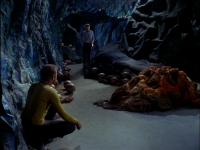

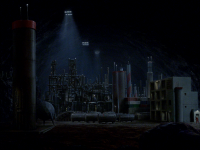
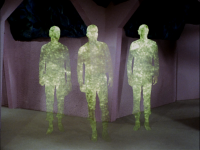
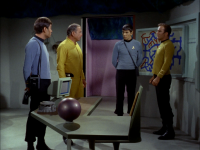
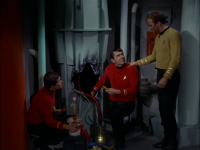
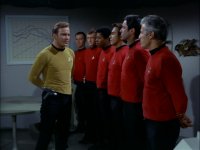
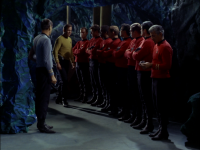
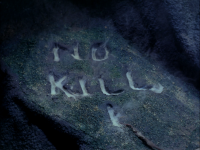
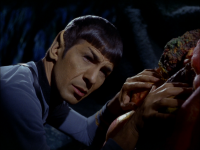
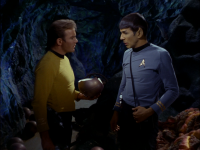
Star Trek TOS - 1x25 - The Devil in the Dark
Originally Aired: 1967-3-9
Synopsis:
An unknown monster threatens a mining operation. [Blu-ray] [DVD]
Filler Quotient:
2, filler, but an enjoyable episode nevertheless. You can skip this one, but you'd miss out on some fun.
- There's no essential plot or exposition in this episode that renders it unskippable, but it's definitely one of the better stories of the series.
Problems
None
Factoids
- This episode firmly establishes that Vulcan mind melds can be performed without touch but are more successful with touch, a fact previously only implied by a couple prior episodes.
Remarkable Scenes
- Spock proposing that the monster might be silicon-based and McCoy's reaction.
- The hilarious looking silicon-based life form.
- Spock hypothesizing that the silicon-based life form may be the last of its kind and that they should protect it at all costs.
- Spock: "The creature is in your area. Take a life form reading." Kirk: "That's not necessary Mr. Spock. I know exactly where the creature is." Spock: "Where, captain?" Kirk: "Ten feet away from me."
- Kirk hesitating to kill the creature.
- Spock's mind meld with the silicon-based life form.
- McCoy's reaction to seeing Spock mind melding with the silicon-based life form.
- McCoy: "I'm a doctor, not a bricklayer!" (Count #2 for "I'm a doctor, not a [blah]" style lines McCoy is famous for.)
- McCoy: "By golly Jim, I'm beginning to think I can cure a rainy day!"
My Review
The Devil in the Dark is a terrific story with excellent pacing, especially at the beginning. I'm not typically a fan of the horror movie aesthetic, but this episode rises well above that by delivering a narrative with a compelling moral dilemma enhanced by well crafted sci-fi texture. Stories about how human resource extraction often comes at the expense of indigenous life are nothing new, but the alien characteristics of the lasagna monster--er, I mean silicon-based life form are what make this story particularly compelling. Scientists have long suspected that because silicon and carbon share many chemical properties that it may be possible for a hypothetical type of biochemistry to exist based on silicon instead of carbon. While I have my doubts that the lasagna monster depicted in this episode is a very realistic extrapolation of what silicon-based life might look like, the episode grapples with the idea in a reasonably intelligent way for the most part, even if it may leave you slightly hungry for lasagna after you're done watching it.
One of the best details of the episode is the plot's constant struggle to reconcile the desire to protect the miners with the concurrent desire to preserve the life of the creature. At first Spock questions the need to kill the creature only to be lectured by Kirk that a murderous rampaging monster cannot be permitted to live. But later on in the story their positions interestingly reverse. When Kirk personally confronted the creature, he realized that in its wounded state it had been rendered far less aggressive and Kirk started to ponder a means of rendering it harmless without killing it. Spock by this point was quite taken with Kirk's prior pragmatic attitude and advised killing it on sight. The way both men wrestle with their duty to save the miners and their scientific curiosity about the lasagna monster was nicely done and the use of a Vulcan mind meld as a means to fully understand the creature was a nice bit of continuity. I just wish those mind meld scenes weren't so frequently poorly acted and painfully slow.
After the mind meld Spock learns a whole slew of fascinating things about the creature which is apparently an intelligent animal, possesses language, and calls itself a horta. While it was fairly obvious from some of the first scenes that the silicon nodules were in fact eggs, thankfully the plot did not hinge its entire dramatic appeal solely on this revelation. Instead the focus on forging a peace treaty predicated on trade and mutual cooperation between the miners and the lasagna monsters was an excellent idea, true to the spirit of Star Trek. Much like in The Corbomite Maneuver or The Menagerie, the alien of the week has turned out not to be an evil monster after all but instead a sensitive intelligent creature which likewise desires peace and cooperation. The idea that all life shares at some level a desire to avoid conflict is perhaps Star Trek's most inspiring theme and this episode is the best one so far to directly tackle it.
The following are comments submitted by my readers.
- From Kelli Tipton on 2008-11-20 at 7:55am:
You have something against English Imperial Units, I take it? And are you sure they are not U.S. Customary Units instead?
If you look at the Apollo plans, components are measured in U.S. Customary Units. Why would Roddenberry use Metric? Seriously, the only people who ever seem to care about Metric are people who feel the need to feel scientific. Meanwhile, they can't seem to use a unit that can be divided by 3. Just think of that... You can't have a third of something, nor measure out 7/16 of an inch easily. How lame is that. - From Giuseppe on 2009-03-10 at 1:03am:
I don't really mind it when they use the Imperial system, however it does make sense that they would use the metric system. After all, the Enterprise is an Earth built ship with a mostly Earth crew and the metric system is the most widespread measurement system on Earth (that was also true back in the '60s). In fact today there are only three countries in the world that don't use it as a primary system: The US, Myanmar and Liberia. Even the Brits who invented the Imperial system now use metric as the primary measurement system.
The comparison with Apollo is forced to say the least. The Enterprise isn't an all-American project like Apollo was.
And yeah, on a starship you'd expect that they use the best scientific measurement system around and, for the moment at least, that's metric. It's based on decimal multiples, just like our numbering system, you don't have to mess with various conversion factors when converting from one unit to another (you just have to move the decimal point or change an exponent), nor is there a need to express measurements in fractions. - From 411314 on 2009-06-15 at 11:12pm:
I loved how this episode looked like a standard fight the dangerous monster episode and turned out to be completely different. I never saw the ending coming until the eggs were found. - From Scott Hearon on 2014-03-31 at 12:04pm:
I really liked this one. Aside from the almost comical appearance of the Horta, there was a lot of thought in this tale.
Most of my gripes are related to McCoy's healing of the Horta. From Kirk's oddly agressive insistence that McCoy shutup and do something that he's not trained to do, to the eye-roll inducing line, "I'm a doctor, not a bricklayer!", I had to cringe.
Aside from these a few other very minor oddities, this was a great little story of rethinking initial impressions. There is, of course, the core Star Trek element of not only seeking out new life, but attempting to forge peaceful bonds with it, whenever possible. This episode took advantage of the opportunity to capitalize on this grand notion, whereas some previous episodes (such as "Arena") missed out. - From Alan Feldman on 2015-01-24 at 5:27pm:
THE DEVIL IN THE DARK
Episode is better than one would think given a synopsis (one without spoilers, anyway) of it.
You wrote: "When Kirk personally confronted the creature, he realized that in its wounded state it had been rendered far less aggressive and Kirk started to ponder a means of rendering it harmless without killing it." Good point. I never thought of that. OTOH, Kirk earlier warns us that there's nothing more dangerous than a wounded animal. So I guess the devil is in the details. (Sorry -- couldn't resist.)
I thought the mind-meld scenes went on for too long.
Units again? Scientists often use non-metric units. High-energy physicists, for example, measure mass and energy in electron volts. An electron has a mass of about 511 keV, which is more convenient than 9.110x10^-28 gm, especially in relativistic formulas. A proton has a mass of about 938.3 MeV; a neutron, 939.6 MeV. In the case of calculating the binding energy of nuclei they often use atomic mass units with a table of "mass excess". They also use feet! Electrical signals travel at close to the speed of light. They take 1 nanosecond to travel 1 foot. This is useful in estimating delays due to cabling. Angular momenta of particles, nuclei, and electrons in an atom are most conveniently measured as integral or "half-integral" (0, 1/2, 1, 1 1/2, 2, 2 1/2, . . .) multiples of Plank's constant divided by (2*Pi). (In the first two cases it's a special form of angular momentum called spin.) Then there're light years and parsecs, neither of which is metric. There are many more examples. Oh, and astronomical units. Bottom line: use the right units for the job. (Similar to, "Use the right tool for the job".)
Notice that Kirk said, "The chart says these tunnels converge a few thousand yards further." A few thousand yards?! That's a few kilometers (to put it in metric units)!
KIRK: You take the left (points to his right); I'll take the right (points to his left). Do they really think we're that stupid?
Notice the cave floor is just a regular floor. Not a biggie. Just sayin'.
23rd level? There are at least 23 levels? That's a lot of levels!
"We'll use clubs." Seriously? 30:31-30:36, 44:08-44:15, 44:25-44:28. I guess so!
At 44:08 the miners club the red-shirts. Shouldn't they be charged with a crime?
AEF
- From Chris on 2018-09-29 at 7:51pm:
I love this episode and was actually more fascinated by the reviewers!
Kethinov - I'm often amazed at your command of the language and truly appreciate the insights you bring to your reviews and thought about these stories! THANK YOU!
As far as unit usage goes, this show was made for American audiences first and foremost, not Europeans. As far as the U.S. usage of metric vs. Imp. measurements go, the military has used metric as far as I can remember, which is a long-assed time!
Feldmen - You seem to be nit-picking a bit.
I like McCoy's, "I'm a doctor, not a..."! Check that, I love them!
Time for Lasgna! - From Chris on 2019-02-03 at 12:06am:
I thought of a true complaint that has not been addressed by anyone including myself which irritates me and prompts yet another comment!
This Horta, "which moves through rock like we move through air" is not accurate at all! The creature moves through rock the way birds move through air, except that birds don't leave the equivalent of vacuums in their wake! These things, er, creatures should have left massive caverns or at least molten rubble in their wake, which would be far more accurate! The rock isn't simply being vaporized. Even if it could, there would be something left, heat, of extraordinary levels that no human could be close to it even months after the creature had gone!
I know no one reads my nonsense this late in the game but I still feel the need to rant a little. - From Chris Long on 2019-05-13 at 2:17am:
... and so here I yam yet again!
How is it that McCoy, The greatest medical mind in the history of the Federation not know about the notion of Silicon-Based Life?
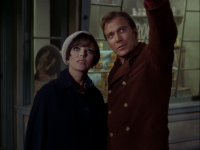
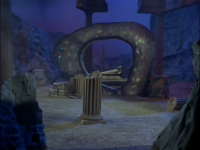
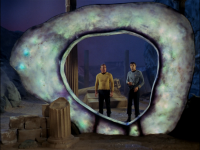

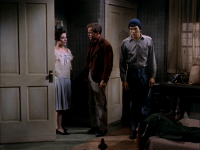
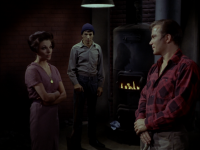
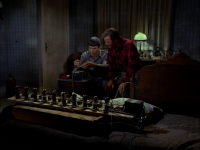
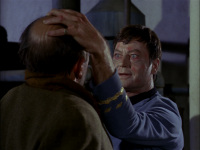
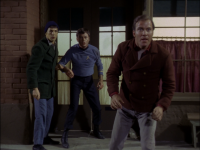
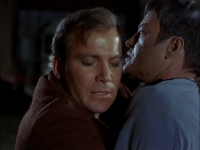
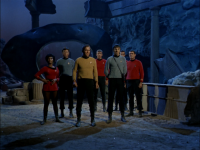
Star Trek TOS - 1x28 - The City on the Edge of Forever
Originally Aired: 1967-4-6
Synopsis:
Kirk and Spock go back in time to save McCoy. [Blu-ray] [DVD]
Filler Quotient:
0, not filler, do not skip this episode.
- Aside from being one of Star Trek's most famous episodes, this episode is also a prerequisite for watching TAS: Yesteryear.
Problems
None
Factoids
- This episode won the 1968 Hugo Award for Best Dramatic Presentation.
Remarkable Scenes
- The look on Sulu's face when he was injected with Cordrazine.
- Kirk and Spock questioning the Guardian of Forever.
- McCoy destroying history.
- Kirk trying to explain Spock to the police officer.
- Edith Keeler's speech: "One day soon man is going to be able to harness incredible energies. Maybe even the atom. Energies that could ultimately hurl us to other worlds in some sort of space ship. And the men that reach out into space will be able to find ways to feed the hungry millions of the world and to cure their diseases. They will be able to find a way to give each man hope and a common future."
- Spock discovering that Edith Keeler may be supposed to die.
- McCoy on a rampage.
- Spock proving Edith Keeler must indeed die.
- McCoy: "I'm a surgeon, not a psychiatrist." (Count #3 for "I'm a doctor, not a [blah]" style lines McCoy is famous for.)
- Edith Keeler's death and Kirk restraining himself from saving her.
My Review
What if going back in time and saving one person from dying in a terrible tragedy led to an even greater tragedy for millions more people a short time later? The City on the Edge of Forever is not the first episode of Star Trek to deal with issues raised by contaminated timelines, but it's certainly the best one to tackle the issue so far as it features both excellent humor and a terrific dark dramatic story. The humor in McCoy's insane rampage, the drama in Edith Keeler's death, the dynamic nature of the storytelling, the unusual pacing, and the unusually high quality acting on the part of the main cast make this story easily among the most memorable episodes produced thus far.
Unlike previous dabbles into time travel storytelling such as Tomorrow Is Yesterday, this episode treats the implications of time travel notably more responsibly. Even little details such as Spock remarking on how much useful historical data he could collect using the Guardian of Forever are an excellent illustration of this, but no scene is more compelling in this respect than Keeler's death. Beyond the dramatic appeal, there is also time travel intrigue. She died crossing the street, trying to find out what Kirk, McCoy, and Spock (well maybe not Spock...) were all so happy about. Thus, they are the direct cause of her death! This episode didn't merely acknowledge the implications of a time travel paradox, it used one for dramatic effect!
Though no matter how captivating this story may be dramatically, it is not without its flaws. Chief among the issues in this story is the Guardian of Forever itself. What was it doing there? Why didn't they investigate it any further? Why did they just leave such a powerful and potentially dangerous piece of technology laying around there for anyone else to find and misuse in the way McCoy accidentally did? Why was the landing party insulated from the changes to the timeline? Did the Guardian of Forever protect them somehow due to their proximity to it? This episode definitely treated time travel more responsibly this time around, but still not responsibly enough for a perfect score I'm afraid. With more careful writing this episode certainly could have earned one.
The following are comments submitted by my readers.
- From Arianwen on 2010-07-23 at 12:29am:
Well, I suppose I can't be applauded for my originality; like the majority of fans, this is for me one of the best TOS episodes ever. I think the reason I find it so enjoyable (I never once feel the need to skip forward) is that it takes the show out of its comfort zone. No redshirts, no all-powerful, murderous or otherwise interfering aliens, no fight scenes, no long, penetrating Kirk-stares... it flows very well. I really appreciate all the detail in the guest characters, the background people, the scenery - as well as in the little twitches in the characters' expressions. As you said, the acting is excellent.
With all of this going on, I wasn't too bothered about their not wrapping up the business with the Guardian of Forever. In fact, I think it makes the episode rather more real - Kirk is in no mood for mysteries, he just wants to "get the hell out of here". The episode had to end there; anything afterwards would have felt false. - From Robert Koenn on 2011-02-17 at 7:45pm:
Of course there is all the controversy concerning this episode. I have never read Ellison's original script, although I think it is available, but from what I have read about it it is even more powerful than the episode. I enjoyed greatly that it dealt with time travel in a very rationale way. The story itself was great and the way the writers wrote in Keeler's insights were perfect, even if slightly corny. And tying her into the existing and the alternative history was plausible. Finally the underlying love story made sense and was heart felt, especially Kirk watching her die at the end. And for me I found the guardian excellent. It was perfect advanced technology scifi the way they did the guardian and I loved the effects and sounds at the portal. This is still my favorite episode of the entire universe although there are many other excellent episodes. Interesting that it was written by an excellent alternative fiction writer. Amok Time was also by an established scifi writer and another of my favorites. - From John Bernhardt on 2014-01-31 at 4:50am:
Shatner's performance here makes me think of the overall issue of William Shatner's acting. He is a very erratic actor. It is often commented on how he overacts, over emotes, does those trademark pauses between words etc. It's all true. The irony is that he actually does have acting chops, he just lacks restraint. The great range he shows here-the charm, the humor, to the extremely believable pathos and anger at the end shows off where his strength's are as an actor when he just shows a little restraint.
- From Scott Hearon on 2014-04-01 at 10:50am:
Kethinov raises just about every issue that came to mind as I was watching this episode, which I thought to be very good but not without some problems.
Time travel stories are always fraught with peril, and this one is no different. As is stated in Kethinov's review, I feel that some of it could have been explained with a tiny bit of smart exposition. Perhaps the landing party WAS insulated from the greater effects of the time distortion, but the fact that this issue isn't even raised by any of the crew was glaring.
I also found the pacing a bit odd. The romantic relationship between Kirk and Keeler seemed both rushed and forced. It was difficult to see exactly what Keeler saw in Kirk, and her strange intuition was a bit nebulous. This part of the story could probably have used more time to develop, though this is unrealistic for a 50-minute TV show episode.
These problems, though, are fairly minor. The overall story was a strong one, and the tragic and emotional punch at the end may be the strongest of the series so far. The entire story was a creative reworking of the classic, "If you could go back in time and kill Hitler, would you do it?" idea. By flipping the script and asking whether you would allow a good person to die in order to save millions, this story adds a far deeper and more probing question.
I didn't find this episode to be my absolute favorite one, but it may be the one that stays with me the longest. - From Peter Collins on 2015-02-25 at 11:14pm:
I've just seen this for the first time in maybe 20 years and I was struck by the use of the song Goodnight Sweetheart, both in itself and as a repeated piece of incidental music - slightly heavy handed in foreshadowing Edith Keeler's death, but also interesting in that Goodnight Sweetheart is the name of a British situation comedy of the 1990s that involved a young man finding a rip in time in east London that transports him back to the wartime London of the 1940s and back. It too had many flaws, not least in making the time traveller - who ends up married to two women in different times - extremely unlikeable. I suppose the sitcom writers chose the music for a reason... - From jd_juggler on 2015-03-22 at 2:41pm:
Under "problems", you list "none", and then in the narrative proceed to list several problems! Clark Gable did not appear in any movies in 1930, and he was far from a household name at the time, yet Edith expresses great puzzlement when McCoy and later Kirk don't recognize the name. At one point, Spock says he needs three or four pounds of platinum, apparently unaware of how rare and expensive platinum is. Hard to believe, since Spock usually seems to know a lot about earth and it's history. When the timeline has been restored (Edith hit by truck), Kirk and Spock, followed by McCoy, return through the Guardian of Forever - but they are leaping through it. How do they know to "leap"? As mentioned by others here, there are always problems with time travel episodes. If there never was an Enterprise, then how did McCoy get to the Guardian of Forever in the first place? - From Pietro on 2019-06-17 at 8:55pm:
Did anyone else notice Uhura taking notes from Kirk with PEN & PAPER?? Maybe this happens elsewhere in TOS but it looks really funny, sitting in front of a giant computer panel. Does that make pen-and-paper the oldest technology in the series, I wonder? :D
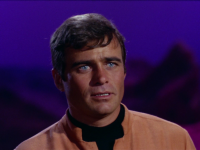
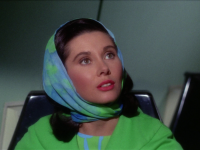
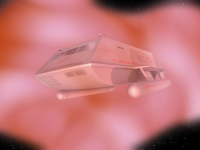
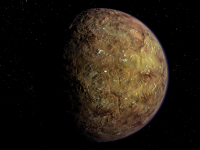
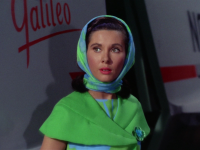
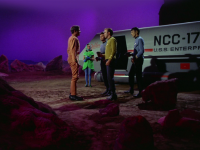

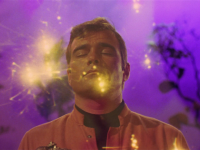
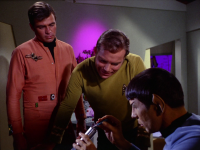
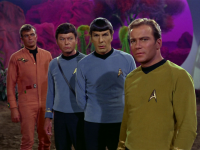
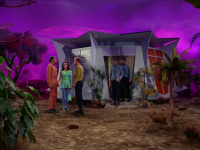
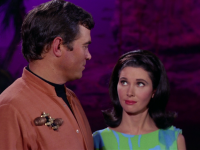
Star Trek TOS - 2x09 - Metamorphosis
Originally Aired: 1967-11-10
Synopsis:
The shuttlecraft Galileo makes a forced landing on a world with a single human inhabitant. [Blu-ray] [DVD]
Filler Quotient:
1, partial filler, but has important continuity. I recommend against skipping this one.
- The Zefram Cochrane character is first introduced in this episode, although it is his chronologically final appearance.
Problems
None
Factoids
- This episode establishes that Zefram Cochrane invented warp drive.
- This episode establishes that Zefram Cochrane is at least 237 years old.
- This is the first episode to feature a Federation universal translator device.
Remarkable Scenes
- Cochrane's sudden appearance before the landing party.
- McCoy, regarding Cochrane: "Talks a lot, but he doesn't say much."
- The revelation of who Cochrane really is.
- Cochrane: "Believe me captain, immortality consists largely of boredom."
- Kirk enticing Cochrane to rejoin the universe.
- Kirk conspiring to attack Cochrane's companion.
- Kirk negotiating with the companion.
- Cochrane agreeing to stay with his now in human form companion.
My Review
This was a charming story with a premise that should not have worked anywhere near as well as it actually did. If I were to describe the episode to someone as "Kirk, Spock, McCoy, and annoying Federation bureaucrat of the week crash land onto a random alien planet," I would likely receive yawns in response. However, adding in details like "whereupon they discover the long lost Zefram Cochrane, the inventor of warp drive, still alive despite being aged over 200 years, sustained by a neurotic alien entity which has fallen in love with him," I suspect I might raise a few more eyebrows.
The appeal of this episode lies solely with Cochrane. It takes an unfortunate twelve minutes into the story before the narrative finally allows Cochrane to reveal his backstory (we can't let the plot move forward too quickly now, can we!), but when he finally does, the implications are fascinating. What kind of life has this man led? As he interacts with the landing party, the story grapples with concepts like immortality, eternal captivity, and inter-species love in remarkably compelling ways.
However, I would have enjoyed a deeper exploration of Cochrane's life on pre-Federation Earth. Why did he invent warp drive? How did he achieve the breakthrough? What were relations with the Vulcans like before the Federation existed? Given Cochrane's "parochial" and arguably racist and xenophobic attitude towards aliens, I can only imagine that Cochrane's era was a considerably different one. But the episode spends little time on the totality of Cochrane's long, storied past.
Both Nancy Hedford's character as well as the entity fell considerably more flat, as Nancy spent most of her time acting irrationally and the entity came off as a female version of Nomad. Even with the two of them combined at the end of the episode, there still wasn't enough personality between them to add up to being a compelling character. It's also worth noting that the companion unilaterally inhabiting Nancy's body could be seen as morally questionable, but since Nancy seemed to be all for it after the fact, it could be dismissed as voluntary. I suppose since her only other choice was death, the moral ambiguity is somewhat moot.
Speaking of death, I found it intriguing that Kirk repeatedly argued that the eternal captivity of Cochrane and the landing party would lead to their deaths. Kirk's statement was at best a metaphor and at worst a lie. Nevertheless, it was a perceptively persuasive tactic. Kirk basically recognized that the landing party was brought to this planet because Cochrane wished for companionship. Kirk expanded on Cochrane's dissatisfaction with the boredom of captivity to convince to the entity that her solution would be ineffective in the long term because that boredom would merely reassert itself in short order. Sure, some of his rhetoric may have been a bit less than accurate, but what good diplomat doesn't fudge the truth every now and then? ;)
A final wrinkle in the story is Kirk's refusal to reveal the discovery of Cochrane to the Federation, nor the true fate of Nancy. I can understand Cochrane's desire to avoid fame, but doesn't Nancy have at least a single person in the Federation who cares about her? Parents, siblings, family of any kind? Won't they want to know what happened to her? Won't they want to come visit her? Perhaps throw a wedding party? Kirk was responsible for Nancy's safety, as he himself so appropriately pointed out in the middle of the story. It was irresponsible for him to lie about her fate after the fact.
Overall though this was a terrific story. I'd love to see the Zefram Cochrane character again in subsequent episodes or at least learn more about his apparently pivotal role in the history of Earth and the Federation.
The following are comments submitted by my readers.
- From rhea on 2008-04-27 at 6:25pm:
I can think of one reason why the episode is disliked, at least by me for: the racist-sexist notion in Cochranes reaction to the gender/sex of the Companion. As long as he does not know it is female he believes it to be a good buddy. When it turns out to be female and maybe in love with him, he is so utterly disgusted, I want to slap him - hard. So what does it mean: companionship is ok, but interspecies/interracial love is disgusting?? Then the Companion decides to give up immortality and live on in Nancy Hedford's body, and all is well again? I for one am happy he stayed on the planet, for all the poison he was spewing against interspecies relationships.
Some may say he felt raped, sexually violated, but I am not sure that I accept that. - From Orion Pimpdaddy on 2008-07-19 at 5:36am:
Decent episode. I love the part where Kirk is talking to Cochrane about how far the Federation has come in terms of the numbers of planets humans inhabit and how much intelligent life is out there. - From Rick on 2010-05-10 at 2:06pm:
Also, Cochrane would be hailed as the "inventor" of the warp drive, for earthlings, but obviously, all the other species discoverd warp drive for themselves. They make it sound like cochrane invented warp drive for everyone in the galaxy, but of course, that's not the case. - From Old Fat Trekkie on 2011-12-08 at 9:16am:
If for nothing else, this episode is great due to the conversation between the Companion and Kirk.
On one hand you have Kirk hamming it up while uttering "Companion ..." on the other, "The man must continue ... It is necessary."
Who thinks this stuff up? - From Scott Hearon on 2014-04-06 at 1:20pm:
I give it a 7/10.
Kethinov covers the same gripes and weaknesses that I have for the episode. Those aside, there was a lot to like about it.
I feel that, rather than the drawn out reveal of who Cochrane was, that time would have been better spent showing us an exchange between the Companion and Nancy. A negotiation between them could have been extremely heart-felt, philosophical, and engaging. As it was, it did raise very serious questions about the ethics of the invasion of Nancy.
More time could also have been given over to the exploration of Cochrane's bigotry. It's actually an interesting idea, and we could perhaps have gotten a glimpse of his true motivation. Maybe it wasn't innocent curiosity about the universe that guided him, but rather a desire to find and dominate other life forms. An idea like this could have set up some interesting exchanges between him and the Enterprise crew about the Federation's mission. This would have been a great opportunity to reveal the true heart of Star Trek, as Roddenberry conceived it.
These missed opportunities aside, there was a lot of great food for thought in this one, with a few great little moments. One that immediately comes to mind is Spock's desire to learn as much about the Companion as possible, seeing it as an invaluable opportunity to learn. That's great stuff. - From Rick on 2017-02-07 at 3:17am:
You guys are completely missing the point on Cochrane's reaction. He felt sexually violated. Understandable reaction.
Cochrane would still be famous throughout the Federation since he discovered warp drive for the planet that would spur the founding of the Federation. Without him... no Federation. - From Chris Long on 2017-11-22 at 9:19pm:
I really liked this episode and your review for me was spot on.
The thing I didn't like about it was Nancy's fever. As was/is done in so many TV shows then and now, they always describe fever symptoms backwards!
People with fevers are NEVER hot, but are always cold due to the elevated body temp relative to the ambient air temp! McCoy is no doctor IMO!!! ;-)
Just a peeve of mine...
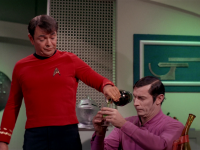
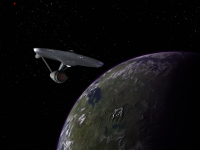
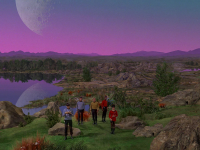
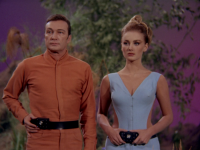
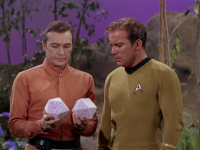
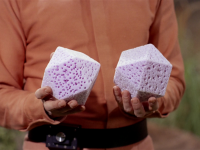
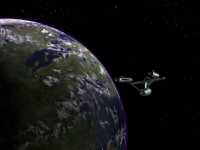
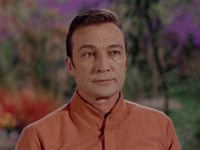
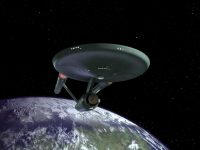
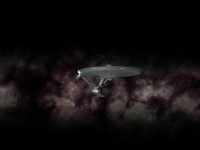
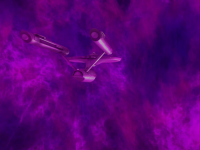
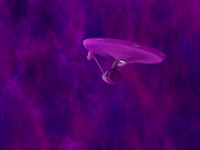
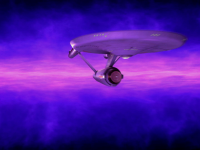
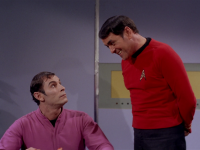
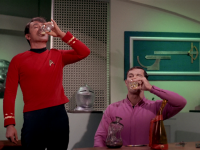
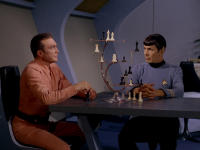
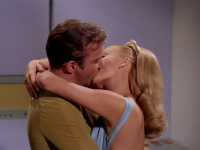
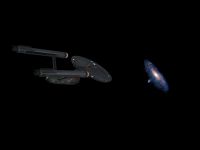
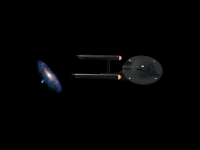
Star Trek TOS - 2x22 - By Any Other Name
Originally Aired: 1968-2-23
Synopsis:
Extra-galactic beings commandeer the Enterprise in an attempt to return home. [Blu-ray] [DVD]
Filler Quotient:
2, filler, but an enjoyable episode nevertheless. You can skip this one, but you'd miss out on some fun.
- There's no essential plot or exposition in this episode that renders it unskippable, but it's definitely a great story nevertheless.
Problems
None
Factoids
- This episode establishes that there are hundreds of uninhabited presumably M class planets which are presumably within the Federation's borders during this time period.
- This episode establishes that due to an unspecified cause, high radiation will make life in the Andromeda galaxy impossible in ten millennia. Although it is not specified whether or not this radiation is only deadly to Kelvans.
- This episode establishes that the mysterious energy barrier at the edge of the galaxy prohibits communication with other galaxies.
Remarkable Scenes
- The aliens thanking Kirk for responding to their distress call and then immediately demanding that Kirk surrender his vessel to them.
- Yeoman Thompson getting killed by the belt weapon.
- Kirk: "Immense beings with 100 tentacles would have difficulty with the turbolift."
- Spock trancing himself into being sick suddenly and all too authentically.
- Spock and Scotty proposing self destructing the ship to stop the Kelvans.
- Rojan announcing that he will execute Kirk's entire crew shortly after they traversed the barrier.
- Scotty's drinking scenes with the Kelvan.
- Spock defeating a Kelvan at chess.
- Scotty: "It's uh... it's green!"
- Spock: "Rojan, you are only a link in a chain following an order given 300 years ago. This is an opportunity for you to establish a destiny of your own."
My Review
Romeo and Juliet, Act II, Scene 2 sports the following iconic line: "What's in a name? That which we call a rose by any other name would smell as sweet." The episode's namesake Shakespeare reference is a metaphor for the fact that while the Kelvans may continue to call themselves Kelvan, they've chosen to take human form and in so doing they are inevitably forced into the totality of the human experience. They begin taking on all characteristics of humanity, including those that they did not expect to adopt, like love, jealousy, and ultimately compassion.
The metaphor is a bit forced and backward given that it is usually meant to convey the idea that language can change our perception of things, but perception is subjective and all things have some objective characteristics which cannot be altered by language. Given that, one would expect the metaphor to work in reverse on the Kelvans and produce the opposite effect on the story. A more traditional interpretation of the metaphor would have left the Kelvans incapable of experiencing what it is to be human because even though they've taken on the appearance of humanity, they cannot fundamentally change who and what they are.
But setting aside literary quibbling for a moment, this is still a terrific story with well conceived science fiction elements. Due to some kind of increasing galactic radiation in the Andromeda galaxy, the Kelvans who are native to the area are preparing to flee their home due to its impending uninhabitability. The next closest galaxy is the Milky Way and they intend to conquer it by force. This is perhaps one of the most epic premises upon which an episode of Star Trek has been built so far and the plot fully explores all the implications of such a grandiose premise.
I can't say I'm happy to see the return of giant energy barrier at the edge of the galaxy which was originally featured in Where No Man Has Gone Before, but at the same time I suppose I'd have been more annoyed if it were conspicuously missing from the episode, as that would have simply been a continuity error. The writing of this episode responsibly deals with its canonical existence and even uses it quite cleverly as a plot device while tactfully not dwelling on the reason for its existence or exploring how it came to be. I'd still like to see an episode dealing with why it's there at some point, but the crisis situation in this episode simply precluded that.
Speaking of long standing issues with the realism of the science fiction on Star Trek, this episode gives us new exposition which either clarifies or complicates the problem concerning why so many aliens in the Milky Way look like humans. It's explicitly stated in this episode that chances are very much against the idea of another alien race evolving to look like humans in the Andromeda galaxy. This implies that there is an extraordinary reason for why so many aliens look like humans in the Milky Way, such as the common genetic heritage hypothesis I outlined in my review of Return to Tomorrow.
Moving onto the actual story, there's a great deal of dramatic detail to praise. For one, while I'm not one to comment much on TV trends regarding gender and racial issues, I was pleasantly surprised to see that given the choice to execute a white girl or a black man, the plot bucked the typical trend by choosing to off the white girl. I also quite enjoyed Kirk's line to Rojan claiming that the Federation has handled foreign invaders before. That threat felt more like posturing than substance; a nice piece of subtle acting from William Shatner.
Perhaps the best dramatic moment of the episode is when Kirk struggles with whether or not to self destruct the ship, ultimately choking on the decision; being unable to go through with it. In my view what we see here is a rare moment of weakness in Kirk. In that moment he had an opportunity to sacrifice his ship to protect the entire galaxy from a formidable threat, but something prevented him from being able to give the order. My suspicion is somewhere in the back of his mind he remained confident that he could thwart the Kelvan threat without destroying himself in the process. This confidence may well have been hubris, or perhaps in that moment Kirk simply feared death and couldn't bring himself to give an order that would take his life and the lives of everyone under his command.
However Kirk arrived at his decision, it ended up being the right course of action. Amusingly, the Kelvans had detected Spock's and Scotty's subterfuge and could have prevented the self destruct if necessary, so all of Kirk's fretting was for nothing. But that removes none of the suspense from the moment, since there's no way Kirk could have known that at the time. After the ship cleared the Milky Way, Kirk seemed to waste no time finding the most beautiful woman in the episode to seduce, as usual. Meanwhile, Scotty's quest to drink a Kelvan under the table provided perhaps the most entertaining scenes of the episode.
Ultimately the resolution of the story was both a piece of clever writing exploring the idea that the Kelvans could be exploited by their newfound humanity as well as true to the spirit of Star Trek in that Kirk refused to abandon his peace proposal throughout the perilous conquest of the Enterprise. The story ends on a note indicating that automated vessels will be sent to the Kelvan homeworld to propose Kirk's peaceful solution, but I have my doubts about that plan's potential for success, even with an endorsement from real, live Kelvans since it is well established that these Kelvans arrived on a generational ship, disconnected completely from a home they never knew.
All in all, this episode has sequel written all over it. I'd love to see a future Star Trek production tackle the return of the Kelvans some time later after having received the message, still bent on conquest. Since few episodes of Star Trek leave me wanting to see more of the aliens of the week, I'd say this episode has earned itself a well deserved place in the above average episodes club.
The following are comments submitted by my readers.
- From Orion Pimpdaddy on 2010-07-07 at 4:08am:
I completely disagree with the scores people are giving for this episode. This is one of the best episodes of the original series. Why? Well, I'll try to prove my point:
-The villian, Rojan, is a very effective opponent for Kirk. Almost as good as Khan. He's cunning and calm, until he starts having feeling of jealously. He's vicious as well, having crumbled one of the redshirts in his hand.
-The crew is completely defeated and faces a perilous situation. In one of the most tense moments, Kirk was about to blow up the ship to stop the Kelvins. The usual sci-fi gimmicks to resolve the situation are thrown out the window at that point, so they have to resolve the situation without the use of technology.
-The takeover by Kirk, Scotty, Bones, and Spock is skillfully done. Each using their own personality to overwhelm the adversary.
-The description of the Kelvans by Spock adds much needed depth, and eliminates the "alien of the week" problem. - From Alan Feldman on 2012-12-20 at 4:06am:
"By Any Other Name"
Great episode, in spite of all its problems.
What's with the energy barrier? What is its origin? I'm with Kethinov on this. And why in blazes can't they just go "over" or "under" it? OK, maybe the barrier envelops the entire galaxy somehow. Nope! Rojan says it's at the rim of our galaxy. Just another absurdity to add to the list.
More "remarkable scenes":
The two that center on the following lines:
KELINDA: Oh. You are trying to seduce me.
KELINDA: Yes. I was wondering: Would you please apologize to me again?
It's pretty amazing seeing our heroes sitting at the table so badly defeated. The hopelessness, despair, anger, and near total resignation about their fate. But then they come up with their brilliant plan for defeating the Kelvans and carry out that plan brilliantly, making this a really fun episode.
But . . .
I really don't think you can have a moon that big so close to the planet. You'd have some serious tidal forces, for one thing.
Converting from 100-limb creatures to humans -- that's quite a feat! And how did they find out so much about humans and the Enterprise and such? And they turned themselves into "textbook humans". And they have the paralysis device. And they can transport themselves around at will with it. And shrink people into polyhedral shapes. Yeah, they're far superior and all that. Yet the energy barrier destroyed their ship. But it's worth going with all this just so that we can have this fun story.
Kelinda's mind, despite now being only "human", can nevertheless propel Spock across the cave. But barely 10 seconds later Kirk grabs her, administers a gentle karate chop to the shoulder, and down she goes.
How can five Kelvans control the entire Federation? Rojan just plainly states it and somehow that's enough. And even if they can, what about the Organians, Klingons, Romulans, Talosians, Metrons, Tholians, Trelane's parents, etc.? Can they control them, too? OK, drop the Tholians.
The Kelvans modify the engines so the ship can go at warp 11. But the ship cannot go that fast in later episodes.
Good luck surviving on just vitamin pills! Really. They're "textbook humans", after all.
Rojan was calm, cool, cold, cruel, plain, straightforward. Well done.
Watching Spock subtly noodge Rojan into jealousy combined with Captain Kirk's fun efforts to push him into a full blown jealous rage was great! I also enjoyed, of course, Scotty drinking Tomar under the table.
Speaking of which, when do enemies like these simply sit down and play a casual game of chess and engage in friendly conversation?
Why did Hanar permit McCoy to give him the shots? And it seemed like a kind of random, out-of-the-blue moment when Hanar confronted Rojan on the bridge. Sort of pointless -- kind of its own self-contained subplot -- but needed somehow. I suppose they had to give Bones _something_ to do.
When Drea neutralized three of the crew on the bridge, one of them was holding one of those Etch A Sketch clipboard things. Actually, I guess its screen is more like a wrinkled version of the gray thing from the same era that you can write on with a stick pencil and erase by pulling up the clear plastic sheet, or something like that. Whatever it is, it didn't make any sound as it hit the floor.
So we have three male and two female Kelvans. And they were going to reproduce for their multi-generational trip back to Andromeda. So that would have been three men sharing two women -- or two women sharing three men. Either way you put it, it doesn't sound like a good idea to me! Maybe Tomar is gay.
Definitely a fun episode. - From Alan Feldman on 2013-12-21 at 4:34am:
More on "BY ANY OTHER NAME"
Man, it didn't take long for the Kelvans to explore our galaxy! They were lucky just to get to that planet in a "life craft". And, while stranded on that planet, with only their life craft, they somehow managed to quickly find out all they need to take over the not just the _Enterprise_, but entire galaxy, to boot! How in blazes did they do that?
More about the energy barrier: Hey, we know there's "dark matter" and "dark energy" in the universe, but we don't have much of a clue as to what they even _are_. If there really were an energy barrier at the rim of our galaxy, we might not know much about it, either. But we presently have no indication that there is such a thing. But assuming it's there, as I said in my last comment, why can't you just go over or under it?
They should send the robot ship just outside the barrier, communicate with the Kelvans in the Andromeda Galaxy from there. Then it can shuttle back inside our galaxy and relay the response to us, and so forth. That should save a lot of time!
Again, this is definitely a fun episode.
AEF, a.k.a. betaneptune - From Scott Hearon on 2014-04-10 at 7:24pm:
This has been one of my absolute favorite episodes, so far. And for some unexpected reasons.
The science-fiction aspects of this story are excellent. The Kelvans are a very interesting race, and the way they are revealed through Spock's thwarted mind-meld was an excellent device. The Kelvans almost conjure up images of Lovecraft's "Great Old Ones," which is terrifying.
The threat that the aliens pose is about as severe as any I've seen in earlier episodes. The sense of powerlessness among the command and crew of the Enterprise is palpable, and the cold-blooded execution of the female red-shirt drives the point home.
The element that I surprisingly enjoyed in this one is the humor. I really haven't been a fan of the humor in Star Trek, since it's almost always exceptionally cheesy and campy. For some reason, though, I thought the gags in this one were great. Scotty out-drinking that ogre of a Kelvan and Spock coolly stoking Rojan's jealousy were comic gold.
One of the best all-around tales of the series, no doubt. - From Chris on 2018-03-20 at 6:45pm:
Loved this episode!
Emotionally swings from horror, sadness, and despair, to hilarity and ultimately triumph!
Now, on to my nits! ;-)
These are shapeshifters who apparently will retain the form they've assumed after several weeks. There was a little contradiction to this in the beginning though when Rojan was talking to Henar about returning home. At least it sounded like that to me. Perhaps they were unaware of this quirk?
The question about the barrier at the rim of the Milky Way always struck as odd. If light can pass through the rim, then so should things that move FTL... at least that's MY science!!! ;-)
I found it weird that the Kelvins felt the need to construct such a kick-ass and overly complex jail cell when they could have simply frozen the crew until needed.
There are other obvious nits, but they've been addressed in the other reviews and comments.
One quote that sort of started all the hilarity for me was McCoy: "If he keeps on reacting like that, he's gonna need a diet..."
He seems to get a lot of good one-liners! "He might take up knitting, but nothing more serious than that!" Ha!!! Gold, man!
Awesome episode!!!
On another note... Mr. Feldman's comment got me to thinking about Dark Matter and Energy.
Perhaps Dark Matter is purely made up of 'Gravitons' which hold galaxies together, and Dark Energy is made up of 'Anti-Gravitons' which pushes most galaxies apart! I realize that no one has ever observed 'Gravitons' before but to me, this explains a lot. Perhaps they really exert a very strong force, but are so few and far between, their net exertion is very little... and are thus VERY hard to detect? Kind of like lasers... not much effect until one is pointed at your light receivers!
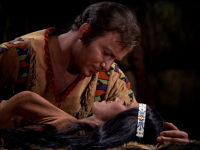
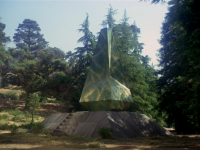
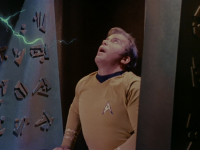
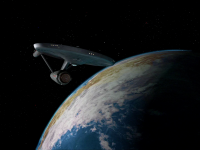
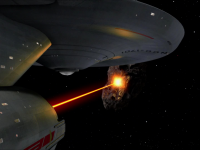
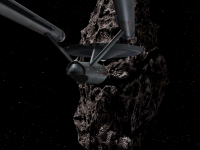
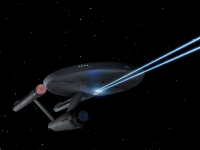
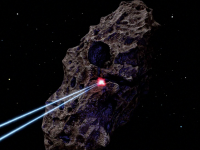
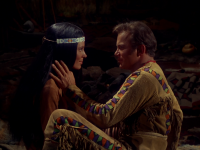
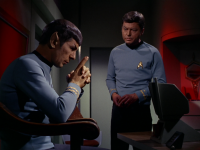
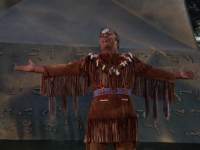
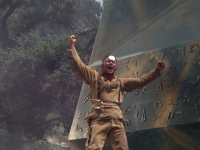
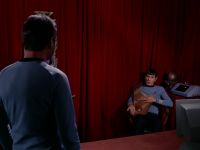
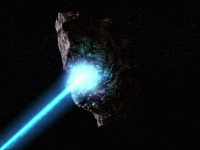
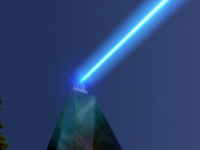
Star Trek TOS - 3x03 - The Paradise Syndrome
Originally Aired: 1968-10-4
Synopsis:
Kirk loses his memory and begins a life in a native village. [Blu-ray] [DVD]
Filler Quotient:
2, filler, but an enjoyable episode nevertheless. You can skip this one, but you'd miss out on some fun.
- There's no essential plot or exposition in this episode that renders it unskippable, but it's a decent episode, even though it could have been better.
Problems
- It's mentioned that the asteroid deflector stops the wind and thunder in order to save the tribe. But why would there be wind and thunder in the first place? It's an asteroid impact, not a thunderstorm.
- This episode incorrectly refers to the Vulcan mind meld as a "Vulcan mind fusion."
Factoids
- This episode establishes that sustained flight at warp 9 is very straining for the Enterprise's engines.
Remarkable Scenes
- Spock's rather elementary school explanation of asteroid deflection to McCoy.
- Kirk giving the drowning boy CPR and then being revered as a god for saving him.
- Spock attempting to destroy the asteroid.
- Scotty bemoaning about Spock's heavy demands on the ship's systems.
- Spock continually ignoring McCoy's advice weeks later.
- Spock deciphering the symbols on the alien monument.
- Spock's mind meld with Kirk.
- The death of Kirk's wife.
My Review
The Paradise Syndrome tackles basically the same "captain burnout" issue as Shore Leave except it attempts to do so dramatically rather than comically. The drama is effective, but the episode overall doesn't work as well as its funnier predecessor for a few key reasons.
The most annoying gaffe in the story is pretty much anything that comes out of McCoy's mouth up until close to the end. In the beginning he fails to understand the most elementary concepts about their asteroid deflection mission and Spock is forced to take considerable time in the middle of a crisis situation to explain these basics to him. Then McCoy has the audacity to complain to Spock about failing to destroy the asteroid, putting the ship at risk, and leaving Kirk on the planet despite the fact that 1. McCoy creating delays only made their problems worse and 2. Spock's decision to immediately attempt deflection of the asteroid was the right move. If McCoy had been paying attention he'd know that. Luckily, McCoy swallows his pride and admits that he was wrong late in the episode, but after all that the apology feels somewhat hollow.
Unfortunately as annoying as McCoy was, he was partially right about one thing: why didn't they keep looking for Kirk? Granted McCoy wanted the whole ship to stay and search for Kirk, but there is a middle ground between McCoy's position on the issue and Spock's: they could have simply left a search team on the planet, then immediately warped out of orbit to deflect the asteroid while the search team searched for Kirk. Perhaps Starfleet regulations prohibit such a course of action, or perhaps there was not sufficient time to properly equip a search team, but someone should have mentioned this.
Another point of vagueness was how Spock cracked the language of the obelisk to begin with. The eureka moment is when Spock claims the language is more music than language, but that doesn't really explain anything at all. Musical notation is a form of written language like any other, so since he couldn't know which symbols corresponded to which musical notes, the problem is analogous to not knowing which letters in an alphabet correspond to which phonetic sounds. Thus, I have a hard time believing Spock could have cracked any of that language based solely on what exposition is in the plot. I suppose some universal translator magic could have done most of the work for him once Spock simply asked the computer to translate it as music rather than language, but that seems like a stretch.
And then there's the almost-but-not-quite Hodgkin's Law moment in the teaser. After all the Earth-like planets we've seen by this point it's vaguely ridiculous for the characters to be spouting lines about how incredibly improbable it is for the planet of the week to have flora so closely mirroring Earth's. I groaned when McCoy saw the natives and referred to them as "American Indians" and Spock replied that they were, without wondering even for a moment how Native Americans could have ended up on some random planet far from Earth. As the episode progresses it does offer us a coherent explanation though: the aliens are actually humans descended from Native Americans. They were brought here by an alien race called "The Preservers" ostensibly to save them from extinction.
As McCoy points out, the historical existence of The Preservers goes a long way towards explaining why there are so many human-like races throughout the galaxy. In that sense, this episode joins Return to Tomorrow in rationalizing that unlikely fact of the Star Trek universe. Perhaps many ancient races have seeded humanoids throughout the galaxy. The Preservers went the extra mile though, furnishing our Native American friends with an asteroid deflector! Handy. I was amused that they integrated the technology into their religious superstitions and I enjoyed how Kirk's foggy recollection of his society's technology made him seem godlike to them.
However, there is something of a dark side to that story point as well, as the episode at times verges on racist stereotyping. For starters, the Native Americans are referred to as American Indians and their entire society is portrayed mostly as noble savages while the plot goes out of its way to make Kirk, the white character, seem superior with numerous scenes depicting how the natives are amazed by such simple things as Kirk's improvised lamp or even the construction of his uniform. Even with amnesia Kirk is regarded as godlike for his superior abilities and when the tribe realizes Kirk is not a god, they react violently and irrationally, even killing one of their own. I don't know if the writers meant it to come across this way, but the sheer number of questionably stereotypical details is hard to miss.
That said, sometimes stereotypes can be amusing and the one I'm most fond of is Kirk's machismo womanizing. This time he even got the girl of the week pregnant! Way to slip one past the goalie, Kirk! Indeed, like the pregnancy, the episode has a lot of highly original details. Kirk's amnesia, the asteroid deflection mission, the sheer amount of time covered by the plot, and even the episode's score (for once) were all refreshingly original. Overall if you can withstand the racial stereotypes and McCoy's borderline incompetence, the episode is a fun and refreshing change of pace.
The following are comments submitted by my readers.
- From rpeh on 2010-07-14 at 8:59pm:
"Beam us up, Mr. Scott", said by Spock is the closest to "Beam me up, Scottie" to which Trek ever comes. - From jeffenator98 on 2013-05-17 at 7:49pm:
God awful. 2/10 - From Scott Hearon on 2014-04-11 at 10:54am:
I gave this one a 5/10. There were some interesting elements to the plot, but far too many nuisances.
As Kethinov points out, McCoy was made out to be an utter moron. This is one of several episodes I've seen where the screenwriter clearly just wanted an excuse to have McCoy argue with Spock, even at the expense of McCoy's intelligence. They took it absurdly far in this one.
I had EXACTLY the same thought about the musical notation. I don't care how intelligent Spock is - without some sort of baseline "key" or Rosetta Stone, there is absolutely no way that he could have discerned what kind of language he was looking at.
Also, how exactly did the natives know that their "machine" had stopped working? And their violent stoning of "Kurok" and his woman was a laughably odd change in attitude.
The general plot was, however, a decent one. Having Kirk become amnesiac and go native was interesting, even if the native culture wasn't exactly very novel. And I do like the span of time that's covered, as it gives the story arc time to settle in and for major changes to occur organically within a single episode.
At this point, I think that Scotty has become my favorite character, along with Spock. - From jd_juggler on 2015-03-28 at 2:35pm:
Pretty amazing coincidence that the "password" to open the obelisk just happened to be "Kirk to Enterprise". And what possible purpose could there have been for the builders of the obelisk to have included that "amnesia" button that could be triggered by an unwary occupant? Lastly, about the enterprise: an asteroid hurtling through space is not going to be traveling anywhere near the speed of light. The enterprise crew must have screwed up pretty badly to reduce the engines to such a state that it couldn't travel faster than an asteroid for several weeks. And why couldn't Scotty restore the warp drive engines in all that time? He's never failed to do before or since, and there were LOTS of episodes in which the engines were burnt out. For that matter, how DID he repair the warp drive after finally returning to the planet and rescuing Kirk? Oh, and what a coincidence that the enterprise could travel EXACTLY as fast as the asteroid, without gaining or losing ground, over several weeks. - From McCoy on 2016-11-13 at 5:28pm:
Horrible episode. For me it was one of the worst TOS stories ever. And more about McCoy's incompetence - why he didn't save the girl's life? Remember the movie - his pills made new kidney grow! And here he just gave up and did nothing. I woud expect more of future medicine...
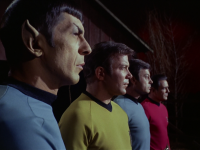
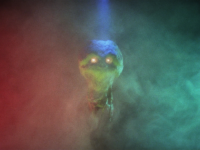
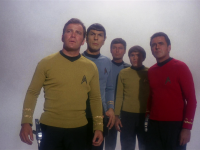
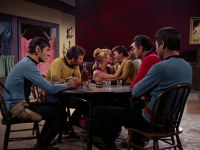
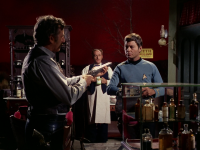
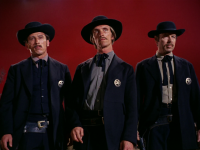

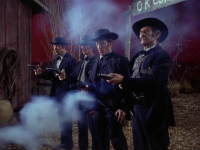
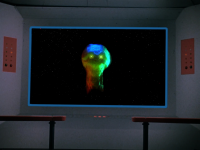
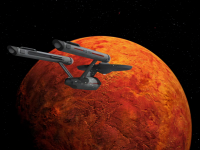
Star Trek TOS - 3x06 - Spectre of the Gun
Originally Aired: 1968-10-25
Synopsis:
As punishment for trespassing, Kirk and crew are forced to re-enact the shootout at the OK Corral. [Blu-ray] [DVD]
Filler Quotient:
2, filler, but an enjoyable episode nevertheless. You can skip this one, but you'd miss out on some fun.
- There's no essential plot or exposition in this episode that renders it unskippable, but it's a decent episode, even though it could have been better.
Problems
- When Chekov is with Sylvia and she proposes marriage, there are several shots that cut between a left angle and a right angle of the two sitting on the bench. Whenever it's from the left angle, her arm is around his. Whenever it's from the right angle, her arm isn't around his. It goes back and forth like this a few times.
Factoids
- DeForest Kelley, who plays Dr. McCoy, has a history of portraying the Wild West characters from this historical event, as he has also played Ike Clanton in a 1955 episode of You Are There as well as Morgan Earp in the 1957 film Gunfight at the OK Corral.
Remarkable Scenes
- The probe warning the Enterprise to leave in the native languages of every crewmember.
- Chekov diving into his role.
- Kirk trying to tell the bartender who he really is.
- Kirk trying to tell his enemies who he really is.
- Kirk and his crew trying to leave the city.
- McCoy meeting Doc Holliday.
- Chekov's "death."
- Spock mentally preparing Kirk, McCoy, and Scotty for the battle.
- The crew standing there while the bullets do nothing.
- Kirk regarding Chekov: "Perhaps that explains why he's here. Nothing was real to him except the girl!"
My Review
The Enterprise encounters a xenophobic race, brazenly ignores their warnings to go away, and faces the consequences they rightly deserved. Kirk's decision to arrogantly ignore the aliens' wish to be left alone was bad enough, but setting foot on their frigging planet on top of that was downright unforgivable. Though without Kirk's brazen act of trespassing, this wouldn't have been much of an episode, now would it?
That said, this episode is the first to explore the power of illusions in a sufficiently novel way since The Cage and does so just as masterfully, if not better. Unlike The Cage, the landing party is well aware that they're inside an illusion right from the beginning, so the focus is instead on figuring out how deep the illusion goes. The delightfully incomplete nature of the sets reflect this conundrum in a strikingly visual way, as the illusionary town of Tombstone is comprised of fragments of buildings missing most walls, exposed to an eerily alien red sky. I suppose it's pretty obvious that this stylization was a budget saving move, but I'd say it's a well earned one, as it added a surrealist quality to the drama which enhanced the discomfort and out of place feeling that the characters struggled with.
The most striking detail of the story is Spock training the landing party to disbelieve the illusion, thus robbing it of its power. This nice piece of writing manages to be both the episode's most dramatic story point when it climaxes in the gunfight scene as well as the episode's funniest story point when we discover at the end that Chekov hadn't in fact died because he never took the whole situation seriously to begin with. The constant sense of dread the rest of the landing party experiences as the episode builds to its climax was overall well played; I enjoyed seeing them try so many different things to avert their fate with each attempt failing in rapid succession as the clock ticked closer and closer to five o'clock.
Unfortunately for the plot, however, the gunfight at the real OK Corral didn't actually occur at five o'clock. It took place near the hour of three o'clock instead. There were other historical inaccuracies as well. For instance, the gunfight is depicted as taking place just outside the OK Corral, but in reality it took place some good distance away near Fly's Photographic Studio. Also a sign visible in this episode at one point noted Wyatt Earp as the marshal of Tombstone. However it was actually his older brother Virgil instead in reality. Wyatt was only a deputy marshal. Finally Kirk during one part of the episode made a big point about how Billy Claiborne (the character Chekov played) was the only one of their crew to survive the gunfight, but apparently Kirk had forgotten that his own character, Ike Clanton, also survived.
I suppose all of those historical inaccuracies could be chalked up quite easily to the aliens having created the scenario from Kirk's inaccurate recollection of history, but unfortunately nobody else seemed aware of all of these errors either, even despite Spock's apparent expert knowledge of the period. Not all of the errors in the plot logic are confined to historical inaccuracies though. Another notably odd detail was the whole subplot when the landing party refused to trust their illusionary guns so they resorted to trusting the other illusionary resources at their disposal instead, which is a striking error in reasoning because if you can't trust the illusionary guns, why would you think you could trust anything else in that illusionary world?
I was also a bit put off by the scenes when the landing party all mourned Chekov's death. There's a ticking time bomb about to go off in their faces and they're all more interested in talking about their feelings for an extended period of time? How silly. Spock had every reason to be annoyed with them all. A final odd detail of the plot was that curious scene when the alien message is noted as having been broadcasted in the native languages of everyone on the ship. It's implied that the alien telepathy enabled that. However, what I find curious is the fact that the crew could tell the difference between an alien speaking in an alien language with the universal translator translating it as opposed an alien speaking the native language of various crew members. This implies that however the UT works, it isn't entirely seamless. Whenever it's translating an alien language on the fly for you, you can tell when it's working its magic and when it's not.
As for the ending, I felt that it was weaker than The Cage's. In The Cage, the aliens learn something. In this episode, the aliens are just engaging in some bizarre test of the Enterprise's resolve and the plot grants little insight into their motives. By the end of the story a magic switch is flipped and they suddenly go from being xenophobic to welcoming a Federation delegation simply because the landing party saw through the illusionary danger they created. But even though the aliens of this episode were less well conceived than those of The Cage, this episode managed to be a bit more entertaining simply due to all the fun aesthetics and psychological tricks noted above. As such, I would declare this episode the superior story of the two, by a hair.
The following are comments submitted by my readers.
- From Orion on 2011-04-01 at 2:06am:
I'm always tempted to skip this one because I can't stand westerns, but this episode goes beyond the standard "put crew in earthlike situation." It stays focused on one thing, the upcoming moment of dread for Kirk and the landing crew. They try so many things to avert their fate, but all of them fail, say one. Kind've gripping for a third season TOS episode. - From Blob on 2012-03-25 at 12:02pm:
I thought the aliens were suddenly friendly at the end because Kirk refrained from killing his adversaries at OK Carrol. This showed them that human beings are decent.
I liked the alien's design btw. It was eerie and effective. - From Andrew Wiltz on 2012-04-06 at 10:27am:
Another problem with this episode:
In the 1880s reality they were forced into, the cause and effect ties directly into the belief of the victim (Checkov dying because he "believed" the bullet was real, and the rest of them not dying because they "believed" the bullets were unreal)
However, when Scotty tests the tranquilizer on himself, he believed it would work - but it did not. Is this not a contradiction? - From Alan Feldman on 2013-04-05 at 1:59am:
"Spectre of the Gun"
Spock says, "History cannot be changed." Say what? As ridiculous as it sounds, history _was_ changed in all their time travel episodes (albeit "restored" in the end). And there weren't buildings with missing walls and our heroes "playing" the Clantons in Star Trek uniforms in Tombstone AZ, and so on. Strikes me as somehow different.
I think it's awesome when Kirk fails miserably to convince various townsfolk that they are not the Clantons.
Chekov "died" because he believed the bullet was real? Please, that's just plain ridiculous.
Kirk says he can't just kill or murder the Earps and Doc Holliday, but in other episodes he killed "humanoids" in self-defense, which is what this would have been.
At the end of the episode when the Earps and Doc Holliday are walking toward our heroes in the corral, they keep appearing in a different order; it changes with every shot!
Notice that the bullet holes behind our heroes aren't really in line with them and the Earps. Well, that's how it looks to me.
AEF, aka betaneptune
- From Scott Hearon on 2014-04-11 at 6:27pm:
Eh. I gave it a 5/10.
This episode, though not having any massive problems, is rife with little ones. Like Kethinov points out, the crew's belligerence about forcing themselves on the aliens is out of character and rather contrary to the spirit of Star Trek. "No" means "no", boys.
The idea of using a Western setting seems little hokey and odd (further justifying my semi-serious theory that many Star Trek episodes' plots were dictated by whatever set pieces were laying around the film studios that day. "Hey! There's a bunch of cowboy stuff left over from yesterday's episode of 'Bonanza'! Let's use that!!").
The exploration of reality is interesting enough, but they seemed to drag out the resolution to a length that defies some logic. The crew, Spock included, very quickly recognized the aliens as "pure telepaths." As such, it seems that at least Spock would have figured out that the things they were seeing and experiencing were illusory. It probably shouldn't have taken Chekhov's "death" and the failure of the gas grenades for him to figure it out.
The recognition of McCoy that humans will always have doubts about reality was a very intelligent touch, and having Spock use the mind meld to assist them was intriguing.
Decent episode, but not one of the better ones I've seen. - From Chris on 2018-03-23 at 6:01pm:
I really like this episode though of course, it has its problems!
Your first paragraph pretty much describes EVERY episode of just about EVERY TV show ever put on the air!
Everything is contrived to make something interesting, and it's not any different than Hitchcock's 'Dial 'M' for Murder' where the protagonist states that every crime book is written so contrived that the hero has to solve things the way they unfold!
My nits with this episode are mostly regarding the Melkot's interpretation of what they see in Kirk's thought record from which they derived the scenario. The town, to me, looked exactly like how one might dream a place, and so I was amazed at how good that was done!
On the other hand, why is 'history' so carved in stone? Especially in Spock's mind?!?
They are getting their 'history' from Kirk and no one else! He could've imagined fairies dancing around for all they knew!
Again, the show is contrived to play out how it did, and I really liked it!!! Nice guns, man!!!
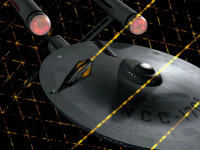
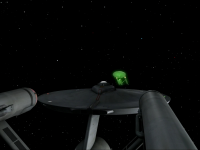

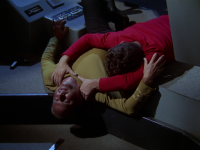
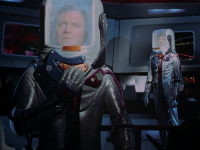
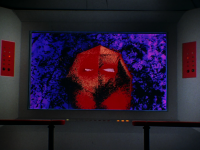
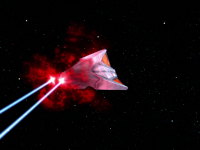
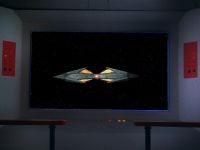
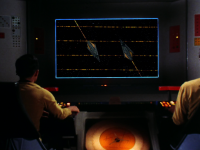
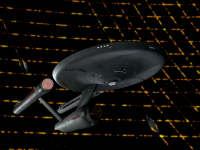
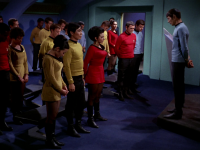
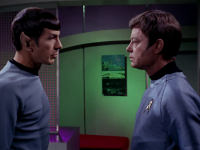
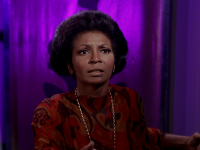
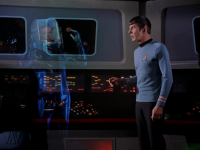
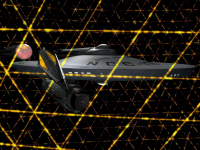
Star Trek TOS - 3x09 - The Tholian Web
Originally Aired: 1968-11-15
Synopsis:
Kirk is trapped in interphase, while the Enterprise is trapped by a powerful energy web. [Blu-ray] [DVD]
Filler Quotient:
1, partial filler, but has important continuity. I recommend against skipping this one.
- This episode (along with Mirror Mirror) is the core premise to Ent: In A Mirror, Darkly. The Tholians are also curiously referenced repeatedly in later Star Trek series.
Problems
None
Factoids
- This episode establishes that there has never been a mutiny on a starship before, or at least no record of one.
Remarkable Scenes
- Chekov freaking out.
- Spock's discussion with the Tholian.
- Spock battling both the Tholians and McCoy at the same time.
- Kirk's recording for Spock and McCoy.
- Uhura pleading with McCoy about having seen the captain and McCoy not really believing her.
- McCoy discovering the antidote.
- McCoy and Spock lying about having heard heard Kirk's last orders.
My Review
The Tholian Web is a cleverly written story which makes prominent use of an unusually large set of characters and multiple plot threads. While the Enterprise is engaging in an already dangerous rescue mission and investigating what befell the crew of the Defiant, an aggressive alien race called the Tholians attacks them for trespassing into what they claim is their territory. Interestingly, neither of these two events seem related to one another, which is a nice surprise. Whatever happened to the Defiant is clearly implied to be the result of a natural phenomenon. The intolerant Tholians are just an inconveniently timed distraction.
But while battling the Tholians Spock must also battle McCoy whose characteristic and predictably endless criticisms of Spock's command decisions rear their ugly head once again. Toward the end of their bickering McCoy crossed the line several times by claiming that Spock had no good reason to fight the Tholians and that Spock's only motive was to secure permanent command of the Enterprise from Starfleet. Luckily, Kirk's "last orders" recording brought some sanity back to their work relationship.
There are a few other unsavory details as well. For instance, early in the episode it's mentioned that while the crew can visually identify the Defiant, that sensors are reporting that it's not there. Once again like my complaint from Operation: Annihilate! do sensors just not measure visible light? What a silly line. Likewise, at one point McCoy uses a hypospray on Kirk through his space suit! Must be a powerful device. Finally, toward the end of the episode Uhura looks over to Chekov who is screaming like an idiot. She looks over to McCoy and asks him "will I become like Chekov?" No Uhura, you won't. Because your character is better acted!
The two biggest gaps in the story though are the fact that we never learn what exactly befell the Defiant and its crew as well as the murkiness surrounding how the Enterprise escaped the Tholian web. I was actually pretty damn annoyed with how they escaped the Tholian web. All that's said is using the ship's power somehow propelled them out of it. We see some brief visuals which might indicate they passed into the alternate dimension which claimed the Defiant, then suddenly the Enterprise is back in normal space, thrown clear of the Tholians. How convenient and vague.
All things considered though The Tholian Web was a terrific episode. The pacing was great, the judicious use of minor characters was a welcome surprise, the Tholians with their unique (if oddly slow) weapon made an intriguing enemy, and trapping Kirk off the ship during the crisis added heightened drama. I certainly wouldn't mind seeing the Tholians again or seeing a followup episode that tells the story of what happened to the Defiant. All in all with a bit more polish and attention to detail, this already terrific episode could have been worth even more points.
The following are comments submitted by my readers.
- From Arianwen on 2010-08-07 at 11:29pm:
I don't know, I find this episode very entertaining and good sci-fi. It seemed very original - no clichés that I noticed, and multiple plotlines. The idea of 'space distorting' and actually causing the psychosis that killed the Defiant's crew was interesting, and a welcome surprise (after innumerable episodes infested by mysterious diseases, finding a dead crew *not* killed by disease was quite a shock). The Defiant and the Captain being dragged into a parallel universe gave the plot added depth and complexity, not allowing the crew or us to focus on the one problem.
It would have been nice, though, to see a little more of the Tholians. They too felt original - they actually *listened* to Spock's explanation! - and it's a pity we never hear any more from them. But I mark it as a sign of a good episode that I was left with questions rather than complaints. - From Orion on 2011-09-05 at 2:50am:
This episode felt like too many people were involved with the script. There's too many things going on, and their combined mass ends up hurting the storytelling.
You got Tholians, but not much explanation about who they are
You got an energy web, but almost no talk about what it actually does
You got McCoy being belligerent toward Spock, with no real resolution to the conflict
You got crew member turning hostile
You got the captain floating around like a ghost
Instead of having so many plotlines, they should have saved some of them for another episode. The plot about Kirk floating around the ship should have had the most playtime since it was the most creepy, but instead it takes a backseat to all the other stuff. All in all, I think Tholian Web was a missed opportunity. - From Andrew Wiltz on 2012-04-08 at 3:15am:
In episode 2 of season 3 of TOS, "The Enterprise Incident," it is established that Vulcans cannot lie.
However, Spock rather blatantly lied directly to the captain in this episode. Spock is half human, so perhaps this rule (which may not even be a rule) doesn't apply to him. - From Rick on 2014-04-01 at 5:09am:
To the reviewer: yes of course the enterprise can measure visible light, its called the view screen (which is presumably fed by external cameras). I think when spock references "sensors" he is not including the view screen because obviously they are looking right at it. - From Kethinov on 2014-04-01 at 5:46am:
Rick, the point was it's pretty ridiculous to assume that the sensors can't measure visible light. - From jd_juggler on 2015-04-19 at 6:46am:
This is a typical low-budget third season episode. Not horrible, but well below average. Rather convenient, isn't it, that McCoy's hand passes through a man's body, and a table, but nobody's feet pass through the floor? Also, neither Uhura not Scotty mentioned that they could see through the captain, a rather important detail, I would think. It is also curious that Kirk's oxygen was running out - yet in TNG we learn that Scotty was trapped for decades in a "pattern buffer", apparently without needing oxygen at all. Also, just before Uhura saw the "ghost" captain, she was doubled over in pain - a symptom she appararently never discussed with the doctor. She seemed physically fine when she ran into McCoy in the hall, and aside from an apparent hallucination, she was nothing like checkov, the lab technician who attacked McCoy, and the crewman who flipped out in engineering, all of whom were completely out if their minds. So why was Uhura admitted to sick bay?
- From thaibites on 2015-07-30 at 7:03pm:
This episode fails for me because of Bones. His treatment of Spock is absolutely ludicrous. He's just over the top, and Spock should've beaten the living crap out of him. But that's the whole problem with Bones always needling Spock - he knows Spock won't kick his ass. Bones takes advantage of this because he is a bully and a gutless coward.
I grew up with TOS and remember not liking Bones' miserable, whining, bitch-boy attitude, and this episode makes me dislike him even more. Bones and Pulaski can both sod off! - From Rick on 2017-02-17 at 3:05am:
Kethinov: Yes, I get that. I just think when conversing on the bridge where time is of the essence, Spock need not tell Kirk that "every sensor other than the visible light which you can clearly see in the viewscreen cannot detect what is out there." I think we all understood what was going on.
Hate to say it, but I think you missed this one again. The crew of the Defiant fell prey to the same space sickness that the crew of the Enterprise began to experience. We dont know why they stayed in that space for so long for the effects to happen, but it is a safe bet that it was to investigate the strange dimensional phenomena. - From Chris on 2018-03-25 at 7:34pm:
I'm in complete agreement with thaibites on McCoy. Bones should've been thrown in the brig for insubordination. Then Kirk should've kicked his ass once he was saved...
Shatner gives another emotional speech similar though not as stirring as his in 'Return to Tomorrow'. I really liked the speech and one would expect that Bones would've followed his beloved hero's orders and obeyed Spock without question! Instead, he goes back to his whiny needling and should have been phasered into that other universe!!!
Other than my gripes about McCoy the episode is great! He really ruined it though and makes it hard to sit through...
- From Michael Plunkett on 2019-10-21 at 3:25am:
Spock lied to Kirk at end of episode????
Spock was not human enough to lie and to lie to the captain would be a violation of his personal moral code and Star Flight regulation.
How can Spock lie to Capitan Kirk????
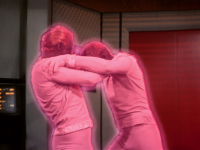
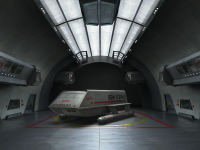
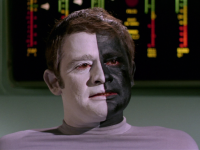
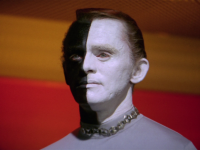
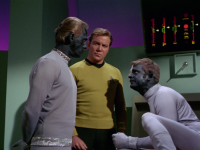
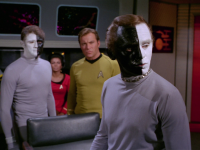
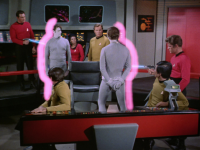
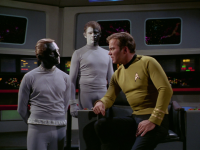
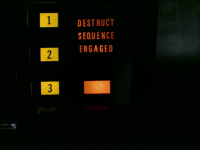
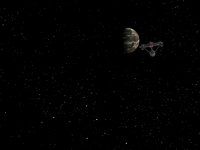
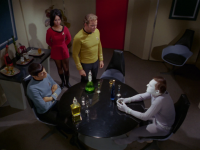
Star Trek TOS - 3x15 - Let That Be Your Last Battlefield
Originally Aired: 1969-1-10
Synopsis:
Two survivors of a devasted planet remain committed to destroying one another. [Blu-ray] [DVD]
Filler Quotient:
2, filler, but an enjoyable episode nevertheless. You can skip this one, but you'd miss out on some fun.
- There's no essential plot or exposition in this episode that renders it unskippable, but it's a decent episode, even though it could have been better.
Problems
- In the original airing of the episode they reused special effects from The Galileo Seven for the shuttlecraft shots. However in The Galileo Seven, the shuttlecraft bore markings which clearly indicated it as one of the Enterprise's shuttles. Reusing that shot would seem to suggest that the Galileo for some reason was now stationed at Starbase 4, with its registry having never been updated, which didn't make a lot of sense. However, in the remastered version of the episode, new visual effects were added replacing the original shot with a new shuttle named da Vinci with its registry number being SB4-0314/2, clearly indicating that it's a Starbase 4 shuttle.
Factoids
- Lokai and his people hail from what is described as the "southernmost" part of the galaxy. They seem to have extensive knowledge of the Federation which implies that the borders of the Federation and Lokai's planet are relatively close to one another. All this would seem to imply that the Federation occupies what has been arbitrarily designated the south of the Milky Way.
Remarkable Scenes
- Kirk's first conversation with Lokai. I love how blatantly hostile Kirk is.
- Kirk playing mediator.
- I love the scene where the auto destruct sequence was being set. Some interesting camera work there.
- Kirk: "Mr. Spock, is this ship headed for Ariannus?" Spock: "Negative, captain. The Enterprise is now moving in a circular course." Scotty: "And at warp 10 we're going nowhere mighty fast."
- Chekov: "There was persecution on Earth once. I remember reading about it in my history class."
- Seeing Cheron a dead planet.
- Spock: "All that matters to them is their hate." Uhura: "Do you suppose that's all they ever had, sir?" Kirk: "No. But that's all they have left."
My Review
This episode is an intriguingly stylized satire of racism; black vs. white racism of the real world in particular. The half-moon aliens do a nice job of demonstrating the innate silliness of racial prejudices by creating a racial difference between the aliens that seems so insignificant to us and yet so significant to them as to automatically shame us for ever having acted like them. That's the power of a science fiction story on society: the power of analogy. These aliens would have been a ridiculous analogy in a real world 19th or 20th century debate on race relations, but in the world of Star Trek where many more things are possible they're not so ridiculous after all.
Sure, the whole idea that such a skin pigmentation would ever be favored by natural selection seems patently ridiculous, but Spock wastes no time pointing that out early in the episode. As long as the story itself acknowledges how unlikely such a thing should be before brazenly going with it, I suppose I can live with it. The layers of absurdity are even nicely staggered. At first Spock assumes that Lokai must be one of a kind for his species. Then when the commissioner comes aboard, Spock is amazed and struck with near-disbelief that all their people must have evolved to be this way and it isn't just a fluke.
Likewise, Spock points out one of my favorite medical cliches to pick on: McCoy is once again using Federation drugs on an unknown alien. I loved McCoy's response insisting that most humanoid life forms have similar anatomy; the blood may be slightly different and the organ configuration may be slightly different, but medical principles are largely sound across species. I also loved the fact that McCoy conceded the fact that it's hard to give a prognosis on a totally unknown alien despite the anatomical similarities. This is the sort of careful scriptwriting that should have been present in earlier episodes.
As for the story itself, I enjoyed the details concerning extradition law, which made a lot of sense for the situation. The Federation's policy on trying Lokai for his domestic crime before considering extradition back to Cheron certainly seemed reasonable and I thought the off the record note that the Federation would most likely grant extradition after his trial in the Federation was a nice touch. It added some humanity to the usual faceless bureaucracy.
Sadly that nice detail was somewhat undermined by the fact that neither of the half-moon aliens seemed content to wait out Federation due process and mediation. They've been keeping chase for some 50,000 years and yet they acted with such impatience while aboard the Enterprise. If they've been at it that long, why not wait a short while longer to see the process through to the end legally?
At least the commissioner had the good sense to let Kirk complete his humanitarian mission before irrevocably commandeering the ship for a course to Cheron, but it all could have been done with considerably less fuss. Although the manufactured drama did give us an opportunity to explore that delightfully overwrought self destruct scene. The camera work in that scene was a lot of fun although not all of their directoral experiments were a success. We've also seen the unwelcome return of the camera zooming in and out on the red alert light, which is nauseating and serves no purpose.
You've got to wonder how Kirk even knew the commissioner wouldn't be able to stop the auto destruct sequence when he had already displayed what appeared to be limitless control over the ship's systems by that point. Maybe it was a desperate bluff. The half-moon aliens had some pretty vaguely overwrought technology at their disposal in general. Throughout the course of the episode they displayed immunity to phasers, apparent telepathic control over the ship's navigational systems, and somehow temporarily enhanced the warp drive to safely fly faster than its typical capabilities.
Although the Enterprise itself possessed some pretty overwrought capabilities as well. I cringed a bit when the Enterprise somehow globally decontaminated Ariannus entirely from orbit in the space of a minute or two. That's some powerful tech.
Other logical oddities of the story include the scene when Lokai gets up and walks out of sickbay without anyone noticing. Apparently no one was guarding the Federation's detained prisoner scheduled to be tried for grand theft shuttlecraft. Likewise, it's kind of ridiculous to assume that not a single survivor was left on Cheron. Even a total nuclear war would leave some survivors, huddling together far from the blast sites, living off of subsistence farming or something. Though given the overwrought technologies of the episode, perhaps they were all killed by some kind of super-effective biological weapon released into the atmosphere globally all at once like the Enterprise's Ariannus decontaminator.
One final amusement: you've gotta love the cost cutting tricks in this episode. An invisible ship saving them from needing a ship model, the destruction of Cheron which is actually just stock video from World War II, and the fact that we never actually see the half-moon aliens on the surface of Cheron ever. The Enterprise just cynically leaves orbit and dooms them to their mutual annihilation. I can't blame Kirk for doing that, honestly. They've been such poor guests, why bother saving them from their self-inflicted fate? Indeed it's an effective satire of racism. With more polish I have no doubt that this episode could have easily been worth a perfect or near perfect score.
The following are comments submitted by my readers.
- From Steve on 2009-04-17 at 2:29pm:
Best feature: a great performance by Frank Gorshin,an excellent actor and impressionist who was also the Riddler on the original Batman series. - From John bernhardt on 2010-01-08 at 9:33pm:
What made Original Star Trek episodes so entertaining was that most episodes even the weaker and average episodes had some memorable scenes, in this episode it is the dramatic auto destruct sequence - From rpeh on 2010-07-16 at 10:00pm:
One problem: the shuttle "reported stolen from Starbase 4 two weeks ago" has NCC 1701/7 (ie, the Galileo) on its side. Why would an Enterprise shuttle have been stolen from Starbase 4?
The camerawork focusing in on the eyes during the self-destruct sequence is the most obvious example of Gene Roddenberry's "western in space" view of the series. Remember the final duel in The Good, The Bad and The Ugly, released just a couple of years before? - From Chris on 2011-06-17 at 10:27pm:
Just saw this episode the other night. The enhanced version deletes the WWII footage. - From Kethinov on 2012-01-17 at 1:44am:
Chris, that's not correct. The footage is still there. Examine the chase scene intercut with the fire. - From sherry on 2012-02-26 at 7:21pm:
This one seems we can make a continuation of this show,,,,
I have been working on it a bit,,,,,
I call it the last Battlefield continuation
I started to make a doll I painted her black and pink,,, same color with her hair,,,, I've been doing this for a little while,,, pink and black boots ,,,, I sew her a uniform,,,, I also made a flag for the cheron,,,, and a flag,,, and even symbol,,,,, and I'm trying to make a language as well,,,,, this is a lot of work,,,, I'm trying to pretend they all went underground,,, and that there was only 30 of them while,,,,, I would say that's a pretty good start,,,,, I also have a main character,,, then I'm working on,,,,
if anybody's interested,,, go to space trek,,, this is where I'm leaving it,,,, they can contact me at ,,sherry63@telus.net,,, anybody's interested,,,,,
- From Orion Pimpdaddy on 2012-03-22 at 3:50am:
The episode inspires a lot of conversation, but it can't escape the black hole of mediocrity that is the third season. I started to realize this once I saw the lame sequence with the "invisible" ship. Sure, there's some substantial commentary about race relations, but at times it feels heavyhanded. I want to like this episode more than I actually do. - From warp factor 10,1 on 2012-08-14 at 10:50pm:
They must have freaked out every time they looked in a mirror.
I also wonder what would happen if they intermarried. I'm white and Mrs. Warp factor is black (actually I'm a sort of pink colour and my wife is dark brown), our son, Master Warp factor, has a skin colour somewhere between the two of us. What would hapen with them? Would the two halves, each black with white, produce an all over grey or would they have four vertical stripes? In a few generations they could end up looking like walking bar codes. The checkouts at Walmart would be thrown into total confusion. Alternatively perhaps they could end up like chess boards.
Despite all this foolishness, and it not being a brilliant episode, in many ways it is indicative of the way Star Trek was a force for good when it was made. - From jeffenator 98 on 2014-10-30 at 5:10pm:
This is one of the episodes when the Enterprise flew faster than warp 9. - From Wes on 2016-04-30 at 1:15am:
One to add to the "Problems" category:
Kirk says that Cheron is in the "south" part of the galaxy. What is South in space? - From Chris on 2018-08-08 at 3:27am:
None of this episode makes any sense! South part of the galaxy... All kinds of nonsense! I understand the point they're trying ot make, and it's actually pretty good!
But come'on man! Throw us a bone!
50,000yrs chasing some clown? I understrand if they threw in some E=MC2 stuff, but they didn't and of course, to an 11yr old it didn't matter!
You know? I'm pretty sure that to most adults in the day, it was meaningless as well!!!
It still bugs me how they threw around time like the did! The Fabrini, the 500+ year war on Anon... I dunno, it bugs the percentages... (where did I hear that?!? ;-)

Star Trek TOS - 3x23 - All Our Yesterdays
Originally Aired: 1969-3-14
Synopsis:
Kirk, Spock and McCoy enter a time portal and get stuck in the past on a planet about to be consumed by a nova. [Blu-ray] [DVD]
Problems
- Spock claims his home planet is millions of light years away. Uh, no? The galaxy isn't even that wide.
Factoids
- I like the small silver disks used for data storage. What? That's not remarkable you say? This episode was made many years before CDs, youngster. ;)
- Interesting names: Mr. Atoz, or "A-to-Z" for a librarian. And the Atavachron (the time travel machine) which means "forefather's time."
Remarkable Scenes
- Atoz: "A library serves no purpose unless someone is using it."
- Atoz in two places at once. Awesome.
- Kirk: "You're a very agile man, Mr. Atoz. Just how many of you are there?"
- Kirk's fencing fight.
- McCoy and Spock stuck in a frozen environment.
- Kirk accused of being a witch.
- Spock getting emotional.
- Spock falling in love with Zarabeth.
- Spock realizing he's losing his emotional control.
- Spock letting go of his woman.
- The sun going nova.
My Review
The last great original series episode before the show was prematurely canceled. Generally the original series' over use of time travel tended to suck, but this is one of nicest uses of it. Spock falls in love with a truly beautiful woman, having lost his emotional control. Spock and McCoy stuck in an ice age while Kirk is stuck in a dark age. It's nice to watch the two storylines unfold, and get a brief look at the people of this world at the same time. It would seem fitting that if a people's sun were to go nova, that some of the people would take refuge by living out their lives in the past. Interestingly, they could alter their own history to better prepare them for that eventual nova. Though this would create a time paradox. If every new altered generation kept going back in time to assist the previous ones, we'd have limitless time with which a society could evolve! Sheesh, time travel gives me a headache, and I seem to have gone off on a tangent. In any case, this is a truly enjoyable episode to watch. One of Spock's greatest moments.
The following are comments submitted by my readers.
- From rpeh on 2010-07-17 at 6:43pm:
Brilliant stuff, and good to see Spock getting the woman for once. The best exchange is with Spock and the Doctor at the end:
McCoy: But it did happen, Spock.
Spock: Yes it happened. But it was 5,000 years ago... and she is dead now. Dead, and buried long ago.
Really makes you feel for Spock.
The time paradox issue is obvious a pretty serious one, but it doesn't detract from a really good story. - From Q on 2010-11-30 at 7:55pm:
Wow! Genuine Star Trek stuff. Unlike many others TOS episodes this one can easily keep up with the standards that were later set by the successor series of the franchise. Timeless. My favorite. - From Strider on 2012-07-03 at 6:24pm:
After watching The Savage Curtain, which was just embarrassing, this episode was balm to my soul. Every character is at his best in this, and like the review says, this is a great and actually sensible use of a time travel setting.
I wanted Spock to have more time with Zarabeth. We knew that was a very significant relationship because we saw Spock justifying why he wasn't moving heaven and earth to find Kirk. The doctor standing up to Spock was excellent and powerful, and it was SO NICE not to have to watch Kirk with some woman again. And of course, Spock's struggle with his deeply written Vulcan nature was so vivid. Why is it we like to see him suffer so?
One of the best.
- From Scott Hearon on 2014-04-13 at 4:53pm:
I guess I'm in the minority on this comment board, as I only found this episode to be "OK," and gave it 5/10.
As with so many other episodes, this one has a very interesting idea that allows for some interesting situations for our main characters to deal with. And yet, there are too many unanswered (and possible unanswerable) questions:
Leaving aside the entire time travel story headaches (they always exist, even with the most carefully planned time travel story), I have to wonder why the "tyrant" referred to set up this entire system? Zarabeth explains that he needed to keep them alive, but it wasn't clear as to why. Setting up a time travel system just to imprison people seems insanely elaborate. (Maybe another poster can explain this to me - it's quite possible that I might have missed it.)
And of course, if this tyrant DID set up a time travel system, couldn't it be used in some way to influence the future? And whose future was it, anyway? These people were from another planet, and yet they seemed to be transported to the history of "our" Earth, including European inquisitions and duelists. Baffling.
The major strength of this story, though, was Spock's struggle with his regressing nature. Seeing him go through the pain of realizing that he is both becoming more savage and experiencing more primal love was touching and heart-rending at the same time. And it was good to see McCoy finally get called out for his tiresome, bigoted antagonism of Spock. If there's one Star Trek cliche that I got tired of very early in the series, it was this one. Even if Spock was acting irrationally, McCoy deserved to be choked out at least once before the series ended.
Some good. Some bad. Very much like most of the episodes I've watched.

Star Trek TOS - 3x24 - Turnabout Intruder
Originally Aired: 1969-6-3
Synopsis:
A woman from Kirk's past exchanges bodies with him and takes control of the ship. [Blu-ray] [DVD]
Problems
None
Factoids
- The 2260s seemed to be a period of sexism. See comments.
- Uhura is remarkably absent from this episode.
Remarkable Scenes
- Lester: "Your world of starship captains doesn't admit women."
- Kirk and Lester swapping bodies.
- Lester-as-Kirk: "Now you'll know the indignity of being a woman."
- Lester-as-Kirk: "Believe me, it's better to be dead than alone in the body of a woman."
- Kirk-as-Lester waking up and realizing who he is.
- Kirk-as-Lester trying to use his knowledge as the captain of the Enterprise to convince Spock that he is who he says he is.
- Spock Vulcan neck pinching the redshirt.
- Kirk and Lester arguing over who's who.
- Lester-as-Kirk freaking out.
- Lester losing Kirk's body.
My Review
A nice episode, even if an unsuitable end to the series. Granted, it's one of the most blatant displays of sexism in Star Trek I've ever seen. It makes canonical that the 2260s was a (most likely brief) period of sexism in the Star Trek universe. This is isn't necessarily impossible; societies can revert to earlier sentiments, although it is unlikely. Despite likelihood, it's a part of the Star Trek universe and we must accept this. Moving on, this is the first of many "personality swapped" episodes we'll see in Star Trek. This one does it well. Kirk and Lester play each other's parts very nicely, making this episode thrilling. Most fun to watch. The best part is how well Lester has planned her move against Kirk. Personally, if I were Kirk stuck in Lester's body, I'm not sure I would have taken it so well!
The following are comments submitted by my readers.
- From rhea on 2008-04-27 at 9:40pm:
... also watch the way especially Shatner acts trying to impersonate a woman (at one point he is sitting at his desk talking to Spock while doing his nails). Very campy, slightly sexist, but for once not too much over the top, which is an achievement for William Shatner. - From Strider on 2012-07-06 at 5:25am:
I don't think it's necessarily true that the "no women starship captains" rule is canonical--it depends whether you feel Janice Lester is a trustworthy source. She was "unsuited by training and temperament" for a command, and we know she's nuts, so she might have just been using that as her excuse to herself why she didn't get that position. We can see she didn't fare that well in a man's body even when she finally had what she wanted.
I thought Sandra Smith was great in this, when she wasn't being "crazy Janice." When she was Kirk, she played with intensity and strength. I liked watching her. - From Alan Feldman on 2012-10-07 at 5:42pm:
"Turnabout Intruder"
I would add the following to "remarkable scenes":
Apparent Kirk knocking down apparent Lester. Again a simple karate chop to the shoulder brings a person down. It doesn't even look like he's hitting her hard.
Apparent Kirk announcing to the entire crew that Spock is charged with mutiny. Here Lester's mind is descending into total wacko-land with a sharp increase in speed.
These two lines of Spock's powerful steadfast defiance:
SPOCK: No, sir. I shall not withdraw a single charge that I have made. You are not Captain Kirk. You have ruthlessly appropriated his body, but the life entity within you is not that of Captain Kirk. You do not belong in charge of the Enterprise and I shall do everything in my power against you.
[...]
SPOCK: Yes, sir. An immediate vote before our chief witness can be left to die on some obscure planet with the truth locked away inside of her.
The entire episode is so jam-packed with remarkable scenes that it's hard to narrow the field!
>----o----<
General Comments
Re "life-entity transfer" in "Turnabout Intruder":
[Apparent Lester's room]
SPOCK: Complete life-entity transfer with the aid of a mechanical device?
LESTER (with KIRK's mind): Yes, that's what it must've been.
SPOCK: To my knowledge, such total transfer has never been accomplished with complete success anywhere in the galaxy.
Did this not happen in "Return to Tomorrow", "What Are Little Girls Made Of?", "Wolf in the Fold", and "Metamorphosis"? Even if you limit this to the use of a mechanical device, the second in the list still qualifies, albeit to an android. This is one thing apparently written into the story just to make it harder for transferred Kirk to prove his case. On the other hand, things could hinge on just what Mr. Spock meant by "complete success". Still, what happened in these episodes is enough to make a case of "complete success" quite credible.
I don't see how Kirk/Lester could have passed the Robbiana[sp?] dermal optic test. How could there have been no measurable psychological changes between such vastly different personalities? This is another thing apparently written just to make it harder for transferred Kirk to prove his case, while at the same time causing some anxiety for Apparent Kirk (Lester).
The scene with Spock and (apparent) Lester trying to leave her room and Spock giving the guards neck/shoulder pinches somehow comes across as a little awkward. Spock takes apparent Lester's wrist.
It's incredible and fun to see Shatner acting as lunatic Lester.
Notice that Lester in Kirk's body is able to duplicate his famous cadence. Impressive! This makes for yet another thing to make it harder for Kirk in Lester's body to make his case. Correspondingly, it would have been fun if Smith as Kirk had imitated this same cadence! I guess cadence doesn't get transferred along with "the life entity". You'd think it would, no? (Perhaps Shatner couldn't help but do his trademark cadence and Smith simply couldn't do it well enough.)
Also, at times, Smith doesn't come across as very Kirk-like when playing Kirk.
One thing I like about this story is the fact that each side gets more and more frustrated as the story unfolds. Lester (apparent Kirk) is continually frustrated that there is an endless stream of obstacles placed in her path while at the same time Spock and Bones (and later, others) are continually frustrated that those same obstacles don't thwart Lester's takeover plans while getting themselves in more and more trouble. Fascinating.
All in all, a fun episode, but not to be taken too seriously.
>----o----<
Re Strider's remark on Lester's excuse for not making Captain:
LESTER: Your world of starship captains doesn't admit women. It isn't fair.
KIRK: No, it isn't. And you punished and tortured me because of it.
Evidently, Kirk agrees with lunatic Lester.
AEF - From Glenn239 on 2012-12-14 at 2:11pm:
‘7’ A much better episode than I remembered. Shades of Mirror, Mirror with the internal conflict in the crew. The power and authority of the captain are really driven home in this episode. (Like The Cloud Minders, it’s good to see that starship captains have some weight to throw around in the Federation). Also, the plot had more of an ensemble cast feel to it; a nice change from the Kirk and Spock show. Uhura’s unexplained absence from the episode yet again makes me wonder if the producers might have been fishing for ratings with with younger eye candy in the communications seat.
McCoy’s testing of Kirk obviously would have included basic memory recall that the imposter would have immediately failed, and then he would have had adequate grounds to relieve him. Scotty’s intention to vote for Spock in the court marshal was in character, but his private incitement to mutiny was not. It is also not clear that Kirk would have the authority to prevent McCoy from treating Lester or examining her as part of his investigation of Kirk’s capacity to command.
Still, not at all bad. I like the last line about ‘what if’ or ‘only if’ or whatever. Perhaps aimed as much at this being the last show as at the episode itself. What if indeed.
My numbers for the whole series are
1st Season 5.48 rating. (Best: 2x‘10’ episodes, 1x‘9’, 3x‘8’. Worst were 1x‘1’, 3x‘2’, 3x‘3’)
2nd Season 5.59 rating (Best: 2x‘10’, 2x‘9’, 3x‘8’. Worst: 1x’1’, 1x’2’, 4x‘3’)
3rd Season – 4.38 rating. (Best: 4x’8’. Worst: 2x‘0’, 3x‘1’, 3x‘2’, 2x‘3’)
The Third Season had serious problems with subpar scripting (only 46% of episodes rated ‘5’ or above, in comparison with 69% for the first two season). It also had no ‘magnificent’ episodes of score 9 or 10. It also had the only two of my zero rated episodes of the whole series (The Empath and Plato's Stepchildren), a rating I reserved for rejecting that the episode was even Star Trek.
But the final 10 episodes of the 3rd Season showed a considerable improvement in quality relative to the first batch of 10, (47 points vs. 42). So I see no reason why the 4th Season could have been better than the 3rd.
- From Alan Feldman on 2013-10-05 at 2:56pm:
Replying to Glenn239:
He writes, "Uhura’s unexplained absence from the episode yet again makes me wonder if the producers might have been fishing for ratings with with younger eye candy in the communications seat."
She was on vacation. Hey, even working for Star Fleet, evidently one gets some vacation time. And probably sick time and personal days, too.
On rhea's comments about Kirk acting ladylike:
Note how he places his hand on his hair after beaming up from the planet when mentioning his previous romantic involvement with Janet. Kirk wouldn't do that.
AEF, aka betaneptune - From Scott Hearon on 2014-04-13 at 6:26pm:
I give it a 6/10. A few rather serious problems, but they're just barely overcome by the amusing and sometimes impressive acting, as well as the general rise in tension throughout the episode.
I agree that there is a strong sexist overtone to this entire story; the funny thing is that there didn't really have to be. With a few thoughtful lines of dialogue, it could have been established that either: (1) Lester clearly had a persecution complex that she saw focused solely on her gender rather than a lack of requisite skills, or (2) that the Federation had no such sexist rule against women as captains. The screenwriters didn't do either one, and the tale suffers for it.
Also, you mean to tell me that not ONE person thought to simply start asking questions to Kirk and Lester about things that only Kirk would know? Any one of Spock, McCoy, Scotty, or the other longer-term crew members certainly had certain intimate moments with Kirk which they could draw from. As Scotty says in his line, "I've seen James Kirk afraid, drunk..." etc. All it would have taken to convince them, even the all-of-a-sudden logically-minded Bones, is to ask about one of these private moments ("Hey Jim, what was the name of that purple alien chick you banged back on Rigel 7?"). The very moment that the false Kirk couldn't and the real Kirk could answer a few of them, end of story.
It was still a compelling enough episode, though, just to gain the satisfaction of seeing Kirk regain his body from a raving loony. I especially liked the passive resistance of Sulu and Chekhov. Understated, but very effective. - From Alex on 2020-06-26 at 4:19am:
Despite how I like "All Our Yesterdays" way, way more (it's one of my favourite episodes!), and despite how the series was cancelled prematurely instead of being wrapped up in a more prepared manner, I'd say "Turnabout Intruder" kind of *is* a decent final episode.
On the character side of things it boils down to "what makes Kirk - Kirk" and how the crew comes to believe it and trust him enough (and Spock and others). I'll even say it has some advantqages over "AOY" in the way how it feels more structured, how it better progresses - "AOY" may feel less cohesive with itself, because it tracks its character lines more separately (still, I like it so much, like I said).
I think "Turnabout..." had some pretty good dialogue and character moments. It has quite a few good laughs from the growing hysterical overacting (of the character, not actor), it has a few bad/omg laughs, it has tension. Also Lester-as-Kirk finds time at one point, to file "his" nails! Lol.
I always like it when TOS manages to remember its continuity and call back to previous episodes. Still, there was totally way more times when stuff wasn't recorded and could've served as proof, right? Well, maybe it all fit into the single mind-meld, I suppose. Without having to be said out loud.
I thought the resolution was a bit anti-climactic, I'd expect them to backtrack to the planet and the ancient equipment, but it just happened on its own, the reverse body switch. Oh well.
I'll give it... yeah, I'll give it a 7 too.

Star Trek TAS - 1x05 - More Tribbles, More Troubles
Originally Aired: 1973-10-6
Synopsis:
The tribbles return for more trouble as the Enterprise encounters Cyrano Jones, the Klingons and a new breed of the popular pest. [Blu-ray] [DVD]
Problems
- While Scotty was beaming the passenger from the scout ship onto the Enterprise, he magically acquires and loses a mustache several times, probably because they were using stock footage of the mustached transporter operator guy for half of the cuts.
Factoids
- This episode is a kind of "part 2" for TOS: The Trouble with Tribbles.
- We get to see a Klingon emblem for the first time in this episode.
Remarkable Scenes
- The Klingons attacking the scout ship.
- The Klingons disabling the Enterprise with their new weapon.
- Uhura, regarding the ship being defenseless: "We could always throw rocks!"
- Spock: "You can't afford to lose that grain!" Kirk: "I can afford to lose the Enterprise even less!"
- Kirk winning against the Klingons using the robot ships.
- A tribble eating creature! Hahaha.
- The tribble eating creature trying to sink his teeth into a giant tribble.
- Kirk reluctantly defending Cyrano Jones from the Klingons.
- The Klingons buried in tribbles.
- Kirk buried in tribbles.
My Review
This episode is a funny homage to TOS: The Trouble with Tribbles. Indeed, it's funnier than the original, even if less intelligent a plot. You have to forgive it for that, as TAS was largely marketed to children. Granted it was cliched to deliberately bury people in tribbles again, I would have seen it as a missed opportunity if they hadn't taken advantage. :)
The following are comments submitted by my readers.
- From Orion Pimpdaddy on 2009-10-14 at 5:02pm:
Funnier than the original? This is a tiny fraction of comedy compared to The Trouble With Tribbles.
Oh yeah, is it me, or are they mispronouncing the name of the grain (quadrotriticale) throughout this episode? - From CAlexander on 2011-04-06 at 2:42am:
I didn't think it was as funny as the Trouble with Tribbles, but it was cute. As you say, a less intelligent plot.
- The tactic of using the robot freighters to overload the Klingon battlecruiser was interesting because it was a real, legitimate tactic, rather than the "make up imaginary scientific words" tactics so often used in later Star Trek shows.
- A weapon that can render the Enterprise helpless and susceptible to boarding hardly sounds useless. I guess it was too expensive, and the Federation must have developed counter-measures.
- The Klingon captain's voice is so wimpy sounding, it is really hard to imagine this is the same species that becomes so ultra-macho in later shows.

Star Trek I: The Motion Picture
Originally Aired: 1979-12-7
Synopsis:
A mysterious entity threatens to destroy Earth, while Kirk and the crew of the U.S.S. Enterprise are recalled to help save the planet. [DVD]
Problems
- Kirk orders "warp 0.5." That's a little absurd. There's nothing impossible about such an order, but he should have said half impulse seeing as how you wouldn't (and they didn't) use the warp drive. Indeed, they actually are using the impulse drive in this film, but the dialog throughout the film is consistently misleading.
- This film was the first Star Trek production to feature ridge headed Klingons. A deliberate break in visual continuity from TOS that, unlike the set and uniform changes, cannot be rationalized without some sort of in-universe explanation. Decades later, this problem thankfully was rationalized, first by a casual reference in DS9: Trials and Tribblations, and later by Ent: Affliction/Divergence. But for many years, this continuity problem was infamously known as the "Klingon forehead problem."
Factoids
- This film was inspired by 2001: A Space Odyssey.
- This film was the first Star Trek production to use the "TNG style" opening music.
- This film was the first Star Trek production to feature the Klingon language.
- This film was the first Star Trek production to mention that Starfleet Command was located in San Francisco.
- This film was the first Star Trek production to use a modern style visual effect for a ship accelerating to warp speed.
- This film was the first Star Trek production to feature a sonic shower.
- This film was created to replace the prospective new series Star Trek Phase II, which never got off the ground.
- This film was nominated for the 1980 Hugo Award for Best Dramatic Presentation.
- This film was nominated for Oscars in Art Direction, Music, and Visual Effects.
Remarkable Scenes
- The opening scene is really great; Klingons and Klingon ships have never looked so cool.
- Kirk is an admiral now!
- Scotty flying Kirk to his refit Enterprise via shuttle.
- It's good to see Mr. Chekov again, after 22 episodes of TAS in all of which he was absent.
- Kirk retaking his ship.
- The transporter failure. It's nice to see technology isn't infallible even in the 23rd century.
- Starfleet Command, regarding the transporter failure: "Enterprise. What we got back didn't live long. Fortunately."
- The space station being engulfed and destroyed.
- McCoy's reluctance to use the transporter.
- McCoy with a huge (unix) beard and a decidedly 70s disco outfit! Many might insult this as being too much a reference to the date of the movie, but I find this hilarious.
- McCoy: "Why is any object we don't understand always called a 'thing!'"
- McCoy: "They probably redesigned the whole sickbay too! I know engineers, they love to change things!"
- The flyby through Earth's Solar System.
- Kirk angrily questioning why his phaser order was countermanded, then humbly accepting Decker's completely valid explanation.
- Spock's appearance and overly cold reactions; even for him.
- Spock: "Who is the creator?" Ilia: "The creator is that which created V'Ger." Kirk: "Who is V'Ger?" Ilia: "V'Ger is that which seeks the creator."
- Ilia busting through a wall!
- Decker: "Jim, V'Ger expects an answer." Kirk: "An answer? I don't know the question!"
- Spock: "V'ger is a child. I suggest you treat it as such."
- McCoy: "Spock! This child is about to wipe out every living thing on Earth! Now, what do you suggest we do? Spank it?"
- The revelation that V'Ger was in fact the Voyager 6 probe.
- Text at the end of the film: "The human adventure is just beginning."
My Review
Star Trek: The Slow Motion Picture... Many insults are thrown at this film for having too slow a plot. Perhaps well deserved. The story seems stretched out. The actual development is probably only enough to cover a single episode. The film also bears a close resemblance to episode TOS: The Changeling, though much improved. Finally, Lt. Ilia happens to belong to an alien species that looks exactly like humans! Okay, so the women of their species don't grow hair; my complaint is still valid. Despite all this, it is still a fine film. Most remarkable are the visual effects which are superb, especially for the time. Many people complain about there being too many visual effects, or that they take too long. This is a valid complaint, but I still like them nonetheless. Additionally, there are complaints about the uniforms being too drab. Again, I liked them. Gene Roddenberry has made claims that many elements of TMP were in fact Star Trek as it was meant to be. One particularly noticeable detail is the uniforms for women are no longer sexist. Another fine detail is the redesigned set of the Enterprise. Incredible, she was absolutely stunning, especially the engineering section and the sight of the absolutely beautiful warpcore. Remarkably, decades later the warpcore of the USS Voyager will quite strikingly resemble this one. Another good detail about the ship is the new deflector dish. The silly looking outward protruding dish is replaced by a futuristic, blue, glowing, cool looking dish. Another nice detail in this film is the multiple points of contention between Kirk and Decker, all of which are intelligently done. The resolution of the plot in this film is something of an anticlimax, but the intent of the movie was that it be viewed as a whole. A work of art, not a Star Trek episode in the traditional sense. In that respect, the film is highly successful. Notably, it was a commercial success as well. It is fitting that Decker and Ilia should be reunited in the end by both joining with V'Ger. It creates something of a happy ending out of their brief but decidedly tragic loss of one another. Indeed, the human adventure is just beginning. A fantastic film true to the spirit of Star Trek.
The following are comments submitted by my readers.
- From Old Fat Trekkie on 2011-12-15 at 10:22am:
I thought the tension between Decker and Kirk was forced, unnecessary, and silly. Kirk is an admiral. He should behave as an admiral and he should function as an admiral. I would have liked to have seen his character grow a bit. Kirk's character never does throughout all of the movies. He remains Captain Kirk, while all of his subordinates become Captains as well.
With such a danger approaching the Earth, why wasn't a fleet sent out? Now, Kirk as an Admiral, could have used the Enterprise as his flag ship with Decker as Captain. Kirk could have assumed a more strategic roll, and left the running of the Star Ship in the more capable hands of Decker in that role. In WWII Admiral Halsey was not the captain of a ship, he was the fleet commander. That is the role Kirk should of had.
It becomes incredibly absurd in STIV-TVH when Kirk is demoted and this appears to be a good thing. In real life this is a career ending event. - From Bernard on 2011-12-16 at 12:04am:
Ahhh, Star Trek: The Motion-less Picture.
I actually really like this film. Yes all the complaints thrown at it are valid and it is a BIG disappointment compared to what it could and should have been. I think they were thinking too much 2001: A Space Odyssey when they should have been concentrating more on the elements that made the original series tick at its best moments.
I have to disagree with Old Fat Trekkie because part of what gives this film the extra notch that makes it more watchable is Captain Decker. His interaction with Kirk is central because it provides some much needed conflict. Conflict, otherwise, is missing from the film because the all powerful VGER has no underhand objective or evil plan it is simply going about its business. Also what happens to Decker throughout the movie, his arc if you like, paves the way for his dramatic exit in what is for me, a special and spectacular ending.
This movie shows how to do dramatic and tense scenes between two characters at odds with each other unlike the latest reincarnation of Trek where Chris Pine and Zach Quinto just shout and ball at each other.
To finish, this movie is a masterpiece in terms of an artistic (effects, shots and music) feature film set in the Star Trek universe. Unfortunately the plot cannot handle the burden placed upon it and the movie drags towards its conclusion with long contrived scenes. Still love it though! - From Old Fat Trekkie on 2011-12-17 at 8:30pm:
Thank you, Bernard for our thoughtful comments. I do find it interesting that you disagree with "Old Fat Trekkie," then go on to state that the tension between Kirk and Decker was needed since the film itself was lacking. In that, I totally agree with you.
I believe a great opportunity was lost by the writers. The reason was laziness on their part. Let’s face it; this movie was going to do fantastic at the Boxes regardless of the story line. Trekkies, such as myself and I am sure you as well, had been waiting 10 years for this film. I still would loved to have see Kirk as an admiral, I mean a real admiral, leading a fleet. - From Bernard on 2011-12-18 at 5:41pm:
I guess I should have been slightly more specific. I disagreed with your statement that the tension between Kirk and Decker was forced and unneccessary. In my view it was absolutely neccessary and well played. Everything else you said I can agree with!
And yes, always nice to have dialogue though isn't it!
- From jeffenator98 on 2014-02-06 at 7:45pm:
After what happened in the transporter room I understand Dr. McCoys fears of "Having my atoms scattered all over the universe." - From Scott Hearon on 2014-04-16 at 1:25am:
Not bad, really. I gave it a 6/10.
The "Slow Motion Picture" jokes are warranted, as I thought that first super-slow pan of the Enterprise was was overdone. I guess they just wanted hardcore Trekkies to have time to bask in the glory, soak it all in, and then have time to recover before any more dialogue or plot movement occurred.
The story is actually a very good one, even if it does take a while to build up to it. I love the notion of a massive, mysterious alien lifeform bearing down on Earth, and then learning that it's not malevolent. The idea of living machines is intriguing, and the noted sci-fi writer Alan Dean Foster used it well.
I have to say that some minor parts of the story were ill-conceived and a bit contrived. As others point out, there seemed to be no need to have Kirk an admiral. It just complicated and mucked up the tale unnecessarily. And having to "get the band back together" by pulling in Spock and McCoy seemed like a silly contrivance, in the name of being sly and funny. I found it neither. And this will sound odd, but I found Spock to be too distant and cold. I know, I know - he's a Vulcan. Still, during TOS, Nimoy and the writers always managed to work in the sense that Spock was at least willing to acknowledge emotions and humor, even if he very rarely participated in them. In the Motion Picture, I didn't get any such sense.
The clothing aesthetic was a bit weird, but hardly tragic. A bit drab, but certainly a bit more stately. Though why, oh why, can science fiction movies never get past the hairstyles of the times in which the movies are made?
The remodeling of the Enterprise was quite nice, considering it was 1979. Much stronger, even, were the external visuals. Yes, it borrowed very heavily from the trippy, psychedelic light show of 2001, but it worked well. Though it was probably a tad too long, I actually liked the drawn out journey through and to the alien energy field. It conveyed the sense of scale needed to induce wonderment.
The resolution was fine to me, though I feel that we never get enough information about Decker and Ilia's relationship to feel much empathy for them. it certainly is a romantic, and even poetic, ending for them both, and I liked that. But it was missing some of the emotional punch which I assume the filmmakers intended.
A film not without warts, but a decent one nonetheless. - From Alan Feldman on 2022-08-04 at 4:09am:
Hmmm. You've always complained that the aliens in TOS look just like humans. Well, you've got some exceptions: the Gorn, the Vians, the Tholians, the Melkots, Kollos, the thing in "The Savage Curtain." Anyway, now we have a Klingon with the Aquatred [yes, that's how it's spelled] forehead, and now it's a continuity problem! OK, it was cleared up later somehow. I haven't seen that part. The aliens in the newer shows basically look just like humans, but with gunk all over their heads and faces. Basically Halloween costumes. Hey, we've got FTL travel, transporters, gravity almost everywhere, everyone speaking English, stopping in deep space, no seat belts -- why not humans in Halloween costumes as aliens?
Back to the slow-motion-picture. Yes, some parts were okay. But it was definitely too long. A 60-minute story stretched out to 2+ hours. I still recall being in the theater thinking to myself, "Alright! Enough with the blue and purple clouds. Something happen!"
At least in the Nostalgia Critic's video on this, there is a scene where it looks like Decker is looking directly at V'ger's, uh, crotch. (Sorry, I haven't seen the full movie since it came out. I'm going by the Nostalgia Critic's videos and the "Everything wrong with <movie>" videos here. Might not be in some cuts. IDK.)
"One particularly noticeable detail is the uniforms for women are no longer sexist." In an interview in TV Guide, Aug 24, 1996, edition, Grace Lee Whitney said it was her idea for the women to wear really short skirts, or "skorts," as she called them. And after a demo, Gene approved.
Yes, it's _2001: A Space Odyssey_ crossed with "The Changeling." A not so great "Stargate" sequence, and they finally get to V'ger itself. Notice the weird sounds? Just like the weird sounds in the fancy room near the end of 2001 (!). Except it was much better in 2001.
I think the lack of time allowed for making the movie, didn't help any!

Star Trek TNG - 1x01 - Encounter At Farpoint, Part I
Originally Aired: 1987-9-28
Synopsis:
The new U.S.S. Enterprise and its crew set out "to boldly go where no one has gone before." [DVD]
Filler Quotient:
0, not filler, do not skip this episode.
- Introduces numerous characters and plot threads that continue throughout Star Trek going forward.
Problems
- Picard orders yellow alert twice in this episode.
Factoids
- According to Data, in the year 2036 the "New United Nations" declared that no Earth citizen could be made to answer for the crimes of his race or forebearers.
- In the year 2079 all "United Earth Nonsense" was abolished, according to Q. Presumably during the third world war.
- The drug dispensers that the World War III soldiers wore as part of their uniforms are labeled "Army R2D3PO-D," a reference to R2-D2 and C-3PO from Star Wars.
- The nickname "Number One" Picard uses to refer to Riker is a reference to Captain Pike referring to his first officer by the same nickname from TOS: The Cage.
- McCoy is established to be 137 years old in this episode.
- This episode (both parts) was nominated for the 1988 Hugo Award for Best Dramatic Presentation.
Remarkable Scenes
- The first sight of the Enterprise-D.
- Data listing the synonyms for snooping.
- Data reciting dialog in Picard's and Q's voices.
- Picard: "I'm not a family man, Riker, and yet Starfleet has given me a ship with children aboard. And I don't feel comfortable with children. But since a captain needs an image of geniality, you're to see that's what I project."
- Geordi regarding his visor: "It's a remarkable piece of bio-electronic engineering by which I quote 'see' much of the EM spectrum ranging from simple heat and infrared through radio waves, etc, etc and forgive me if I've sat and listened to this a thousand times before."
- McCoy's visit to the Enterprise-D and his interaction with Data.
My Review
Set in the 24th century, almost a century after TOS, Star Trek: The Next Generation looks quite different and more modern than TOS. This much-needed update to the aesthetics not only looks fantastic, it was also transitioned to remarkably smoothly. The transition from TOS, to the films, to TNG was a slow, step-by-step evolution of the 23rd century TOS aesthetic into the new 24th century aesthetic. While the new TNG look is certainly quite different, you can trace its visual design lineage back to TOS in a number ways. In this way, TNG is not a reboot, but a respectful continuation of a now epic story; a sentiment that couldn't have been expressed better than to have an aged McCoy pass the torch to a member of the new Enterprise's crew. Quite a touching moment.
In addition to new aesthetics, this new century comes with a changed Starfleet. Gone are the days when the flagship was commanded by the brash, impulsive, even reckless at times Captain Kirk. The Federation has matured now. Exploration of space has become more rigorous and routine. Captain Picard reflects this new culture with his stern, rigid personality. Life aboard the Enterprise-D is a buttoned-down affair and even children like Wesley Crusher can't help but subdue their otherwise unbridled whimsy to stand in respectful awe of the professionalism and grandeur of the operation. Perhaps the most remarkable sign of societal progress as compared to TOS is that there's even a Klingon officer serving in Starfleet now, something that would be hard to imagine during Kirk's era.
But what fun would it be to watch the glorious Galaxy-class flagship sail through the ocean of space exploring the universe in the orderly, leisurely fashion that Captain Picard would have us do? That's where Q comes in. This delightful antagonist—as he is not quite a villain—is the avatar of everything Picard is not. Q injects chaos into Picard's perfect order and ugly nuances into Picard's rosy assessment of the progressive society that the Federation has built. Certainly Q is serving as mostly a troll under the bridge, and we can't quite know what motivates his trolling, but his arguments about humanity are not without their merits. And watching the fantastic actors Patrick Stewart (Picard) and John de Lancie (Q) duel each other in a battle of words is a great deal of fun.
Unfortunately the "god-like alien toys with the heroes" plot device has become quite the cliche on Star Trek by now, as TOS did this to death. However, Encounter at Farpoint still manages to be one of the best invocations of this cliche so far and Picard's steadfast resistance to Q's low opinion of humanity is certainly in the spirit of Star Trek.
Another wrinkle in the story is how the new fictional history of Earth interacts with established canon from TOS. We learn here that sometime after the eugenics war in the 1990s established on TOS, there was in fact another war referred to as the third world war which took place decades later. This would seem to contradict Spock's line in TOS: Space Seed that the 1990s eugenics war was Earth's "last world war." An unfortunately sloppy error in what is an otherwise reasonably strong, if somewhat slow-paced start to this new series.
The following are comments submitted by my readers.
- From DSOmo on 2007-05-22 at 8:23am:
Some overall comments about a couple of things I noticed while watching TNG (and continued on to the next Star Trek series):
1) The inconsistent use of the communicators. Sometimes they touch the combadge to begin a conversation, sometimes they touch the combadge to end a conversation, and other times the communicators are never touched.
2) The "don't give a straight answer" syndrome. Picard will ask a direct question and the most common response will be, "I think you better get down here and see for yourself." This syndrome isn't limited to the TNG, I've seen it in the other Star Trek series and even other TV shows.
At the beginning, Picard calls Deneb IV a planet at the edge of "the great unexplored mass of the galaxy." The station there is named Farpoint Station. In other words, it's located out in the middle of nowhere. Yet the Enterprise picks up several of its officers there AND the USS Hood brings an aging Admiral McCoy to visit the Enterprise. So it's common practice for Starfleet to send officers all the way to "the boonies" just to visit another ship? It's not like the Enterprise picked up its officers at a midpoint somewhere. Farpoint Station isn't on the way to anywhere! - From Bernard on 2007-09-16 at 7:28pm:
May I say firstly that this site is excellent, your thorough attention to all star trek series' shows how much time you have put into this, kudos!
I remember the first time I watched Encounter at Farpoint, I was 7 or 8 years old and I was fresh from seeing Star Trek III for the first time. I had seen little bits of the original series on re-runs so only had a general feel for that series not an in depth knowledge. But I was excited about this new series
I was engrossed in The Next Generation from the first five minutes of Encounter at Farpoint, the excitement and newness seems so tangible in my memory even now. Of course I have watched it again many times as a kid, adolescent and now adult and I realise that it isn't the greatest episode of star trek ever made but it will always be special remembered through the eyes of a child
As a side note, John de Lancie is remarkable as Q and I'm glad he became a recurring character throughout TNG, DS9 and Voyager
- From Michael B on 2009-12-20 at 2:12pm:
As you say, the acting by Patrick Stewart and John de Lancie is indeed very good, and I also thought both Beverly and Will Wheaton to be believable, but the rest of the cast come off as amateurs. Eric Bana, in an interview about the latest Star Trek film, talked about how good the acting was in that film, and that they accomplished it by not letting the weight of their responsibility of upholding the canon rest on their shoulders. He said that when an actor does that, they freeze up. There are many "reaction shots" in this episode, and most of the actors look like a deer caught in headlights when asked for a reaction. I think is is mostly the job of the director to give the actors room to be comfortable, and I think it is one of the flaws of a television show such as this that the actors have no time to bond with a director, and develop a relationship of trust, since the director changes every episode. The acting certainly gets better as the series progresses, but I wonder if it would have gotten better faster, if they were given good, consistent, direction. - From CAlexander on 2011-03-26 at 5:06pm:
I'm finding it difficult to review the first half separately from the second half, but I do have an issue for the problems section.
- The timing of Q chasing the Enterprise is odd. The Enterprise flees, and Q almost immediately follows. Several seconds later they announce that he is gaining on them, and he continues gaining for quite a long while. It is hard to believe he hasn't already caught them by now. Then they fire photon torpedoes, and it seems Q is way behind them. Eventually they separate the ship and turn to face Q, and the Enterprise waits for some time before Q arrives. Where has he been? Did he hit a stop light?
- From Amiable-Akuma on 2017-06-01 at 12:03pm:
It's not hard to convince me to give this 2-parter a 10 out of 10 review due to it being "the first", something that led to a major resurgence of sci-fi of it's ilk, nostalgia, and more.
I love how flamboyant to the point of being near-insane that Q, Picard, and even Tasha Yar are with their line delivery sometimes. Yar's moment of "This so-called court should get down on its KNEES...!" is super memorable. It all adds up to strong random entertainment value and campy fun.
I agree that the saucer separation/reconnect stuff is more boring but I wouldn't cut it either. That stuff looks great on blu-ray to the point it reminds how cool a well-done live-action "multi-section mecha-robot in space" series might one day work.
All the shots introducing the bridge, engine-room, and aspects of ship overall are uniquely interesting as is our basic introductions to these characters period.
-at first I didn't understand Picard's complaint about a ship full of children, I thought he meant figuratively, that his adult crew are still "children" in his mind due to being untested on a new voyage/etc. That that is what he wanted Riker's help with, lol. Now I kinda dig it though, that they wrote that in, 'cause I get sick of kids too in real life, hah.
-check out how well-built Worf is during the "blast a hole through the viewscreen" scene, the whole cast seems in great shape in this particular ep.
-I love how Q's visage says "You are dilatory", just a cool, intriguing moment/diction - From Encounter at Obamberg on 2023-04-15 at 3:57pm:
When Data is in that tree on the holodeck, he acts like Lore!

Star Trek TNG - 1x15 - 11001001
Originally Aired: 1988-2-1
Synopsis:
The Bynars take control of Enterprise. [DVD]
Problems
- This problem is common in many TNG episodes, but I hate how the red alert sound doesn't match the red alert lighting.
- The auto destruct sequence seems overly rigid to be practical. And 5 minutes is too short. Especially when you have to start it from engineering and stop it from the bridge. Fortunately, the system is later changed.
- Why is the computer voice inconsistent in this episode? The Bynars?
Factoids
- The title of this episode when converted from binary to decimal is actually 201.
- This is the first episode to mention Parises Squares.
- This episode establishes some great and kind of interesting continuity with starfleet rank. The starbase's highest ranking officer is a commander. Picard outranks him as a captain. This is continuous with the DS9 series and other TNG episodes.
- This episode was originally intended to come before The Big Goodbye, which would have been far more appropriate. But oh well. This is acceptable.
- When Data orders the ship to be auto piloted out of the star base, a lot of other reviewers bitched about how they could save half the ship by detaching the saucer. But in less than 4 minutes? I don't think so.
- This episode won an Emmy for Outstanding Sound Editing for a Series.
Remarkable Scenes
- The Bynars working aboard the Enterprise.
- Worf taking the Parises Squares game so seriously.
- Riker: "Keep notes. This may be valuable to scholars in the future." Geordi: "Really?" Riker: "Well think about it. A blind man teaching an android how to paint? That's got to be worth something in somebody's book."
- Riker playing with the settings of the woman on the holodeck.
- Minuet and Picard talking in French.
- Data "awaiting inspiration."
- Picard and Riker valiantly trying to save the ship.
My Review
Riker's jazz indulgences along with Picard and Riker being seduced by the holodeck was a bit overused in this episode. And I'd have preferred it if we learned more about the Bynars. Still, this episode is a real action packed and highly interesting thriller. The technobabble at the end is annoying, but the episode is still largely entertaining and, well, just good. The greatness of the episode largely overwhelms its minor flaws.
The following are comments submitted by my readers.
- From DSOmo on 2007-06-02 at 4:04pm:
Worf: "If winning is not important, then, Commander, why keep score?" :)
- The Bynars were planning on abducting Riker, not Picard. Minuet says to Picard at one point, "your being here was just a fortunate happenstance." But when Riker started downloading the information, he couldn't do it alone. It took both him and Picard to get the transfer started. It took two people to reactivate their computer, and the Bynars only arranged for Riker to stay?? If Picard hadn't "happened" along, everyone on their home world would have died.
- The autodestruct clock is composed of LEDs. It looks "out of place" on the Enterprise.
- When Picard and Riker try to board a turbolift, a sign flashes, "Access Denied." But the computer voice says, "Bridge Access Denied." How does the computer know that they wanted to go to the bridge? - From djb on 2007-12-13 at 9:11pm:
Continuity error: In this episode, when Picard and Riker initiate the auto-destruct sequence, they agree that there is only one option for time: five minutes. In episode 2x02, they both initiate the auto-destruct sequence again, and are given an option of how long before it detonates, and choose 20 minutes. Was this feature upgraded at some point? - From CAlexander on 2011-03-03 at 9:38pm:
I really like this episode.
- When I first watched the episode, I thought it was a cool concept that the Bynars somehow made Minuet transcend the normal holodeck limitations and become something Picard and Riker had never experienced before.
- This is the most believable "take over the Enterprise" plan I can remember seeing; it wasn't one of those plans that a 10-year old child could see through and defeat.
- I generally liked the execution of the evacuation and the retaking of the bridge; they didn't feel overplayed or underplayed.
- I especially liked how they didn't feel compelled to use the cliche of having the self destruct dramatically count down until the last possible second before being switched off. - From g@g on 2012-02-07 at 1:30pm:
Altogether great episode. The whole docking triumphantly at the starbase thing sets up some great contrast for the ship later being hijacked and warping away, while the crew watches on helplessly, and its captain and commanding officer begin to awaken from an elaborate ruse.
Also, I noticed some excellent subtleties, which I have to assume were intentional. At about 31 minutes, Riker and Picard walk *in perfect lockstep* to the weapons room (I mean that literally), to discuss their "absolute agreement" about setting the self-destruct sequence. That's just excellent.
A few minutes later, at 34:50, as they're about to beam onto the bridge they simultaneously take a deep breath and lower their shoulders. Again, a nice touch (this one may or may not have actually been choreographed) that emphasizes the synchronized two-man command/crew/fighting machine they've now become.
And, of course, it takes both of them working simultaneously, as a pair, to access the Bynars filesystem. I hadn't quite realized just how neatly all of that fits together...
So, good episode.
PS Minuet is fascinating - a hint at future highly sophisticated holographic life (the Doctor and other "photonics" in Voyager, or that whole holographic village in DS9).
PPS Riker is enjoyably irreverent and sort of piggish in the beginning (calling Jeordi blind, telling the computer Blondes and Jazz don't mix, and instructing it to make the girl "more sultry,"). I think I like this rough-edged Riker of the early seasons...
Good stuff all 'round.
- From John on 2012-03-05 at 2:42am:
While the second half of this episode is quite good, the first half, nearly all of which consists of introducing Minuet, is incredibly boring.
On re-watching it, I found myself skipping the first half entirely.
4/5, because only half of it is worth watching, and the half that is is good but not great. - From Rick on 2014-07-27 at 4:02am:
To DSomo:
Your first problem is not entirely accurate. You state that Minuet's comment that Picard being a fortunate happenstance means that the Bynars didnt contemplate the fact that they needed Picard and Riker. You misinterpret Minuet's comment though. The Bynars noticed Riker taking an interest in Minuet so they used her as a distraction to keep Riker. The Bynars would have then looked for a different way to distract Picard but it was "fortunate" (as Minuet said) that Picard fell prey to the same distraction. I hope this clears up your confusion.
- From lordcheeto on 2017-07-11 at 4:43am:
11001001 is binary for the ASCII letter 'I'.

Star Trek TNG - 1x21 - The Arsenal of Freedom
Originally Aired: 1988-4-11
Synopsis:
The crew investigates the disappearance of the U.S.S. Drake. [DVD]
Problems
- What was holding commander Riker in place? Something had to be actively generating that energy field. Yet they never tried to find the power source.
- Just after Data frees Riker and they're looking for the rest of the away team, another weapon attacks. When Data throws Yar out of danger, Brent Spiner has quite obviously been replaced by a stunt double.
- First Logan bitches about staying, then he bitches about leaving? WTF? OK maybe this isn't a "problem" because lots of people in real life act this hypocritical but it is still however annoying. Why didn't Geordi point out his hypocrisy? Because he was afraid of Logan's superior rank? Who cares about that Geordi, you were in command! Make him look like a fool!
- We have to assume that the Drake was lost with all hands because they never tell us what happens. Not a problem, but definitely a loose thread which the episode should have tied up.
Factoids
- This is the first of many episodes in which Riker refuses a command (or talks about a refused command) and that refusal incidentally saves his life. Hmm!
Remarkable Scenes
- Riker: "No. The name of my ship is the Lollipop." Paul: "I have no knowledge of that ship." Riker: "It's just been commissioned. It's a good ship." The entire scene is remarkable.
- Notice how the second Riker is incapacitated, Picard takes the opportunity to plunge himself into immediate danger on the planet? Something Riker would certainly object to? The counselor objects, but PIcard doesn't seem to care.
- I liked the scenes with Geordi and Chief Engineer Logan. At first it seemed shallow but it grew on me.
- The scenes with the Doctor coaching Picard on on-the-fly medicine were extremely well done.
- Geordi and Troi's scene together is also well done.
- Riker regarding Data jumping: "Data, it's over ten meters!" Data: "11.75, commander." Yar: "Data, you may be sturdy, but not indestructible!"
- Geordi: "Relinquishing command, captain." Picard: "As you were, lieutenant." Geordi: "Sir?" Picard: "Mr. LaForge, when I left this ship it was in one piece. I would appreciate your returning it to me in the same condition. Do you concur number one?" Riker: "Absolutely, sir."
My Review
Excellent character development of Beverly and Geordi. Excellent performances by everyone. Every character had a good showing and a worthwhile purpose. Even the guests were great except for maybe Chief Engineer Logan. But he was only slightly annoying. (See problems.) One of the best of the first season. I don't like the premise nor the plot so much as I like the execution. This episode is a great example of how a mediocre idea can be made great by a good implementation. A pity that other episodes of this season with great premises couldn't have been better implemented and so exciting.
The following are comments submitted by my readers.
- From DSOmo on 2007-06-04 at 5:36am:
- After Data removes Riker from the force field, Data mentions that they need to find Picard and Crusher. Since he was encased in the force field, Riker didn't even know Picard was on the planet, let alone lost. Given his belief that captains should stay on their ships, shouldn't Riker be really ticked off when he learns that Picard is on the surface?
- Picard saves the day when he agrees to buy the weapons system. The demonstration ends and the fourth pod evaporates. So why is La Forge still fighting the pod in orbit? Shouldn't it have evaporated as soon as the demonstration ended?
- Immediately after destroying the pod, La Forge drops the shields so they can beam the away team back. Isn't the star drive section still flying through the atmosphere? Aren't the shields the only thing keeping the ship from burning up? - From djb on 2008-03-17 at 7:14pm:
I really enjoyed the battle sequence towards the end of this episode. The combination of the action with the music is very effective, and the tension is further increased by Geordi's mixed feelings about commanding the ship. Even though the actual "battle" was not very complicated, it was still quite expertly done, and made for one of the more memorable episodes from Season 1. - From CAlexander on 2011-03-09 at 1:39am:
Picard's decision to go to the planet is very odd. Normally I don't mind when the captain leads the away time, it is just one of those things you accept about Star Trek. But here my suspension of disbelief was really tested. Picard is told that the situation down on the planet is actively dangerous, and nothing seems to require his personal presence. If there is any time he should stay on the ship, this is it. Yet he beams down without even a security team. The worst part is that Troi reminds us he isn't supposed to be doing this! Yet we never even get an explanation for his actions. Maybe he had a precognitive vision that he needed to beam down and fall in a hole in order to complete the mission.
Something about the general plotting of the episode wasn't very appealing to me. But you are right, many of the individual scenes are well executed. I love the Lollipop dialogue.
- From Jeff Browning on 2011-09-20 at 2:08pm:
The weapons were hilariously hokey and poorly done. The shooting was so obviously contrived to hide the booms that were moving them. Realizing this is before CGI, but still. Some of TNG special effects were quite innovative and effective. This episode does not show that, unfortunately. The other issue was that Geordi tolerates far too much from Logan. Its irritating. I have been around the military for much of my life. Logan's behavior was contemptible and would not have been tolerated. - From mattymjp on 2013-07-16 at 1:18pm:
First of all, great website! Am really enjoying reading your reviews, I've decided to start watching TNG from the beginning and your site is helping me to decide which dud episodes to miss (of which there are a few in the first couple of seasons especially)
Rewatching the first season has been a bit painful so far, it has dated and I'm looking forward to getting onto Season 3 onwards. Some of the acting is awful, although Patrick Steward is ALWAYS good, with Levar Burton and Brent Spiner the other stand-out actors in my opinion. Johnny Frakes does improve as time goes by though.
I wasn't a fan of this particular episode. Thought it was cheesy and left too many unanswered questions at the end. And they used the exact same shots for the saucer section separating as in Encounter at Farpoint. But it was a good Geordi episode. - From the obampresident on 2021-07-13 at 4:19pm:
Anyone notice that the drones look just like the floating eye robots in the videogames Fallout 1 and 2? Some dev was inspired there.

Star Trek TNG - 2x05 - Loud as a Whisper
Originally Aired: 1989-1-9
Synopsis:
A deaf mediator communicates through a Chorus. [DVD]
Problems
- Why can't Riva talk? Many deaf lip readers, who are exactly like Riva, have no problem with it.
- Why was Data signing to Riva? Riva lip reads! Also in a few spots, Data was only signing some of the time.
Factoids
- Before Riva, there was no Klingon word for "peacemaker."
- The female on Riva's chorus (Marnie Mosiman) is the wife of John de Lancie, who plays Q.
Remarkable Scenes
- Picard so easily dismisses Riker's objections with Picard leading the away team now. :)
- Riva's overconfident behavior.
- The death of Riva's chorus. Some neat special effects.
- The murderer of Riva's chorus being killed by his superior officer.
- The away team beaming back up to the Enterprise in desperation, leaving the superior officer of Riva's chorus' murderer in horror yelling "we need you!"
- The pain in Riva's face in the scenes after the death of the chorus and the sympathy of Picard et al is wonderfully done.
- Picard: "Data, he knows some kind of gestural language. Find out which one and learn it!"
- I love how Picard tries to reassure Riva that they're all in this together. So sad. :(
- Data's brief but impressive signing demonstration and Picard's reaction.
- Geordi considering surgery to fix his vision. I love Pulaski in that scene. "I can fix your vision." Geordi: "What? I was told that was impossible." Pulaski: "I've done it twice." Way to go arrogant Pulaski!
- The counselor forcing Riva to see the solution.
My Review
Another exactly like humans race! Riva's race. Despite this, Riva, his race, and his chorus were fascinating. The tragedy that was the death of his chorus was exciting, sad, and a powerful motivator for the wonderful ending. Also, adding the tiny tiny B plot of Geordi confronting his blindness due to learning of Riva's deafness was appropriate and interesting. It is regrettable that we're not informed of Geordi's decision. We must assume he decided to keep everything as is because nothing became of his visit with Pulaski.
The following are comments submitted by my readers.
- From DSOmo on 2007-06-17 at 6:07am:
- When the Enterprise reaches Solari V, Worf reports laser activity. Picard immediately tells the inhabitants of the planet that they must stop fighting or the Enterprise will leave. He says that he will not endanger his ship. Evidently Picard is simply bluffing because, in the episode just before this one, he and the bridge crew were joking about spaceships attacking them with only lasers ("The Outrageous Okona").
- Riva's chorus' death is very spectacular but not expected for a laser weapon. Normally lasers only burn holes in stuff. Do the inhabitants of Solari V have some sort of special laser? If they do, maybe that is why Picard was worried about his ship ;)
- After the death of Riva's chorus, Picard meets with Riva in the observation lounge. During their conversation, Picard tries to convince Riva to help the factions on Solari V. Riva refuses and storms out of the room. The observation lounge is on deck 1, just behind the main bridge. The only way to his quarters is via turbolift. Because riders must speak their destination on a turbolift, Riva isn't exactly equipped to wander around the Enterprise by himself!
- Both times, just before they beam down to Solari V, Riker sets his phaser on stun by pointing the phaser directly at his stomach and then manipulating the control. Doesn't this seem like an unsafe practice? - From thaibites on 2010-01-20 at 4:10pm:
Another touchy-feely, 2nd season episode designed to get those ladies watching. YUCK!
Does season 2 ever get good? - From CAlexander on 2011-03-23 at 2:16pm:
A good episode, the idea of the chorus was pretty cool.
In response to previous points:
- While it may be possible Riva could have learned how to speak, using the chorus is so much more effective that he probably never learned how to do so.
- Lipreading is difficult and inaccurate compared to sign language. Data was being helpful by signing to Riva.
New points:
- Adding to the points about the phasers, it is interesting how each time they beam down, they set the phasers on stun, put them in their holsters, beam down, then immediately draw their phasers. Maybe they want to look nonthreatening during the beam down process?
- A convention of Star Trek is that language barriers are ignored, everyone can speak English. Occasional references are made to the universal translator being somehow responsible for this. This episode sort of breaks that convention, suddenly Picard actually has to deal with the concept of being unable to understand Riva's language. Apparently the universal translator doesn't work on sign language! But if the universal translator doesn't work on visual communication, then Riva wouldn't be able to read lips unless he really did know the language being spoken. Just an interesting point.
- From CasualLamb on 2021-04-30 at 10:07pm:
Gotta say, my man Riker’s looking particularly dapper this episode. - From Azalea Jane on 2021-07-20 at 9:28pm:
Overall this time I think I enjoyed this episode more than previous times.
I didn't like Troi calling out Worf's emotions in front of others. That's not cool. People's emotions are their own business if they don't make it anyone else's problem. She could have invited him to speak his mind, at most.
I liked the blind man and the deaf man meeting. Geordi talking about his blindness and his VISOR: "They're both a part of me and I really like who I am, so there's no reason to resent either one." - Awesome quote. The phrase "I really like who I am" has stuck with me since I first heard it. #goals?
I wonder what's in it for Riva's chorus? I mean... they're people with their own lives, friends, families, and interests, right? Do people have to work to live on their planet? Is the chorus well-compensated? Do they get time off? Are there substitutes? Do they get sick? They only seem to exist to serve Riva and his family --- consigned by birth into servitude. Maybe their species doesn't mind that sort of thing? Maybe the chorus members actively enjoy(ed) it? I hope so.
The chorus dying suddenly is a nice twist the first time you see it. We get to know them a little bit, maybe even care about them, and then BLAM! They're gone and Riva is nerfed. He's suddenly out of control. I do like the resolution, even if (a la Trek) it's rushed. There isn't always a silver lining or a creative solution, but I liked the solution here. Reminds me how I think it's tragic that sign language typically isn't taught in grade school.
In response to grumpy Mr. thaibites up there: Trek fandom has always included women. Women have always been part of its production, writing, and vision. It was a woman, Lucielle Ball, who saved Trek from cancellation before it was even aired, overriding an all-male board. (Not the only time it was almost canceled, but the first.) Also, "touchy-feely" plotlines (which can be enjoyed by any gender) are an intrinsic part of Star Trek. Deal with it ????

Star Trek TNG - 2x06 - The Schizoid Man
Originally Aired: 1989-1-23
Synopsis:
Enterprise provides medical aid for Dr. Ira Graves. [DVD]
Problems
- Near warp transport seems a bit too risky for the gain. They cut what... a few seconds from their journey at the risk of killing the away team? Seems a bit reckless.
- Graves' world looks remarkably like Saturn. I do believe that it's just a Saturn image. Not necessarily a problem, but a bit unoriginal.
- There's a scene order mess up in this episode. When Data and Graves' assistant are in the observation room when the shp goes to warp, the first scene shows Data sitting, Then the next scene shows Data walking around behind her, then the next scene shows Data sitting again. Data's fast, but not that fast.
Factoids
According to ditl.org, "[t]his episode was intended as a homage to the British series "The Prisoner", which had an episode of the same name. Patrick McGoohan, who played the lead in that series, was considered for the part of Graves."
Remarkable Scenes
- Data's beard, identical to Riker's without coincidence I'm sure. "Don't I appear more intellectual?"
- Troi: "For a moment, I thought I was stuck in that wall!" Worf: "For a moment, you were." Regarding the long range near-warp transport.
- Troi: "It's an honor to meet you Dr. Graves." Graves: "Yes, of course it is. This is one of the truly great moments of your life."
- Worf being insulted.
- Data calling Graves grandpa
- Graves is so wonderfully immodest.
- Graves mourning himself and Picard ceasing it.
- Wesley reminding Graves/Data that they're similar in age, bodily anyway.
- Graves/Data mouthing off to Picard.
My Review
A nicely done episode with a genuine and interesting moral dilemma. The episode features a nice plug about Data's father's past adding more detail to the mystery regarding his origins and more hope that he could in fact become human some day. Picard's speech about how one life should never be usurped by another is great and the fact that it forces Graves to realize the atrocity he had committed is fantastic. The story ends with a wonderful bit of irony when Graves ends up sacrificing himself to save Data. Graves' consciousness is lost, but his knowledge preserved. So it's not a total loss but the story isn't entirely a happy ending making Graves' statement that "real life" doesn't always have a happy ending. Despite being such a nice episode, it could have been improved by spending more time on the moral issue and less time on showing us how evil Data + Graves was. Only a tiny fraction of the episode was dedicated to the moral issue. The ending seemed abrupt, though still enjoyable.
The following are comments submitted by my readers.
- From DSOmo on 2007-06-18 at 6:08am:
- At the very beginning, Pulaski does a voice-over while going to the bridge. She never opens her mouth the entire time she is on the turbolift. How did the turbolift know where to take her?
- Just after the "touch and go" transport, Data contacts the Enterprise. However, the Enterprise is traveling at warp during this time (it's on a rescue mission, I'm assuming it is traveling at warp 8). Very impressive range for these little communicators.
-When Picard thinks Graves is dead, he says, "Whatever scientific secrets Ira Graves was about to unlock have been lost forever." Didn't Graves take notes? I would think someone as egotistical as Graves would keep very detailed records (not just for someone to build on his research, but so he could get credit for any discoveries)
- When Graves/Data becomes angry with Brianon, he tightens his grip on her hand. According to Dr. Pulaski, this action fractures her hand in two places, but Brianon's reaction is amazingly passive. As Graves/Data storms out, she simply sits and watches him go.
- When Data/Graves backhands Picard, he swings his hand from the left to the right. Picard then spins a full turn to the LEFT, then stumbles to the right. Picard spins in the opposite direction as the force of impact!! - From Daniel Blessing on 2009-09-18 at 4:17pm:
Problems
"- Near warp transport seems a bit too risky for the gain. They cut what... a few seconds from their journey at the risk of killing the away team? Seems a bit reckless."
From a viewers perspective, yes it seems to be only a few seconds. However, I believe that if you view the entire coming out of warp, getting into a "safe orbit for transport" and then executing the transport normally or standard procedure, this saves more time then we actually get to see visually. Consider the time constraints the show is forced to endure. Often we get a calculation of "We will arrive at the destination in approximately 10 hours." Just then, we get a Captains Log entry and the ship has arrived. Only a few seconds have passed...
The bottom line here is that we may not ever get to see all of the required steps involved with coming out of warp at a safe distance, traveling the remaining distance to get into range for transport, and then all that is involved with safe planetary transport.
If I had to guess at how much time all of these things would take, (and again, this is pure speculation,) I would guess that by doing this form of transport, they could have saved anywhere between 10 to 20 minutes. Not worth the time of the lives being risked by any stretch. Especially considering they were not at maximum warp and could have made up the lost time by simply increasing to a slightly faster warp factor.
This was obviously an attempt to introduce us to something new. It was never used again, and for good reason. It was fail. - From rpeh on 2010-08-25 at 9:19am:
Factoid: the away team that beams down is the only one in TNG that doesn't contain a 100% human. It has an android, a Klingon, a Vulcan and a (50%) Betazoid.
Brent Spiner's acting is the high point here, but the rest of the episode has some nice points too. I'd have loved to find out more about the relationship between Graves and Soong though. - From CAlexander on 2011-03-29 at 1:23am:
The episode revolved heavily around the character of Dr. Graves, but I never felt I understood him. They mentioned his disease affected his brain. How much of his egomania was natural, how much caused by the neurological disease? The entire episode is spent showing how utterly arrogant and self-centered Dr. Graves is, then at the end, he is convinced to give up Data's body. I didn't understand why he did this. Why let the greatest mind in the universe die just because lesser mortals aren't strong enough to be around it? Picard's speech was good, but not that good. Dr. Graves didn't say or do anything that would make me understand why he suddenly develops concern for others. - From Inga on 2011-12-28 at 7:54pm:
Finally, a Vulcan character with lines :)
I agree with CAlexander, Graves' character seems a little unrealistic. - From a2a on 2012-02-19 at 11:19pm:
This episode was alright but Graves' assistant was painfully one-dimensional. Throughout the entire episode, beginning to end, she had the same helpless, vulnerable demeanor. That's probably my main complaint...
I liked how this episode tackled some "transhumanist" concepts with a balanced perspective... The show presents an interest in "bridging man and machine," but also a commonsense cautiousness. Graves' assistant is repulsed at the idea of turning into an android, Picard considers what Graves did to be "cheating" and a kind of perversion, and Graves himself in the end decides it wasn't a good idea. The experiment is terminated.
In the end, Picard is very satisfied with the ship's computer carrying Graves' knowledge, but not his consciousness.
- - -
This is an altogether level-headed take on futurist/transhumanist concepts... concepts which may become real, tangible concerns within our lifetime... - From Gategod on 2012-07-29 at 1:52pm:
I love this idea, but the actions in it INFURIATE me.
This stupid girl is in love with an old guy, who is also in love with her, but the moment he isn't "old" anymore and the two of them can actually be together... she pulls away. She is disgusted by him and becomes fearful. To me, this is ridiculous and comes out of nowhere.
Also, Counselor Troi must have had a copy of the script, because she assumes WAY too much and basically figures out the problem magically.
Data/Graves should have been able to full everyone, for the entire episode... if not an entire SEASON. He is supposedly the most brilliant man ever, yet can't control himself for 10 minutes? UNREALISTIC.
He should have been happy after backhanding Picard and took off in a shuttle all la-de-da to continue his research for the next thousand years. He cheated death, only to suicide himself out of nowhere because of a bald man (whom he hated) told him too.
That's how I would have written it. The "bad" guy should have won out here, and Data should have been gone for good. If not, at least draw this out more. People shouldn't even have SUSPECTED that he wasn't acting right. Not for another 20 minutes, if not 20 episodes.

Star Trek TNG - 2x11 - Contagion
Originally Aired: 1989-3-20
Synopsis:
The Enterprise computer is infected. [DVD]
Problems
- Why did Riker order the helmsman to raise the shields?
- How can one talk during transport?
Factoids
- This is the first episode in which Picard orders "tea, Earl Grey, hot."
Remarkable Scenes
- The destruction of the Yamato.
- Captain Varley's logs.
- Wesley's history lesson regarding the Iconians.
- Picard: "Now that should not have have happened." Regarding the replicator messing up his tea.
- Geordi running to the bridge trying to stop the captain from capturing the probe then almost dying in the turbolift.
- Picard: "Welcome to the bridge, Mr. LaForge."
- The computer electrocutes LaForge then to save him, Data throws him halfway across the room. I love the facial expression on Data's face when he realizes he used too much force. And I love the short dialog between them afterward.
- More away team bickering between Riker and Picard. Riker puts up more of a fight, but so does Picard.
- Riker: "Fate protects fools, little children, and ships named Enterprise."
- Troi: "In another time or place, this could be funny."
- Riker: "If it should become necessary to fight, could you find me some rocks to throw at them?"
- Riker to Taris: "Perhaps we should postpone the war until our more immediate problems are solved."
- Picard, more or less, "Data, decipher this language. Now." Ah Data, Picard's personal away team laptop.
- The look on Riker's face when he says to Troi, "You're jumpy," is great.
- Data's over explanation of how he deciphered the language. Picard, more or less, "Yes, yes, just translate." Poor Data. So under appreciated.
- Data: "I believe this is manual override." (Giant flash of light opening a gateway.) Data: "That was not manual override."
- Brent Spiner's acting as a damaged Data was wonderful.
- Picard has a couple of good "final" lines before his brush with death. "I hope that was not a stutter." Regarding Data. Then "very shortly, anywhere will be preferable to this room."
- Worf just appearing on the bridge.
- Data's resurrection and confusion.
- I love the countdowns in the alien languages (Iconian and Romulan).
My Review
This is an exciting episode right from the beginning. Very short into the episode there is fear of a catastrophic design flaw which is milked for all its worth. Then we get an even bigger implication: Iconian technology is destroying the ship accidentally and at the same time must be kept away from the Romulans to keep them from getting a major tactical advantage. Despite heavy politics and heavy tension, the episode bears great archaeological and cultural tidbits. The revelation that the Iconians might not be conquerors and that they were slaughtered by those fearful of them is fascinating. The discussion about it between Picard, Data, and Worf is apt and interesting. This episode very easily could have scored a 10. I take one point off for no follow up and one point off for the "destroy it all now!" attitude. I understand why Picard made that decision, but that Iconian gateway is a wonderful bit of technology that could have been studied in great detail. Picard just blows it up over political fear. Seems reckless. Nevertheless, a wonderful episode.
The following are comments submitted by my readers.
- From DSOmo on 2007-06-24 at 7:25am:
- Are computer viruses unknown in the twenty-fourth century? Even unsophisticated, twentieth-century hackers knew about reinitializing a computer system and reloading all the software.
- Every accomplished programmer understands that computer users need to be protected from accidents. That's why the more user-friendly programs tell you when you are about to do something disastrous. For instance, while trying to delete or overwrite a file, the program will usually ask the user to confirm his or her actions. Doesn't blowing up a substation seem like a fairly serious course of action? Wouldn't the programs make this fairly difficult to accomplish? Obviously not, because all Picard has to do to close the bay doors after launching a probe is tab a button three times. - From JRPoole on 2008-01-25 at 6:07pm:
The talking during transport thing doesn't bother me that much here. It always seems that there is a moment between the transporter beam grabbing hold and the moment when your atoms become converted into energy, and it seems reasonalbe to assume that motor functions could still work during that moment.
Regardless, I agree with the review here. This is a taughtly constructed, exciting episode and one of the best of the second season. - From KStrock on 2009-01-14 at 3:10pm:
I think you should mention that the solution to the entire problem on the Enterprise is ridiculous:
Tech Support: "Did you try shutting down the computer and restarting it?"
Really? Just shutting down and restarting? It almost seems like a joke by the writers in a time when PCs were starting to really appear in homes. - From rpeh on 2010-08-25 at 1:10pm:
I agree with what's already been said: a very enjoyable episode with a few minor problems.
The panel on the Iconian console is really annoying. If everything is done through three taps of different colour blocks, that only gives you 27 different functions, and why bother with all the fancy symbols in each block?
"Shut down and restart" is a bit of a cliche now, but at the time it was probably fair enough.
The gateway itself reminds me of TOS: The City on the Edge of Forever, and I agree it was a shame it was destroyed. Also, as a big fan of architecture, it seems odd that Picard was so keen to do it.
Still. I'll give it an 8. - From CAlexander on 2011-04-13 at 9:56pm:
Definitely an interesting episode, I thought it was a good one.
- Picard's stated reason for staying in the Neutral Zone - due to the risk of a design flaw - makes no sense. Surely it is more risky to offend the Romulans than worry about a possible design flaw that could manifest at any time, or never. Maybe it was just an excuse and he really just wanted to stay for other reasons.
- Blue blue blue? A few simple button presses to destroy the base? No wonder the Iconians didn't survive! The Enterprise would have been destroyed many times over if they had such a control system.
- There is something quite odd about how Picard says "I doubt any Iconians survived this orbital bombardment" right after he beams down into a fully functional and beautifully intact command center.
- From Inga on 2012-01-01 at 6:37pm:
Why didn't Picard or that other Captain inform the Starfleet of this discovery? Can a mere starship captain make such a decision himself? - From Ggen on 2012-02-24 at 10:16pm:
This episode starts up with a wicked, satisfyingly frenzied pace. Within the first few minutes we have an exploding Federation Starship, a tense face-off with a Romulan ship, the threat of catastrophic systems failure on the Enterprise, and hints of an ancient civilization with powerful technology.
But the same thing that makes this episode so riveting also costs it a few points at the very end. In the last few minutes, Data is pronounced dead, Data is pronounced good as new, Picard is held captive on the Romulan ship, Picard smugly escapes via transport, an out of control Romulan ship is about to self-destruct, the Romulan ship is back to normal...
With so many dramatic turnings and reversals, the ending of this episode feels simply *rushed*. It needed another 20 minutes or so to wrap everything up.
Small details:
- Episode very cleverly sneaks in what would otherwise have been gratuitous-feeling exposition about the Iconians by having Wesley bring it up with Picard... to have Wesley ask Picard, as if he was a little kid asking about myths and fairy tales, is of course utterly ridiculous... but the writers cleverly get away with it by making it a false pretense and not Wesley's real reason to talk to the captain.
- I liked the tortured look on two nameless crewmen's faces as Pulaski first bitches her heart out to some poor soul, and then gives a semi-ironic pep talk about splints and practicing medicine "with your hands." It's as if the writers are giving us someone to sympathize with. "Yes, yes, Pulaski is intolerable, we know... hang in there..." - From jeffenator98 on 2019-12-27 at 6:18pm:
It's good to know that 300 years from now that the old turn it off turn it on trick still works. 6/10

Star Trek TNG - 2x17 - Samaritan Snare
Originally Aired: 1989-5-15
Synopsis:
Geordi is taken hostage by the Pakleds. [DVD]
Problems
- Welsey: "Was this before the Klingons joined the Federation?" Picard: "That's right." Er... how about no? The Klingons never joined the Federation. Wesley's line should have read, "was this before the Klingons made peace with the Federation?"
Factoids
None
Remarkable Scenes
- Picard's adversarial conversation with Pulaski then his tragically coincidental forced travel companion being Wesley, whom he despises, then his having to give embarrassingly confusing orders to his crew.
- The Pakleds. So absurd that they're funny!
- Picard's stout refusal to admit the details behind his operation and why Pulaski can't perform it is great.
- Wesley: "Didn't you ever wish you had kids of your own?" Picard: "Wishing for a thing does not make it so."
- Picard, to Wesley: "Why do I get the distinct impression that you're acting like some kind of escort?" Wesley: "Doctor Pulaski asked me to make sure that you actually went inside." Picard: "That woman... she would."
- Attempting to discretely communicate the plan for the ruse, Data: "Goodbye Geordi. I shall miss you at weapons systems analysis." Geordi, obviously confused: "Uh huh."
- After being clapped at, Picard says: "I beg your pardon?"
My Review
It's nice to learn more about Picard's past though this forced trip he has to take with Wesley. It's also nice to see Picard realizing that he tends to treat Wesley unfairly, thus making an attempt to change his attitude. There seems to be almost a sort of bonding that takes place. Despite the obvious contrivance of the Enterprise rushing into action to save Picard in the end, the entire story was most enjoyable. Even the Pakleds, for who I can say nothing else except they were inexplicably boundlessly entertaining.
The following are comments submitted by my readers.
- From DSOmo on 2007-06-28 at 8:19am:
- As the shuttle prepares to leave the Enterprise , Wesley says, "Shuttle Craft 2 is ready for departure." Yet all of the markings on the shuttle say "01."
- Why doesn't the Enterprise warp over to Starbase 515 instead of sending Picard and Wesley on a shuttle? If it did, it would be a short show because all the dialogue between Picard and Wesley would be missing.
- Troi warns Riker that La Forge is in great danger. Although Troi has demonstrated her accuracy and worth many times before, Riker does nothing. If he did listen and beamed La Forge back to the Enterprise ... it would be a short show ;)
- After surveying the Pakled ship, La Forge claims that it contains equipment from the Romulans, Klingons, and the Jaradan. First of all, the Pakleds don't seem like brilliant strategists. Nonbrilliant strategists tend to use the same approach over and over. If that's true, the Pakleds did the same thing with the Romulans and the Klingons. Does this seem like an approach that would work with Romulans and Klingons? - From CAlexander on 2011-04-10 at 4:40am:
An average episode, the Pakleds are amusing and there is some good interaction between Picard and Wesley.
DSOmo: I agree that their tactic of stealing a crewmember wouldn't work too well with the Klingons or Romulans. But frankly, it wasn't working too hot with the Federation either. The whole idea is, appropriately, idiotic. My best guess: The Pakleds suckered some benevolent race, acquired some technology, then went around robbing small vessels and obtaining second-hand technology one way or another. When they saw how big the Enterprise was, somebody had the bright idea of using trickery again, but didn't think it through so well.
- From lordcheeto on 2017-07-29 at 3:15am:
After the main power failure, Geordi uses his communicator to inform Riker that it's going to take him longer than he expected.
Riker says "on screen", even though Geordi wasn't communicating with the ships system, and it still works. - From McCoy on 2017-11-18 at 8:44am:
I'm rewatching the series and still wandering... Why most people hate Pulaski, but call Picard best captain of all Trek series? This episode is one of best evidence that Picard is jerk, while Pulaski is great doctor and compationate person. Picards attitude towards her after his surgery is horrible. On her place I would leave Enterprise at once.
PS - Pulaski once claimed she could help Geordi with his eyes. I bet she could. If she says she can do something, then she can:) - From Azalea Jane on 2021-07-22 at 2:34am:
Agreed with DSOmo above. Riker, you of all people know better than to ignore Troi's warnings. Seriously! Geordi wasn't even sent over with a security detail. In just the previous episode, "Q-Who?", the crew learn an important lesson about complacency, and now this!
SO disappointed they didn't utilize the captain's yacht in this episode. I know, I know, budget. ...but still. I wish they had contrived something better than a tiny, slow shuttlecraft. Overall a pretty solid episode, though. Good backstory for Picard that gets revisited in "Tapestry" later.
"Any rumors of my brush with death are greatly exaggerated."

Star Trek TNG - 3x04 - Who Watches The Watchers?
Originally Aired: 1989-10-16
Synopsis:
Picard is mistaken for a god-like being. [DVD]
Problems
None
Factoids
None
Remarkable Scenes
- Dr. Crusher mentions Dr. Pulaski's memory erasure technique. Good continuity with season 2.
- Troi and Riker attempting to free Palmer.
- Picard's condemnation of religion.
- Nuria's reaction to Picard's introduction.
- Picard carefully attempting to convince Nuria that he's not a god.
- Nuria asking Picard for miracles.
- Nuria finally "getting it" when she sees Picard is powerless against death.
- Picard struck with Liko's arrow.
My Review
Picard seems a bit cold hearted. "Why didn't you let him die?" Acceptable though because his crew members once again prevailed against his uncaring disposition. I like this episode's concept quite a bit. It represents a pipe dream in the modern world. Oh how great an opportunity it would be to study an ancient civilization like the Romans or Egyptians first hand. Think of how much more we could learn about them! This episode also serves as a firm reinforcement of Trek's anti religious standpoint; another feature of it I enjoyed. The climax of the episode is when Picard asks Liko to shoot him with his bow and arrow. I got the impression that Picard was calling Liko's bluff only to find out that he wasn't bluffing. :) All in all, one of TNG's finer moments.
The following are comments submitted by my readers.
- From DSOmo on 2007-07-08 at 11:04pm:
At the very end of the episode, in his voice-over, Picard claims that Dr. Crusher has tended to his injuries with her usual skill. But in the very next scene, Picard is wearing a sling to support his arm. Why is Picard in a sling? This is the twenty-fourth century, medicine has come a long way. - From JRPoole on 2008-01-30 at 3:34pm:
I think the sling was for effect, to show the natives that he'd actually been injured. To them, using the knitter to seemingly magically cure the injury would have seemed god-like, exactly what they were trying to avoid. - From JRPoole on 2008-03-12 at 9:40pm:
I remembered this episode as one of my favorites, but when I watched it again this time around, I was a little disappointed. It's still a fairly strong episode, but there are some problems.
I'm not usually one to bitch about issues with the universal translator; we have to accept it as a convention of the show to make many of the plots work. Here it's a little more problematic. Theoretically, the UT works by broadcasting speech in the host language in some fashion while it's being spoken. That would seem to make it impossible to fool someone into thinking you're not using it, which makes Riker and Troi's foray down to the planet unlikely at best.
That said, this episode is classic Trek in its insistence on rational thinking in lieu of religion. I also like episodes that showcase the inner workings of Star Fleet, and the duck blind scenario was great. All in all, an above average episode. - From TashaFan on 2008-10-28 at 1:39am:
DSOmo asks "Picard claims that Dr. Crusher has tended to his injuries with her usual skill. But in the very next scene, Picard is wearing a sling to support his arm. Why is Picard in a sling?"
In my recollection, that IS Dr. Crusher's usual level of skill. I think Dr. Pulaski was a far superior physician (for instance, she could fix Geordi's eyes but when Crusher was the doctor, Geordi was told it was impossible), although Crusher had a better knowledge of things like herbal medicine. - From Stephen on 2010-08-14 at 2:52am:
I loved the simplicity and strength of this episode. Picard's dialogues were brilliant .. they were efficient, logical and pitch perfect.
Only pet peeve was that the senior researcher studying the civilization was so disrespectful of it. He would completely wreck it by confirming their belief in a god. That should be the antithesis of his perspective. - From CAlexander on 2011-04-05 at 4:57pm:
A solid episode.
- Funny how the anthropologist is the one who is eager to ditch the Prime Directive. If there is a scientific basis for the Prime Directive, you would think it would be anthropologists who were responsible for it!
- On the other hand, mabye there is no scientific basis for the Prime Directive, considering how the crew never seems to have any guidelines and always re-debates the philosophical meaning of it from scratch each time.
- From Ggen on 2012-03-10 at 1:10am:
This episode is a rather poignant and explicit assault on religious belief and its consequences (most of it justified, in my personal opinion... but not entirely).
Riker: "It's worse than we thought. They're beginning to believe in a *God*."
Need I say more?
More about specifics: Picard and the crew are faced with an interesting and rather unique dilemma, a kind of Prime Directive Catch-22. They've been discovered and Picard is assumed to be a God. Do they now follow the anthropologist's suggestion and encourage a benign religion, something closer to the Mintakan's natural development, but also a throwback to earlier stages of their development, or do they do as Picard ultimately decides: expose all, take them on the Enterprise, introducing foreign concepts and foreign technology thousands of years beyond their current state of progress (but amenable and compatible with the general logical direction of their proto-vulcan evolution)? Either way, the intrusion, the "cultural contamination" is considerable.
I don't even know how to pick a side here, from an Anthropological Prime Directive point of view, which is partly what makes this all so great... there is no clear path... arguments can be made for both sides.
Anyway, there are things I liked about the execution as well, among them just seeing a logical and quite likeable primitive people... if only studying them was really studying ourselves (meaning humans), as Picard proclaims presumptuously. Human beings "in the Bronze Age" were almost certainly a much more fearsome sight...
Along those same lines, Lico's character was delightfully sincere, emotive, and conflicted... His scenes and story arc were a pleasure to watch.
So, rather excellent episode, on the whole. A great, original anthropological concept, skillfully executed. I think this falls somewhere in my TNG top 10.
- From obumpresidency 4life on 2021-07-21 at 5:51pm:
That is a great line, Ggen.
While watching this episode it occured to me that the superstitious must hate the prime directive, because if their gods are real, they obviously don't have such a directive with all the bibles and miracles and such. - From Azalea Jane on 2021-07-26 at 5:39am:
I freaking love this episode. The only thing that bothered me watching it this time was Warren's death. It was far too convenient. Nuria needed to see that Picard & co couldn't bring back the dead, so they had an expendable character die in front of her. It always bothers me a little when a walk-on character with no arc dies just to advance the plot and/or another character's development. It was dramatic, and it didn't exactly NOT work, but had just a hint of deux ex machina. Oh, alien lady doesn't understand that Picard's people can't reverse death? We're at an impasse? Hey, here's someone completely incidental to the plot dying at precisely the right moment just to solve that issue! Redshirt ex machina? Lol. Picard could have just told her "Liko didn't actually die" and gone from there, but nobody bothered to state that until near the end.
I heard George R. R. Martin say in some interview or Q/A that coincidences or unlikely events are OK in fiction, as long as they are bad news for your protagonists. Coincidences that benefit your protagonists don't work so well. I tend to agree. I'm sure this isn't the worst offender in Trek or TNG, but it springs to mind now.
Other than that minor quibble, yeah. Practically a flawless episode that really helps establish season 3 as a step up from before, and states quite clearly some of Trek's most basic values. I sometimes rag on Picard for his overly reverential and righteous attitude about the Prime Directive, but I admire him for putting himself in danger to avoid the Mintakans descending into superstition. And the Mintakans, unlike many other Aliens Of The Week, are somewhat endearing and memorable.

Star Trek TNG - 3x07 - The Enemy
Originally Aired: 1989-11-6
Synopsis:
Geordi is stranded on a storm-ravaged planet. [DVD]
Problems
None
Factoids
- Andreas Katsulas, who plays Tomalak in this episode later went on to play G'Kar on Babylon 5.
Remarkable Scenes
- Geordi's escape from the sinkhole.
- Romulan: "You are my prisoner!" Geordi: "Right. Congratulations. Surely a strategic triumph for the Romulan Empire."
- Worf's refusal to be a donor to save the Romulan's life.
- I love Bochra's surprise regarding Geordi's blindness. "Your parents let you live?" he asks regarding being born that way.
- Riker encouraging Worf to forgive and forget.
- Bochra learning to work together with LaForge.
- Picard's proverbial chess match with the Romulan commander.
My Review
I absolutely love the opening of this episode. The obnoxiousness of the loudness and flashing is made up for by Geordi being lost to the sinkhole. I felt the same way as Worf did when they beamed up. Worf wanted to go find Geordi at any cost! But Riker stopped him... Moving on, I rather enjoyed all characters in this episode. Including Wesley, which is rare as he's given so few lines most of the time. Geordi of course put on an excellent show. My personal favorite scene with him is when he saves Bochra's life yet Bochra still maintains his mistrust. Conversely, the captured Romulan dies thanks to Worf despite the best efforts of Picard, Riker, and Beverly to convince Worf to drop the hate. Such a great contrast between Geordi trusting his Romulan counterpart, Worf being absolutely bitter with his Romulan counterpart, and Picard being kind of the halfway point with his Romulan counterpart (the commander). The parallels were intended, of course, but that makes them no less great.
The following are comments submitted by my readers.
- From JRPoole on 2008-04-02 at 9:31pm:
This is a solid episode all the way through. I don't have much to add to this review, other than I'm glad Geordi is getting some serious screen time and character development at this point in the series. - From wepeel on 2008-05-16 at 5:05pm:
While tending to the Romulan in sick bay, Dr. Crusher tells Picard about her old-fashioned treatment, which involves "keep[ing] the fever down, try[ing] to let the body heal itself." However, a fever is not a sickness, it is the (human) body's way of burning out the germs/unknown entities within its system. The only way this would make sense...is if she was talking specifically about Romulan body structures (maybe they see fever as a disease), but it would be pure conjecture on the doctor's part because in "The Defector," it is hinted that very little is known about Romulan physiology. - From thaibites on 2010-11-27 at 12:12am:
I like most of this episode, especially the jarring, disoriented opening which launches us into a world of confusion. I love how Worf stands his ground under a lot of pressure, even though it was not the politically correct thing to do.
The thing that ruined this episode for me was the way Geordi stupidly allows the Romulan to take him hostage AGAIN after the rock slide knocks the guy down. Think about it - this Romulan knocks Geordi out and takes him prisoner on some God forsaken planet on the edge of the neutral zone. When the rock slide knocked out the Romulan, any NORMAL person would either pick up one of the rocks and bash the guy's head in, or at least take the opportunity to take the phaser away. Geordi almost pays for his stupidity with his life. His actions are just too unbelievable. (I realize that if he did what I wanted him to do, the episode would totally change.) - From CAlexander on 2011-04-14 at 12:36am:
Not a favorite, but a solid episode. There was some definite drama with the confrontation with the Romulans, and parts of the Geordi/Romulan team-up. On the other hand, there was some hokiness there too, with Geordi acting rather stupid about trusting the Romulan.
There was a lot of time spent on the Worf/prisoner plot, which I found surprisingly unmoving. Perhaps it is due to Worf's laconic nature – he just stands there and people talk at him. It bored me.
- The reason for the Romulans breaking the neutral zone is rather opaque to me. It seems like a rather extreme action just to pick up a couple of officers.
- The neutrino probe was one of the better bits of technobabble I've heard. It made sense to me how it was supposed to work, and seemed actually clever.
- To wepeel: Although you are definitely correct about fever being a defense mechanism, an excessively high fever is not good, and controlling excessive fever is common practice.
- From Inga on 2012-01-14 at 3:23pm:
Picard said that the Enterprise was going to escort the Romulan ship to the Neutral Zone, however, at the end of the episode, both ships are seen flying away in different directions from the planet. - From Ggen on 2012-03-11 at 9:53pm:
This was a rather exciting and dramatic episode, with some great "real stakes" content and considerations. The most notable points were "the first Federation/Romulan coventure" between Geordi and the Centurian, which was a pleasure to see develop and unfold. I loved how they were forced to help each other or die, a blind man propping up and led by a crippled man. But it wasn't all dire circumstances though - Geordi seemed to have also genuinely gotten through to his counterpart, made him see reason (as Picard later did with the Romulan captain).
The part where the first Romulan survivor needs a transfusion from a reluctant Warf was also done well. This was a great little dilemma, and I loved how there was no predictable or happy outcome. Warf never warmed to the idea and Picard never ordered him, even though a life was at stake (and perhaps even a war) - and a life eventually lost. That's just great. I mean seriously, that's just great. Picard and Warf basically killed a man in cold blood (not quite, but still... rare enough of an event in Trek to warrant that kind of comparison).
This tied well into the "brinksmanship" developments and made them rather realistic. There was no utterly villainous, singly culpable side here - the situation was not all the Romulans doing, even though they put the events in motion. As the Romulan capt. put it, Picard put territory over a man's life, ultimately leading to his death - so the Federation is itself guilty of contributing to the crisis (both sides involved, as in most real life military/political situations).
- - -
Detail: I liked how the Centurion's first words to his captain were "I told them nothing. I was not mistreated, but I told them nothing." The Romulan implication being that if a prisoner is alive and hasn't been tortured or beaten, then he must be a traitor or collaborator! Gotta love that Romulan military mind...
Question: Interesting that Troi never approached Warf about the donor issue, and that Picard never asked her to. It would've been an obvious move with any other crew member. Funny how Warf's conflicted thoughts, feelings, and emotions are just assumed to be beyond Troi's capabilities! - From dronkit on 2014-02-16 at 12:41pm:
problem: Any vulcan crewman (several are seen in enterprise D) could have given blood for the romulan. - From Daniel on 2014-07-04 at 4:27pm:
I like this episode for its use of contrasting friend / foe interactions; the building trust between Geordi and the Romulan, and Worf's choice whether or not to donate blood to the Romulan. And I like that they have yet another opportunity to seed an alliance between Federation and Romulan, because the Romulan credits Georgi for helping him - as in other episodes where Romulans and Federation work together to overcome a crisis. One item I should point out is the gurney; they use a flatbed type of carrier - looks like a divan without legs - which they glide across the floor to carry the wounded Romulan from the transporter. I believe this is the first (and only) time the medical personnel have used a gurney. Usually, they transport the injured directly to Sick Bay. - From lordcheeto on 2017-08-14 at 6:48am:
Problem: it makes sense for Troi to be able to sense emotions from the occupants of nearby ships, but the Romulan ship was 6 hours away.
I found Riker to be annoying in this episode.
Raising his voice to O'Brien and the Captain. - From oh bummer on 2021-07-23 at 10:07am:
The moment when Picard tells the Romulan "He's dead" is so legendary. Love that interaction!

Star Trek TNG - 3x11 - The Hunted
Originally Aired: 1990-1-8
Synopsis:
The crew deals with a dangerous prisoner. [DVD]
Problems
- I will never understand how someone can move around whilst in a transporter beam.
- Why are the Jeffries tubes so large? In future episodes they are smaller...
Factoids
- This is the first episode to feature a Jeffries Tube, named after Matt Jeffries who created the first Enterprise.
Remarkable Scenes
- The prisoner. It took five men to restrain him! Then his personality was totally opposite. I loved how rational he seemed and how eloquent his conversations were with the crew. I also love how everyone wanted to help him but had no means by which to do that.
- Worf fighting the prisoner.
- The prisoner's valiant escape.
- The escaped prisoner: "To survive is not enough. To simply exist is not enough."
- Picard bailing out of the situation, giving the supersoldiers a chance to reclaim their freedom peacefully.
My Review
Another race that looks exactly like humans! Anyway, the idea of creating a supersoldier is terrifying and this episode explores it well. I remember hearing a story once about one of my relatives returning from Vietnam and suddenly having a dual personality. A usually kind and gentle man suddenly and seemingly randomly becomes violent. Likewise to the episode the society of these people decides to ignore the aftermath afflicting their war veterans. But in this episode, it all comes back to haunt society.
The following are comments submitted by my readers.
- From DSOmo on 2007-07-22 at 11:43pm:
- The brig has been retrofitted. In "Heart Of Glory," the brig was a room with a force field around the door. In this episode, the brig is a large room with a detention cell in it.
- Supposedly the Angosians are technologically inferior to the Federation. Yet one of their soldiers gets loose on the Enterprise and wreaks havoc. Danar makes one pass through Engineering and comprehends all the systems of the Enterprise. He defeats Data in rerouting power systems. He knows the exact location to place an overloading phaser so it will cripple all exterior sensors. He "hot-wires" a phaser to supply power to a transporter. Granted, Danar is supposed to be brilliant, but this is like taking someone who is a genius at fixing tube-type electronics and turning him loose on integrated circuits. He isn't going to get very far.
- Dr Crusher indicates that the reason the sensor can't lock on Danar is because of the substances the Angosians put into his body. Later, the prime minister admits that the chemicals can be removed, but the mental programming cannot be undone. If you are trying to keep these guys locked up, doesn't it seem reasonable that you would take away any edge they have? Why let them remain invisible to sensors?
- Danar tries to force a confrontation between his men and the Angosians by firing at a wall. The weapon blows a chunk out of the wall. Several seconds later, the same shot shows that the wall is COMPLETELY WHOLE! - From JRPoole on 2008-04-06 at 1:22am:
My only problem with this episode is the way Danar breaks out of the brig. WTF did he do to fight off the transporter beam?
Other than that, and the slight stretch of plausibility mentioned in the above comment, this is a top notch episode. I love Picard's reaction to the stand off. - From Bruce Dudley on 2009-09-28 at 2:57am:
Problem: After the prisoner has left engineering and as the the camera pans around, Geordi's visor is on the ground some distance from Geordi. When Worf walks into engineering, Geordi is wearing his visor.
- From MJ on 2011-02-23 at 10:52pm:
I think Season Three of TNG is in the running for "Most New Alien Races Introduced In a Single Season".
This time it bugs me though. Everything about the ending of this episode suggests to me that we should see the Angosians again, either in TNG or maybe DS9. As one of the comments above pointed out, they designed a genetically enhanced soldier that was more than a handful for the Federation's flagship. It seems they have the knowledge and technology to warrant being seen again, especially when the Federation is fighting the Borg or Dominion.
I do like the issue this episode deals with, though, that being veterans struggling to live in a civilized, peaceful society, and that society having no place for them. This episode, like the DS9 war trauma episodes, is interesting to watch in today's context. - From CAlexander on 2011-03-11 at 12:16pm:
In response to previous comments:
I, too, found it somewhat difficult to believe that the technology of the Angosians could produce something as deadly as Danar. But I think it is explainable. It appears that the Angosians are inferior to the Federation in most technlogoy but superior in the rest of the galaxy in super-soldier technology; that would explain the Enterprise being unable to handle his anti-sensor and anti-transporter abilities. And if the Angosians are applying for Federation membership, they may already have regular relations with the rest of the galaxy and have access to Federation scientific knowledge. They just haven't had time to build up their infrastructure. Indeed, the enemies of the Angosians probably had better hard technology too, so disabling advanced enemy starships may have been exactly what Danar was trained to do.
Still, I found it weakened the episode that I had to explain so much in order to believe it. And it seemed a bit of a copout to set up a moral quandary about what to do with the super-soldiers after the end of the war, then get out of it by having the Angosian government turn out to just be too cheap and lazy to deal with the issue. But in general this was a good and memorable episode. I liked the character of Danar and the hunt for him was quite exciting. - From Autre on 2011-03-13 at 10:06pm:
-Picard says that Danar is in their "Highest Security Detention Area" yet when Troi senses his emotional tension moments later she walks in and there isn't a single guard in sight! - From Jeff Browning on 2011-10-21 at 9:55am:
In response to the comments by others saying that the reasons given by the Angosians for failing to treat the super soldiers was lame: not so! The real reason is quite chilling and given by one of the Angosians in an almost off-handed way, it is this: "We might need to use them again."
If you had access to a devastating weapon, would you give it up readily? Certainly, the Angosians decided not to. They wanted to retain the option to deploy the super soldiers against another potential enemy.
This scenario has many parallels in history. Ancient Rome is a great example. Rome developed the Legions, the most devastating military power of their time. The ancient equivalent of nuclear weapons. Once they had the Legions, though, the Romans found them both difficult to live with and impossible to get rid of. This led to instability eventually resulting in the downfall of the Roman Empire. - From Ggen on 2012-03-14 at 11:14pm:
I had a mixed reaction to this episode, but I think it's decent and definitely belongs in the series... The issue of reintegrating war veterans, dealing with PTSD, etc. is important enough that I can applaud the writers for tackling it, and forgive them for doing so in a less than subtle and slightly bumbling manner... (I'm thinking here specifically of the very contrived final scenes, the soldiers rappelling down out of nowhere, the final dialogue and exposition...).
But there were definitely redeeming features, even beyond the social commentary. I liked the nuanced antagonism that eventually developed between Picard and the fugitive, with both apparently respecting each other but forced to contend due to circumstance. I also enjoyed seeing a sympathetic super-soldier wreak total havoc on the Enterprise, outsmarting the entire crew. (I was going to say that the writers preempted The Bourne Identity, but I just learned that the book was written prior, in 1980). I only wish the first fight scenes were a bit better. The crappy choreography doesn't fit the super-soldier plot...
Problem:
How the hell did Crusher "examine" the fugitive? Warf can't take down the forcefield for .1 seconds without him escaping, but Crusher can perform a complete and thorough examination?
- From Daniel on 2014-01-26 at 7:06pm:
Actor side note: the Angosian Prime Minister Nayrok in this episode is played by James Cromwell, who also played Dr. Zefram Cochran in Star Trek: First Contact. - From Bernard on 2022-04-29 at 5:07pm:
The rating for this episode doesn’t look quite right…. You want my advice? Double it!!!!

Star Trek TNG - 3x22 - The Most Toys
Originally Aired: 1990-5-7
Synopsis:
Data apparently dies in a shuttlecraft explosion. [DVD]
Problems
None
Factoids
None
Remarkable Scenes
- The shuttle explosion at the beginning, with Data presumably aboard.
- With such concern for the mission, no one had time to mourn for Data. It was obviously painful for them.
- Data's eccentric captor.
- Data's Captor's Assistant: "The Andorians wish to make a bid on the shipment of Toulorian spices you offered." Data's captor, frantic: "They had four days to decide! Why do they have to decide right n--" Data's captor, suddenly calm: "All right."
- Wesley and Geordi mourning Data in Data's quarters.
- Data weaseling his captor's assistant into sympathy.
- Geordi refusing to accept Data making pilot error.
- Worf taking ops.
- Data's captor dissolving away Data's uniform.
- Data's passive resistance.
- Picard's faux pas with Worf.
- Data finally sitting in the chair.
- Data's captor killing his wife with the painful-death disruptor.
- O'Brien beaming away Data just as he was about to kill his captor.
My Review
Another Data episode. I liked Data's captor quite a bit. Especially the scene where he goes from rage to acceptance in a split second regarding the Andorian bid. His frantic personality is a flaw in the character but not necessarily the writing. I found the story itself largely enticing and the path Data chose for resistance appropriate. As the story went on, Data's captor got more and more sadistic and the story got more and more interesting. The conclusion leaving us with a mystery regarding whether or not Data would have killed has captor and whether or not Data felt genuine emotion is truly fascinating.
The following are comments submitted by my readers.
- From Ivan on 2006-07-29 at 10:21pm:
During the scene where Fajo is provoking Dataabout his not capable of killing someone, I kept shouting 'Kill him!'. The Data in this episode shows some kind of 'emotion' but in an android sort-of-way. 9/10 - From DSOmo on 2007-07-29 at 8:41am:
- When Data begins his final run to the Enterprise in the opening scenes, he reports his progress to Geordi. After the crew of the trader ship stuns Data, his captors talk freely about the components of Data's body. Isn't it very convenient that Data's communicator happened to shut off at just the right time so Geordi wouldn't hear their discussions? Wouldn't an open communications line be standard in these types of dangerous situations?
- The opening shot shows the Enterprise almost head to head with Fajo's ship. That means that Data must execute two 180-degree turns to get from Fajo's shuttle bay to Shuttle Bay 2. If hytritium is so unstable, why not put the ships back to back? In that way Data could fly out of one shuttle bay and make a straight line to the other.
- Evidently, whenever there is any sort of dangerous job, Picard sends poor old Data to do it. For Fajo's plan to work he had to know, in advance, that Data would be the shuttle pilot. Requesting Data would cause too much suspicion later. - From Schn on 2010-02-01 at 12:41pm:
Is there really a mystery? The transporter chief stated that the weapon was in the process of discharge while in transit. It seemed to me that we realise in this episode that Data has more complex rules for killing than self defence. - From thaibites on 2011-03-02 at 12:51am:
This episode is great! I love Data episodes (mainly because you know that Riker or Troi won't be humping the first alien that comes on board). Anyway, Data calculated the possibility of how many people would suffer or be killed by his captor, and then fired. He knew if he killed one man, many lives would be saved. "The needs of the many outweigh the needs of the few."
Also, the personality of the captor is spot-on. The actor did an outstanding job of portraying an unpredictable, quirky, manic collector who was capable of doing anything. At what point does eccentricity devolve into self-absorbed madness...? - From CAlexander on 2011-05-01 at 5:14pm:
The good part of this episode is the way that Data reacts to his imprisonment. The writing is excellent at portraying his unique point of view. On the other hand, the plot on the Enterprise, while necessary for pacing, didn't seem to work so well for me. The fact that I knew the answer to the mystery seemed to rob the scenes of interest. - From Lee on 2012-04-07 at 9:43pm:
After watching this episode, I first thought too, that Data wanted to kill his captor. But he tells Riker and O'Brien, that the weapon might have been triggered during transport. So that would mean, he would be lying to them! For me, that is impossible, especially since killing him would have been justified, so Data had no reason (at least not from his "android-point-of-view") to lie.
But it could have also been a problem with the dubbing, because I watch all the episodes in German with my family (they don't understand English well). So just ignore this comment if it all makes sense in the English version. - From Ggen on 2012-04-08 at 12:48am:
Great episode. Vaja (?) (the captor) basically makes this entire episode. He's a unique and all around excellent guest character...
The little "subplot" with the water poisoning situation, which eventually traces back to Vaja, is done well also.
Finally, we have the interesting little tid-bit of an ending: Data for all intensive purposes kills Vaja, with an exceptionally "vicious" weapon, no less. (Not really but he resolves and attempts to - comes within milliseconds of success). This despite the fact that no life was actually in jeopardy, only his own freedom. (He could've chosen to obey, to placate Vaja, to remain captive)
So, was Vaja right in his early discussions with Data? Was Data's talk about using deadly force only for "defensive purposes" a kind of justification of murder?
That Data hides all this from Riker and the crew after the fact is equally interesting. Perhaps Data is most human in these rare little contradictions, questionable judgements, and deceptions... - From Jack on 2014-05-11 at 6:15am:
Something to add to the Problems section: After the shuttle explosion Geordi is talking to Picard and Riker in Picard's ready room and Picard calls Geordi "Lieutenant" but Geordi is a Lieutenant Commander. - From Rob UK on 2014-06-18 at 3:41am:
Good episode, I believe that Data was on the edge of a cascade failure (See Lal in The Offspring) which brought on the quasi emotional state and more human behaviour, all triggered by the moral conflict and emotional turmoil so strong his positronic brain and programming malfunctioned, the trigger for the cascade failure in Lal was the thought of being taken away from her father and friends. Maybe if Data had murdered his captor and stayed he too would have experienced a cascade failure resulting in his death exactly as his more evolved daughter did under less emotional duress.
All just 5am theorising after spending too much time with midnight mary watching the Trek telethon style

Originally Aired: 1990-5-14
Synopsis:
Sarek of Vulcan visits the Enterprise. [DVD]
Problems
None
Factoids
None
Remarkable Scenes
- Sarak freaking out and getting emotional.
- Geordi and Wesley arguing.
- Data's string scene with Sarak crying.
- Beverly freaking out at Wesley.
- O'Brien starting a brawl.
- Sarak's vulcan helper admitting Sarak's weakness.
- Picard and Riker arguing.
- Picard confronting Sarak.
- Sarak freaking out in front of Picard.
- Picard freaking out after the mind meld. Marvelous acting.
My Review
An excellent episode from a fanboyish standpoint. We all remember Sarak from TOS/TAS. The chance to see him in his later years is indeed appealing. I for one will never forget Picard's performance venting Sarak's emotions. Truly great acting. Very touching. A fine episode. My only regret is not seeing Spock.
The following are comments submitted by my readers.
- From DSOmo on 2007-07-29 at 3:26pm:
- When Picard approaches Sarek about the mind meld, he comments that it is the only logical choice. Wouldn't another Vulcan be the more logical choice? There is a Vulcan on Sarek's staff, and there are also other Vulcans on board the Enterprise. "The Schizoid Man" featured a Vulcan medical doctor.
- When Sarek and his wife beam off the Enterprise, they join hands. This puts their hands outside the transporter containment field. Thankfully, the transporter still manages to work "correctly." Otherwise, Sarek and his wife would be handless when they arrived at the transport ship. - From Mario on 2012-02-16 at 2:24am:
"An excellent episode from a fanboyish standpoint." I disagree with you on that.
I really don't care if Sarek is Spock's father. It doesn't affect the story at all, which is - at least to me - the exact opposite of a SciFi fanboy story: It is rather a quite universal tale of coming to grips with one's mortality - and a really good one too.
It's about losing control because of ageing, an aspect which is more and more important in our ageing society. The denial of losing his mind, the difficulty of accepting help, the fear of becoming an undignified burden to your loved ones, the silent tear during the concert - everything about this episode was beautiful and touching.
Your only regret is not seeing Spock? And that cost the episode 3 points? What a shame...
- From Ggen on 2012-04-09 at 3:58am:
A pretty good episode. Interesting just how illogical vulcans can be - not only Sarak with his debilitating illness, but also his vulcan aide (at least until Data pushed him a bit).
I thought the mind meld was used appropriately here and in an interesting and rather novel way.
One thing they could've been mentioned was why Sarak didn't meld with his vulcan aide instead (it could've easily been explained that the illness could be transferred among vulcans through melds, plus Picard has the benefit of a diplomatic mind). It made sense, pretty much, just had to fill in the dots on your own...
- From jeffenator98 on 2020-02-06 at 6:02pm:
Sarak is said to be 202 years old in this episode in Journey to Babel he is said to be 101. - From Azalea Jane on 2021-08-26 at 1:15am:
Too bad Brent Spiner didn't bother with taking a few violin lessons over his career as Data! His inability to even badly fake it is conspicuous. Hey, wait, where's O'Brien? He plays cello! And he was even in this episode! Blaah!
I like how this episode shows the inherent contradiction of Vulcans. They work so hard to be emotionless, to the point of superstition. Perrin implores Picard to let him retain his pride and honor. Those are not logical! I also noticed this recently watching ENT: "The Andorian Incident" where T'Pol speaks of "blasphemy."
Are the Vulcans logical because that is the most pragmatic way to exist as an emotional being? Or are they logical because they built a quasi-religion around it? Watching Picard express all of Sarek's regrets, such as not showing enough tenderness to his family, was really sad. Top-tier overacting from Patrick Stewart and Mark Lenard!

Star Trek TNG - 4x03 - Brothers
Originally Aired: 1990-10-8
Synopsis:
Data faces his creator and his evil brother, Lore. [DVD]
Problems
None
Factoids
- Brent Spiner played three characters in this episode. Data, Lore, and Noonien Soong.
- Pakleds are mentioned as the reason Lore was reassembled. Some good continuity.
Remarkable Scenes
- The opening scene. I love the way Riker, Troi, and Data handle the child.
- I also love how Data stops talking mid sentence and starts acting weird when with the child, triggered by something we know not what at this point in the episode. Spooky.
- Data's head twitches early on in the episode. Not only does he play three characters in this episode, but he plays them brilliantly.
- Data stealing the ship.
- Picard desperately trying to regain control by planning to separate the saucer.
- Data entering a new and ridiculously long password for Picard's access to the ship.
- Data making his way to a transporter room and beaming off the ship.
- Noonien Soong.
- Picard: "Determine the absolute minimum power that Dr. Crusher needs to maintain the quarantine and use the rest to get me onto my bridge!"
- Data tapping his head, rubbing his belly, and whistling for Noonien Soong.
- Data's conversation with Noonien Soong about the nature of human existence.
- Soong presenting Data with the emotion chip and the short moment of bonding between Lore, Data, and Soong.
- Lore posing as Data to procure the emotion chip.
- Data saying goodbye to Soong.
My Review
You've got to feel pretty bad for Data at the end of his one. His evil brother steals his only chance at ever experiencing true emotion and his father dies. Worst of all he's the only one who seems to care, on screen anyway. This episode was largely meant to be filler. It fills in some gaps in Data's story, to be finished off later. But despite the filler premise, it was excellently pulled off. Seeing Data, Lore, and Soong in the same room played by the same actor was quite fun to watch. And watching Data take over the ship only to have no memory of it was also fun to watch. This episode is thrilling both intellectually and visually. A pleasure to watch.
The following are comments submitted by my readers.
- From Sherlock on 2006-10-09 at 8:14pm:
Although I don't think this episode ranks up there with some of the Data episodes, such as "The Measure of a Man," I still bow down to Brent Spiner for his excellent performance of three very different characters. I love him as Lore- so brazen and sarcastic. You almost feel sorry for him though, because Soong did replace him with Data. Sibling rivalry between brothers! Whoda thought?
I also love how Data commendeered the ship. It makes me wonder-
if he can imitate Picard's voice and fool the computer with only a simple homing chip, wouldn't it be easy for an enemy of the federation to kidnap him and program him to take over the Enterprise? Data is both the most valuable and dangerous, in a way, member of the crew. - From Jem'Hadar on 2007-03-27 at 2:04am:
I don't know why so many people don't like this episode; it's the perfect Data episode. - From DSOmo on 2007-08-03 at 3:58pm:
- Voiceprints can be faked. As seen in "The Battle," when a Ferengi captain faked a confession from Picard. Since voiceprints can be faked, I would expect Starfleet to use some method to verify the authenticity of the voiceprint. In fact: Starfleet uses two methods: handprints and voice codes. The point is that it shouldn't be so easy for Data to present himself falsely as Picard. Since the computer can report the location of each person on the Enterprise, wouldn't it be logical for the computer to cross-check the location of the person with a command request? Yet for this seemingly important operation - localizing command function - only a voiceprint is required.
- After the crew regains access to the main bridge, they find that Data entered a security code. It stops them from giving command orders to the computer. They decide they must go to the planet and capture Data. After a great deal of effort, the crew gets a transporter working, and an away team beams down. Couldn't the crew have saved time by taking the shuttle craft instead?
- When Data falls into the trance, he rides a turbolift with the sick boy's worried brother. Moments later, Data reaches over to a panel on the wall of the turbolift and indicates his new destination. A panel on the inside wall of a turbolift? When did turbolifts get control panels? - From JRPoole on 2008-04-29 at 12:19am:
Maybe it's just because this episode comes straight on the heels of two of the series' absolute best, but it leaves me a little flat for reasons I can't quite put my finger on.
Spiner's acting here is quite good, and the story is poignant, but there's just something missing. Maybe it's that Data's "homing signal" seems pretty improbable. What's the range on this thing, anyway? How did Soong know where Data was? It also seems a little irresponsible to summon a very powerful android with a call that makes him act dangerously.
Maybe it's the nonchalant way that the crew just blows off Data's commandeering the ship. Maybe it's the way they just leave Soong there without much of a struggle. Maybe it's just that TBOBW and "Family" were so stellar. I don't know. I give this one a 6, because it is above average. - From CAlexander on 2011-05-26 at 4:21pm:
In general, I thought the episode was fairly effective with the desperate struggle to regain control of the ship, and in particular, the relationship between the brothers and Soong. Lore's jealousy and attempts to manipulate his father are well-played. And it was interesting how Soong, despite his awesome mad scientist cybernetic skills, is far from perfect. He is self-absorbed and not a very good judge of character; reasonable character traits to expect from a technology-obsessed hermit. Data is a wiser man than he is.
- I had the same impression as DSOmo that it was awfully easy to take over the Enterprise just by using a voiceprint of the captain. But it is reasonable that he could have taken over in that fashion if you assume that, offscreen, he used his computer hacking skills to screw up the main computer and destroy its normal safeguard mechanisms.
- From Daniel on 2014-04-26 at 12:47am:
This is a pretty good episode. I just want to point out two flaws I noticed. First of all, it would seem to me that with a complicated thing like a starship and all the rules and standards of Starfleet, there should be back-up procedures for every contingency; such as Data locking out the ship's computer functions from the rest of the ship. You would think Picard would have several methods of overriding command functions to prevent anyone else from taking over command. The other item, a trivial point, was when Soong asked Data to whistle. Data tried and could not achieve a proper whistle. However, in the first episode, Encounter At Farpoint, Riker meets Data in the holo deck and finds him whistling a tune. So, he can whistle. - From JB on 2020-05-14 at 8:17am:
Problem:
Soong used a signal that overrode both Data's and Lore's regular programming, turning them into homing automata until he reactivated them with his dental tool. Why did he not simply use the homing signal again once Lore stole the chip? Lore would have become powerless, just as he had been upon arrival when Data pleaded with Soong not to reactivate him.
This seems to me a huge and obvious plot hole.

Star Trek TNG - 4x24 - The Mind's Eye
Originally Aired: 1991-5-27
Synopsis:
Romulan mind control transforms Geordi into a killer. [DVD]
Problems
None
Factoids
- John Fleck, who plays Taibak in this episode, goes on to play the equally evil Silik on Star Trek Enterprise.
Remarkable Scenes
- Geordi talking to the computer in the shuttle.
- Geordi freaking out when he sees the Romulan warbird.
- Picard insisting that Worf not be ignored despite his discommendation.
- Taibak taking over Geordi's vision.
- Kell expressing gratitude to Worf for killing Duras.
- The holographic scene where Geordi kills the holographic O'Brien. I love the whole indifference to killing thing.
- Troi laying into Geordi about the details of his Risa trip.
- The Klingon and Picard cursing at each other in Klingon.
- Geordi intentionally spilling his drink on O'Brien.
- Geordi investigating himself. Obviously not having a conscious memory of his crime.
- Kell giving Geordi Romulan orders.
- Data discovering the mind control technique.
- Data using the computer to uncover evidence of what really happened to Geordi.
- Geordi's scene with Troi at the end.
My Review
I'm quite fond of this episode. The way they directed the sudden appearance of the Romulan warbird was great. Off the top of my head, they only ever use this technique one more time, with the appearance of a Borg ship through the window of a shuttle in a Voyager episode. My affinity for the opening scene aside, this episode just struck the "correct" tone with me. It has good contintuity with previous episodes once again regarding Worf's discommendation, it begins a new plot thread involving Sela, a Romulan Tasha Yar lookalike which gets picked up later, and it's a nicely done believable Romulan plot story, which is completely in character all the way around.
The following are comments submitted by my readers.
- From DSOmo on 2007-09-02 at 7:26pm:
When the episode opens, Geordi flies through space in a shuttle. Geordi asks the computer how long until he reaches his destination. The computer replies three hours. How long would it take for the Enterprise to fly over at warp 7 and drop him off? Why travel three, or six, or nine hours in a subwarp shuttle, when the Enterprise could have you there in a matter of minutes? It is a plot device to separate a character from the Enterprise or force a group of characters to be together for extended time. - From JRPoole on 2008-06-27 at 1:42am:
I am also quite fond of this episode for the reasons mentioned above. The Manchurian Candidate-esque plot is interesting, and the continuity with past Klingon soap opera episodes is great. My only quibble is that the reset button gets pushed with regards to LaForge's brainwashing aftermath. I find it a tad unbelievable that a Star Fleet officer who was brainwashed into nearly killing a Klingon governor can simply go back to duty after a few counseling sessions. But then again, how many times has Data malfunctioned and nearly killed everyone?
Poor Geordi. He's almost as tragic as Beverly. The only time he has any luck with the ladies is when an evolving alien endows him with artificial confidence. His dream woman shows up and busts him for fantasizing about her on the holodeck. He transforms into an alien species through a process which killed several of his friends. And now he gets brainwashed by the Romulans. Picard goes to Risa, gets laid, and has an adventure. Geordi doesn't even get to set foot on the planet. - From DIo on 2009-01-05 at 12:34am:
I wasn't as impressed by this episode. The opening scene was enjoyable, Levar Burton is great. However, I found Geordi's disconnection/clueless routine to be a little frustrating. Why did the Romulans have to subject him to horrors in order to 'brainwash' him? Why can't they just directly feed orders to his brain?
I also didn't enjoy the frequent cuts to the purple/green visor view: once is enough, we know they are watching. I did enjoy Picard's Klingon cursing though! Overall, a below average episode for me. For Geordi, I prefer Booby Trap, Galaxy's Child or Aquiel a lot more. - From Orion Pimpdaddy on 2010-02-10 at 8:30pm:
The Romulans in this episode are scary, cold-blooded, deceptive, intelligent, and dark. It should be used as the bible for designing all Romulans in future TV shows and movies.
And yes, they should always have hair. - From Nick Counts on 2011-02-24 at 4:05am:
The scene where Geordi and Data investigate the phaser rifle horrifies the engineer in me. Does anything about live firing an energy weapon within feet of the warp core seem safe? Not to mention the conspicuous lack of safety barriers or precautions for personnel. I know they try not to build sets unless absolutely necessary, but it still makes me cringe to watch. - From Bob on 2012-05-08 at 8:20pm:
This is one of my favorite Star Trek TNG episodes. - From Mike Chambers on 2013-11-16 at 4:42am:
This episode never did much for me. Since when does just forcing people to see really horrible things for a few days make them forget what happened, kill friends without question, and think they were on a peaceful vacation with exquisitely detailed memories of it? Too much suspension of disbelief required for me.
I'd give this one a 3 or 4. Kethinov gives this one a 7 and The Drumhead a 1? Wow, really have to disagree with those two ratings! - From Axel on 2015-03-30 at 5:16am:
Yeah, the phaser rifle test fire in main engineering messed with me as well. A shuttle bay would've been a better place to test something like that.
As for Geordi's brainwashing, they just showed the part where the Romulans are demonstrating how they can control what he sees, measure his responses, and send information to his brain. I'm sure they did more than just show LaForge a few terrifying images in order to complete the process. It likely would've taken days to reprogram his brain.
This is probably the best La Forge episode, overall. The plot, his acting, etc. It all comes together well, and is nicely woven in with Worf's arc and an intriguing Klingon-Romulan storyline too.
- From Dstyle on 2015-06-14 at 7:33pm:
I'm a sucker for episodes that show Data confidently taking charge and taking command. He's always such a naive Pinocchio figure that I often forget that he's second-in-line behind Riker in the command structure, and the scene where he confidently ordered Worf to detain Geordi was, for some reason, really cool to me.

Star Trek VI: The Undiscovered Country
Originally Aired: 1991-12-6
Synopsis:
The Klingons seek help to save their world by turning to their former enemy, the Federation. Some, however, do their best to sabotage the peace efforts. [Blu-ray] [DVD]
Problems
- We all know Klingon technology is different and all, but I have no idea what level of "different" would cause Praxis to explode in such an impossible manner.
- Spock claims the Federation has had hostile relations with the Klingon Empire for "almost 70 years." I'd put it at approximately 150 years.
- This is the only Star Trek production in which Klingon blood is a bright pinkish color.
- Why was Worf in this film? I know it was supposed to be something of an in-joke because this film was produced during the TNG era. Maybe Defense Attorney Worf was supposed to be one of Worf's ancestors or something. But the least they could have done was give him another name or something...
- Did Chekov get demoted or something? He appears to be in the navigator's position again...
- Martia claims no one has ever escaped from Rura Penthe, yet Captain Archer did just that in the second season of Star Trek Enterprise. Maybe the Klingons struck his imprisonment and subsequent escape from the records.
Factoids
- Brock Peters plays Admiral Cartwright. He later plays Joseph Sisko on DS9.
- Rene Auberjoinis plays Colonel West. He later plays Odo in DS9.
- According to Spock, Klingons have no tear ducts.
- General Chang's line "Don't wait for the translation" is a reference to what the UN delegate from the US demanded from the Soviet delegate during the Cuban Missile Crisis.
- The speech made by the warden outside Rura Penthe is a reference to the novel War and Peace where Siberia is Rura Penthe.
- This film is the first canonical indication that the Romulan and Klingon Empires are in the Beta quadrant.
- This film was nominated for the 1992 Hugo Award for Best Dramatic Presentation.
- This film was nominated for Oscars in Makeup and Sound Effects Editing.
Remarkable Scenes
- Captain Sulu!
- Officer: "Do we report this, sir?" Sulu: "Are you kidding?"
- Spock: "There is an old Vulcan proverb: Only Nixon could go to China."
- Kirk: "They're animals!" Spock: "Jim, there is an historic opportunity here." Kirk: "Don't believe them! Don't trust them!" Spock: "They are dying." Kirk: "Let them die!"
- Kirk: "Captain's log, stardate 9522.6. I've never trusted Klingons, and I never will. I've never been able to forgive them for the death of my boy. It seems to me our mission to escort the Chancellor of the Klingon High Council to a peace summit is problematic at best. Spock says this could be an historic occasion, and I'd like to believe him. But how on earth can history get past people like me?"
- Spock: "Logic, logic, logic. Logic is the beginning of wisdom, Valeris, not the end."
- Chang quoting Shakespeare in Klingon.
- Chang: "We need breathing room!" Kirk: "Earth, Hitler, 1938."
- The crew lamenting about the dinner after it was over.
- The mystery murderers attacking the Klingon ship and beaming over and murdering people. I love the ensuing chaos and confusion.
- Scotty: "I bet that Klingon bitch killed her father!"
- McCoy: "He was the last best hope in the universe for peace."
- Valeris' phaser demonstration and Uhura's and Scotty's reaction.
- Chekov: "If shoe fits, wear it."
- Uhura attempting to respond in Klingon.
- Kirk's extremely, extremely, lucky escape.
- Kirk bitching about Spock's rescue having been two seconds too early.
- Spock's mind meld "rape" of Valeris.
- McCoy, regarding Chang's attack on the Enterprise: "This is fun..."
- Officer, regarding the Excelsior flying too fast: "She'll fly apart!" Sulu: "Fly her apart then!"
- The space battle at the end. Awesome.
- Spock: "If I were human, I believe my response would be, 'Go to hell.'"
- "Captain's Log, stardate 9529.1. This is the final cruise of the Starship Enterprise under my command. This ship and her history will shortly become the care of a new generation. To them and their posterity will we commit our future. They will continue the voyages we have begun, and journey to all the undiscovered countries, boldly going where no man--where no one has gone before."
My Review
This film an impressive and for once a fitting end to the series. Granted it isn't the last time we'll see Kirk and a few of the other characters, it is the last bona fide TOS film. There are some idiotic details in this movie, such as another shapeshifter, or another Kirk double, or the discussion about dismantling Starfleet because of the possible peace with the Klingons. Are we led to believe that Starfleet is only a military organization? What happened to the whole exploration thing? Even if so, what about the Romulans? With the Klingons out of the way the Romulans are of course still a major threat... Thankfully Starfleet is not dismantled of course and this idiotic detail is quickly forgotten. Also annoying was Chang's incessant quoting of Shakespeare. At least Spock told him to shut up! One thing I was fond of was an alien president of the Federation. Something we will see again. Another good detail was the way the Klingon language was handled in this film. Additionally, this film presents a convincing mystery concerning who's trying to accomplish what clear up to the climax which is pleasing. The final nice detail is how this film parallels the the cold war. Praxis' explosion parallels Chernobyl, the Klingon ecological problem parallels the collapse of the Soviet Union, and the plot to disrupt the peace talks mirrors rumor that people would disrupt the American-Soviet peace to keep the military budgets high. Overall a very fine film.
The following are comments submitted by my readers.
- From Macca on 2007-12-26 at 3:19pm:
Re the factoid about Rene Auberjonois playing Colonel West. Isn't his rank something of an anomaly? All the ranks in Starfleet are naval - Commanders, Admirals, Ensigns etc. Colonel is an Army rank - and to my memory, the only one to appear in Star Fleet. Apart from Kira, of course -but that's a Bajoran Militia rank. It's hardly a killer detail - but it is an odd one that could have been avoided by giving him the rank of Commodore, which was still around in that era. - From Bernard on 2008-07-25 at 8:44pm:
I absolutely love this film. I remember it fondly as being the first one I saw at the cinema.
I give it a 10, any faults in this film are glossed over for me with the energy, action and also family feel to the performances, script and direction. - From Spatula on 2008-11-23 at 6:13am:
Regarding the explosion of Praxis, one of the theories I've heard is that it was a failed test of a Klingon copy of the Genesis Device. - From Zaphod on 2011-04-11 at 9:07pm:
Best Star Trek movie by far imo. Great fun to watch, I really miss the old crew, especially the trio Kirk, McCoy and Spock.
The only scene I didnt like was the one where they trapped the traitor in the infirmary. That never should have worked, it smelled like a trap when they mentioned the names on the public address system and it yelled TRAP!!! when the infirmary was dark and abandoned. That traitor obviously is a retard too. - From Wes on 2011-08-24 at 2:58pm:
After my last viewing of this pretty good movie, I noticed an interesting FACTOID: the Federation president's office is actually the Ten Forward set from TNG. - From Duffnick on 2013-12-10 at 4:25am:
Kirk orders Lt. Valeris to leave space dock at 1/4 impulse. Are we to believe she then lit this up to 1/4 the speed of light. The doors would not have opened yet and if they had it would appear that the ship just disappeared. - From Shane on 2013-12-22 at 3:19pm:
I thought that female's couldn't be on the council. But yet in this film the daughter takes over when her father dies. - From Douglas Horton on 2015-12-10 at 2:38am:
The Colonel West character was a reference to the U.S. Colonel Oliver North: a gung-ho military officer. That's why in the movie the rank is colonel and not a naval rank. - From Bronn on 2016-01-31 at 2:29am:
Having just watched this again, it occurs to me that THIS is the film that they should have tried to copy for Nemesis, instead of Khan. Mostly because Khan was a unique villain and there's never any connection between poor Tom Hardy and Patrick Stewart in that. Instead, it should have been a film about the Romulans and overcoming fear. And in that film, the various characters could be spread out-Riker captaining his own vessel with Troi working with him, and Worf serving as the Klingon ambassador.
I don't know if this is the BEST Trek film, but it's really strong. It holds up 25 years later. It just makes me sad to watch this and remember all the actors who've passed on: Leonard Nimoy, Deforest Kelley, and James Doohan. - From Stephen on 2016-02-25 at 2:54pm:
@Duffnick impulse isn't relative to the speed of light so 1/4 impulse isn't 1/4 the speed of light.
Also, I always assumed Worf being in the movie was a nod that his father (before being called a traitor) was well regarded and a politician iirc

Star Trek TNG - 5x19 - The First Duty
Originally Aired: 1992-3-30
Synopsis:
Wesley is involved in a cover-up at Starfleet Academy. [DVD]
Problems
- Data claims to have graduated in the "class of 78." Since it is now 2368, as dated from "The Neutral Zone" in which Data says it is 2364, did Data really graduate ninety years ago?
Factoids
- Robert Duncan McNeill plays Locarno in this episode. He later plays Tom Paris on Voyager. Just like how Marc Alaimo started off as a Cardassian Gul Macet and later went on to play a Cardassian Gul Dukat, why did they have to create a new character, with a nearly identical background, of the same species, played by the same actor? Twice? Because the name sounds cooler?
Remarkable Scenes
- Picard discussing the accident with Beverly.
- Boothby appearance.
- Everybody blaming the accident on Josh.
- Wesley having to listen to Josh's father apologize, further intensifying his guilt.
- The Vulcan guy proving that the team was lying.
- Boothby describing Locarno and his team to Picard.
- Picard discovering the cover up and yelling at Wesley.
- Locarno trying to convince Wesley to shut up about the truth.
- Locarno taking the fall in the end.
- Picard talking to Wesley in the end.
My Review
A fine story. Nice to see Wesley again, and definitely nice to see Wesley screw up. A good change of pace overall for TNG all things considered and I would definitely say this is Wesley's finest episode. This episode deals with groupthink and the concept of following a leader blindly. Locarno maintains his greatness throughout the episode. First as a charismatic leader trying to convince his team to help him graduate in style, then as an intelligent leader orchestrating a cover up, then as an honorable leader taking the fall for everyone. I only wish that they had used Locarno in Voyager instead of Tom Paris. At the very least to remove the confusion of two characters played by one actor.
The following are comments submitted by my readers.
- From Pete Miller on 2006-07-18 at 9:25pm:
Notice that the 'groupthink' episodes always involve the trigger happy cadets at starfleet academy - From DSOmo on 2007-09-30 at 8:51am:
- When talking to Boothby, Picard claims to have graduated in the Class of '27. The episode "Encounter At Farpoint, Part 2" establishes that Data graduated in the Class of '78. In "Redemption II," Data states that he has had twenty-six years of experience in Starfleet. Let's suppose that Data's experience with Starfleet began with his entrance into Starfleet Academy. In "Datalore," Data tells Lore that he spent four years at the academy. That means twenty-two years have elapsed since Data's graduation. Since Data graduated with the Class of '78 and twenty-two years have elapsed, this season of Star Trek: TNG must be happening somewhere around the year '00. Now if Picard graduated in the Class of '27, seventy-three years have elapsed since his graduation. If Picard was twenty at the time, he must be over ninety years old!!! This all makes very little sense until you remember that Data quoted the year in the episode "The Neutral Zone" as 2364 (also mentioned in the Problems section above.) Evidently something is wrong in one of these figures.
- Starfleet Academy banned the Kolvoord Maneuver a hundred years ago due to a training accident. Yet Locarno convinces Nova Squadron to try it. What was he trying to accomplish? Did he think Starfleet wouldn't reprimand him if the maneuver was successful? A banned maneuver is a banned maneuver! But Locarno's actions are believeable. College seniors can do strange things.
- The dormitory doors at Starfleet Academy have regular door handles and hinges, yet every time someone opens one, the door gives a little "erp erp" sound. If the doors are human-powered, doesn't it seem like a waste of energy to have them "erping" every time they are opened? - From djb on 2008-04-16 at 10:49am:
According to Memory Alpha, the reason they didn't use Locarno's character in Voyager was budgetary: the writers of this episode would have to have received royalties for every episode of Voyager. Presumably, this is a similar situation with Gul Dukat in DS9.
Responding to Dsomo's inquiry about dates, I would postulate that the only erroneous date mentioned would be Data's "class of '78" statement. This is especially likely since it was stated in the pilot. If the end of season 1 was 2364, then the end of season 5 should be around 2369. If Picard graduated in '27, that would place Picard's post-graduation service with Starfleet about 42 years, and make him about 64 years old. Granted, Patrick Stewart was only 51 when this episode aired, it's clear from Boothby's estimated age (something over 100) that the average human lifespan has been somewhat lengthened by the 24th century. Data's 26 years of experience as of the beginning of season 5 (2368 or 69) would place his graduation somewhere around 2346.
Also, about the doors: I presume that because Wesley had to get up and let people in every time they knocked (instead of saying "come in"), that the doors are locked from the inside and the only way to get in, if you don't have a key, is for someone on the other side to let you in. This is typical of dorm rooms. As for the sound, I can only guess that the door mechanisms are electronic; the sound we hear is the mechanism unlocking. The sound reminded me of the noise some apartment-building doors make when someone buzzes you in. Why use electronic door hardware instead of mechanical? Well, it's a few hundred years in the future! And, they're probably more secure. So, in other words, the door-opening mechanism isn't really human powered; the handle being pressed is what signals the mechanism to unlock, the sound of which we hear whenever someone presses the handle.
I liked the twist at the end where Locarno takes the fall for his team. His arguments against Wesley wanting to come forward with the truth are incredibly hypocritical, but he actually backs up his rhetoric of team members helping each other, and that saves his character from being a total jerk.
It was nice to see Wesley do something morally questionable for a change.
One thing, though: despite the troubled circumstances, wouldn't Wesley make a point of seeing his sort-of girlfriend, Robin Lefler? From "The Game"? I guess Ashley Judd wasn't available. What a shame... That character's involvement would have added a whole new depth to an episode that was already deep to begin with. - From Rob on 2008-04-17 at 11:01pm:
As to what Locarno thought he was going to accomplish...
I imagine he expected to get an 'official reprimand' while everyone gave him a nod-nod, wink-wink at his audaciousness. The reprimand would be 'required' but would have no actual real-world impact on his service in Star Fleet and his 'made' reputation would probably even improve his prospects. It takes little imagination to guess how easily it would have been for him to convince the others that they could sail through the following three years at the academy as "living legends" and again, any reprimand would have no lasting impact on their assignments following graduation. - From John on 2011-01-03 at 3:32am:
All the scenes with Boothby are outstanding. Ray Walston was a great actor who never seemed to age. It's hard to believe he was nearing 80 when he filmed this episode. Perhaps it's because he's talked of so fondly by Picard, but he's always been one of my favorite characters.
The scene where all the team members blame Josh made me kind of sick, but this is the genius of Ron Moore. His writing takes you to the dark places you don't really want to go and forces you to think about a situation.
I like the "plant" of the Bajoran ensign, Sito Jaxa. Granted, she's not presented in the best light here, but she redeems herself in Season 7's "Lower Decks".
All in all, a fine episode, and one of my favorite of Moore's TNG scripts. - From ADMK on 2012-07-19 at 6:06pm:
A great episode overall, contributing almost as much to Wesley's character development as all his previous episodes combined. Good to see a young Tom Paris (effectively) too.
My only problem is how Data misses identifying the likely cause of the accident. It doesn't take Picard very long to deduce that given Wesley's opening of the coolant interlock and the discussed reasons that one might do that (in particular, to purge the plasma exhaust), the team must have been attempting the Kolvoord Maneuver. So why does Data (or even the Vulcan) miss such an apparently straightforward deduction—that Wesley's otherwise inexplicable action correlates with a step required to complete this notoriously dangerous flight-team maneuver?
The Vulcan can likely be excused, but Data should have already had an encyclopedic knowledge of flight-team history, maneuvers, and incidents, or at least accessed such a database during the investigation. Surely in his millions of calculations per second he would have thought of the Kolvoord Maneuver as a possible, if not the most likely, explanation.
I wish instead that Data had come to the initial conclusion (in his usual emotionless, matter-of-fact voice), but then Picard could have fleshed out the tale of the banned maneuver and its history, sharing a relevant personal anecdote or other information that Data would have not known or omitted. E.g.:
DATA: Opening the coolant interlock while in flight is a required step in performing the Kolvoord Maneuver. But that maneuver has been banned by Starfleet for over one hundred years, sir. It is considered too dangerous.
PICARD: [Thoughtfully] Too dangerous … but perhaps not too dangerous for an Academy senior who had carefully cultivated a reputation for dancing with danger and escaping unharmed. Much like a young [blah blah blah, Picard tells a story].
GEORDI: [Dramatically] If the flight team was attempting the Kolvoord Maneuver, it's no wonder they act like they're trying to hide something.
[Dramatic music signals END OF SCENE, and then the rest of the episode proceeds normally.]
You get the idea. Anyway, still probably an 8/10 in my book! - From ADMK on 2012-07-20 at 5:02pm:
P.S. Meant to add that in paragraph three of my review above I was trying to channel Riker from the episode "Future Imperfect." ("What's the matter, Data? What happened to those millions of calculations per second?")

Star Trek TNG - 5x23 - I, Borg
Originally Aired: 1992-5-11
Synopsis:
The Enterprise rescues a critically injured Borg. [DVD]
Problems
- At one point Hugh says "Do I have a name?" before he starts officially using the word "I."
Factoids
None
Remarkable Scenes
- Picard's initial reaction to bringing a Borg on board.
- Picard conspiring to eliminate the entire Borg Collective.
- Picard, on the Borg: "They declared war on our way of life."
- Picard fencing with Guinan.
- Geordi talking with the Borg.
- Geordi having second thoughts about the plan.
- Guinan changing her mind about Hugh.
- Picard: "It's not a person damn it, it's a Borg!"
- Picard's scene with Hugh.
- The look in Hugh's eye as he transported when he returned to the Borg.
My Review
This episode is a fan favorite, though I found it all a bit naive. The opening logic of this episode ultimately prevails, the Borg must be destroyed. Can they be saved? Sure. But does it save more lives just to wipe them out? Yep. So do so. That's certainly the attitude most Borg episodes take. This episode is just far too high on its own morals. It makes sense to humanize a recovered Borg if you intend to keep it on the ship, like in the case of Picard, or later on Voyager with Seven of Nine, but to humanize Hugh then return him to the Collective? Idiotic. I would have explained to Hugh the benefit of the invasive program and asked him to sacrifice himself. Because "the needs of the many outweigh the needs of the few."
The following are comments submitted by my readers.
- From Sherlock on 2006-10-13 at 4:18pm:
I just watched this episode again for the first time in years and found it better than I remember. I thought the plot centered on the same sort of argument that "The Measure of a Man" used. Do they have the right to sacrifice Hugh for the betterment of society, just as they wondered in MoaM if Data had the right to be sacrificed for the betterment of society. In that episode, Picard said that we (humans) would be judged on how we treated this new species, meaning androids. But here he lets his emotions get in the way, and doesn't care how humans will be judged.
The dialogue between Hugh and Picard is brilliant. I love how Picard tries to verbally force Hugh to 'help him assimliate the ship' and Hugh says 'I will not.'
This is my favorite use of the Borg other than the movie "First Contact."
I also think that Guinan is utilized well in this episode. I loved her fencing with Picard! - From Shashank Mayya on 2007-08-17 at 3:19am:
At the start of the episode, when they get the distress signal from the moon, Riker oders Dr. Crusher to meet him at the transporter room with a medical away team. In the next sequence, we only see Riker, Worf and Dr. Crusher beaming on the moon's surface. It appears that Dr. Crusher choose to ignore Rikers orders or maybe Worf persuaded her that he could perform medical duties as good as any of her staff? - From DSOmo on 2007-10-03 at 7:21am:
- When recruiting an individual to write the "invasive" program that will destroy the Borg, Picard chooses Geordi. Wouldn't Data have been a better choice? Of course, if Data wrote the program, he would be the one to do the research with the Borg, and he wouldn't get all emotional and give the Borg a name.
- The invasive program will NOT work! The Borg will not just "fall down" because they are thinking so hard about the picture that was created. What if one of the Borg tried to find the square root of two - a number for which there is no final solution because the digits after the decimal point appear to stretch on forever - will the entire Borg consciousness crash? Of course not! If the Borg have the ability to recognize this sort of unproductive loop, then they can recognize when they can't fully analyze a picture.
- Picard wonders if Hugh's newfound independence might be the most invasive program of all. Haven't the Borg felt this concept of self-identity before? Every time an individual is assimilated, isn't their independence and self-identity felt by the Borg?
- Just before beaming Hugh back to the surface, Picard tells Geordi that the Enterprise will hang close to the sun to obscure their presence from the Borg's sensors. Why is he telling Geordi this in front of Hugh? Once Hugh is back into the Borg consciousness, they'll know exactly where the Enterprise is located.
- In this episode, Dr. Crusher balks at sending Hugh back with the invasion program. She "champions his cause." She asks for clarification on the term "total system failure," trying to make the point that they are contemplating destroying an entire race. Isn't this the same person who was shooting large phaser holes in the chests of the Borg during "The Best Of Both Worlds, Part 2"? Isn't she the same one who suggested using the nanites to invade the Borg ship and destroy them? What's the difference between using nanites and using a computer virus?
- In "The Best Of Both Worlds, Part 2" the crew couldn't isolate Picard from all subspace signals, because Picard would die if they cut him off from the Borg collective consciousness. So why didn't Hugh die when they isolated him from the signals?
- In "Q Who," the crew finds a world with great rips in the surface. Worf comments, "It is as though some great force just scooped all the machine elements off the face of the planet." A short time later, Q identifies the Borg as the ultimate users, seeking only new technologies to improve themselves. Q says they are interested only in the technology on the Enterprise. Then in "The Best Of Both Worlds, Part 1," the activities of the Borg change a little. Now they also assimilate people. By the time "I Borg" comes along, assimilation is the main activity of the Borg. - From djb on 2008-04-21 at 5:08am:
The only thing that bothered me about this episode is how much of a bleeding heart Crusher was. She gets all broken up about the idea of using this drone to attempt to destroy an entire "race". The Borg are not a "race" or a "species". In effect, the best analogy would be that they are all diseased with an aggressive, incurable, malicious illness, for which the only way to prevent it from spreading is to euthanize those infected with it. When you think of the greatest good for the greatest number, attempting to destroy the Borg by any means possible is the only acceptable course of action. Crusher should know this and stop acting like they're committing genocide: in fact, they're attempting to prevent genocide! (Or, more specifically, geno-assimilation). It's kind of in line with Crusher's character to have reservations about it, but still, come on, Beverly! You're a commander, with, hopefully, the kind of discernment necessary to make these kind of decisions!
This is reflective of a tendency I find too much in Trek humans: putting themselves at too much risk to save a life, even an enemy's.
Anyway, not a bad episode aside from that. - From JRPoole on 2008-08-25 at 6:51pm:
I think this episode is pretty strong. Although I agree in part with our host's feelings that this one is "naive," I think it does present a real conundrum, though the idea of asking Hugh to sacrifice himself seems a good alternative. This is the kind of thing Trek explores so well, and this episode is a gem, especially coming as it does in the midst of a string of less-than memorable installments. "Imaginary Friend, "Cost of Living," and "Perfect Mate" are all among the worst of the series, so this one couldn't come at a better time. - From CAlexander on 2011-03-26 at 4:00am:
I enjoyed this episode from beginning to end, even when rewatching it.
- When I first saw the "invasive program", I thought just like DSOmo, that it didn't make sense. But it does make sense if you think of it as a computer virus. The Borg may be easily able to handle any unsolveable problems. But the Enterprise crew has found a bug in the Borg software, then crafted a very specific input, that would never occur by chance, which exploits the bug and causes the Borg software to operate in ways it was never intended to. Just like a real-life computer virus.
- Nevertheless, I found it impossible to believe that they could really be absolutely sure the virus would destroy the entire Borg Collective. Is the ultimate menace really so vulnerable and so easy to understand? I prefer to think they meant, "if it works perfectly, it will destroy the Borg Collective."
- I also, like DSOmo, thought it was odd that independence could be so disruptive to the Borg, since assimilating independence seems to be their primary purpose. But it is likely that the assimilation procedure destroys all independence before the new Borg is actually attached to the collective. For a Borg to develop independence after assimilation may be a totally different situation.
- DSOmo complains that Dr. Crusher was willing to kill Borg, yet balks at extermining them all. Destroying an enemy in battle is not the same as total genocide. Not even close.
- In response to the review, the fact that the wisdom of Picard's decision is debatable is part of the strength of this episode. You may not agree with the idealistic Federation philosophy, but it is a reasonable and consistent philosophy. There are many people in real life who would put morality above expedience. The episode makes you think about what you believe is best. However, I will say I found Picard's decision easier to accept if you assume that the computer virus scheme is far from certain to destroy the Borg Collective, and the "spark of independence" scheme had a reasonable shot at success.
- From McCoy on 2018-01-03 at 1:20pm:
Well, if I had a trauma, Troi would be the last person I wanted to see...:) She's the most irritating character ever created.
I'm in minority too. Didn't liked it. Aside of the sf problems - first, it's ethically ambivalent forcing someone to live another life and suffer (see Voyager episode with war memorial - which I find far more "moral" than "Inner Light" however), second - what exactly the aliens wanted to achieve? Picard is just ONE person, so when he dies, no one will remember anything (program was destroyed). Creating one-use probe to teach one random person (maybe klingon drunker for example) about our civilization is... well... stupid?

The following are comments submitted by my readers.
Does anybody else think that Spock's command performance was made a little bit too weak? Sure, he has problems with the human factor, and he does have a different approach than Kirk, but I still thought (and have thought so on several occasions when Spock was in command), that from the way I understood the character (his personality, his training …) he should have been able to enforce his command position more ..well..forcefully, demanding respect, not accepting open hostility etc. The writers' fault, maybe?
Good point, Rhea; I noticed in the episode where Kirk is caught on the Defiant that McCoy challenges Spock's command until they view Kirk's final orders, and in "The Gamesters of Triskelion" McCoy is downright insubordinate and doesn't back down until Spock outright asks him if he's planning a mutiny. The same in the epsiode when Kirk loses his memory and becomes "Kirok" on the "Native American" planet. It seems the idea that humans won't follow the unemotional alien was a bit of a theme. This continues in TNG when the somewhat Spock-like android Data takes command of a ship in Picard's makeshift fleet during the Klingon civil war, and the first officer is constantly insubordinate.
Nice comments you guys about Spock being challenged by McCoy and simply not doing anything about it or demanding respect for his new position. I do think this may be a theme of humans not wanting to follow the unemotional alien. But I also think that when Spock didn't really challenge McCoy until he finally had to ask him if he was planning mutiny, that it just goes to show how cool Spock is. I think that McCoy constantly challenging Spock just rolled right off of Spock's shoulders.
Time & again Spock was given a pathos test by his human subordinates and accepted it a necessary venting of his overly passionate shipmates but never put the verbal smack down on them as Kirk did.
I believe Spock viewed such heavy-handed command style as an affront to emotional ego on the part of the commander and would not do follow that model. Throughout the series, many viewers & his fellow starfleet servicemen they viewed it as heartless &/or weak. But it was respect in his Vulcan way for letting them express their emotional platitudes...sigh. Spock I get you bro.
Kethinov, your's is hands down the best ST review site. To add to all the Spock editorials, I just wanted to say that I love this episode if only for the scene of McCoy (my man) checking on the status of the crew after the crash landing. I enjoy seeing him in the role of competent emergency medic. Also this is the episode where I first noticed that every alien planet has the same "weird chimes" sound effect outside...
The crew laughing at the end of the episode and blatantly dragging it out is pretty laughable in and of itself.
When I first saw this episode, back in 1967 when I was in high school, I remember my friends and I discussing it as an example of the difficulties a woman or a minority would have with command, not just in 1960s USA but other times and place. The 19th century Dreyfus Affair comes to mind: discriminating againsy a Jewish French officer to the point of manufacturing "evidence" and bearing false witness.
Also recall that this time was the height of US involvement in the Vietnam War.The incidents of "fragging" officers (murdering in out of sight locations), because they were either incompetent or "different" had been a growing problem.
The best science fiction addresses current problems in such a way that people are willing to reconsider their previous assumptions, biases, beliefs, or practices.
THAT was the joy of TOS with all its faults.The sum TOS is truly greater than its parts.
"Spock's first command?" He is in charge of 7 people. Who was in charge of the Enterprise when: Kirk was down on the planet in "Mudd's Women", Kirk was strapped to a table being Android-ize by Dr Corby in "Little Girls", Kirk was having his mind scrambled by Dr Adams in "Dagger"?
In those previous episodes Spock was not in command long enough, especially in screen time, for the plot to deal substantially with the impact his leadership style would have on those under his command during a crisis situation affecting the ship.
I'd have to agree with the previous commenters: The issue of 'us' vs 'them', the people serving under a foreign officer in a tense situation is the heart of this episode and provides the important drama.
One issue I noticed just having rewatched this episode: in an episode only a few chapters prior, Kodos the Executioner was condemned for making the exact decision that Spock makes at the start of this episode. In both episodes, some people would be sacrificed for the greater good of the rest. Spock makes this determination unfeelingly, of course, but still accepts it as in inevitable fact. As Kodos said earlier, 'if that supply ship hadn't arrived early I might have been seen as a hero.' Had Spock decided to stay and build a new society on this habitable planet rather than leaving men behind, perhaps he would have been seen as a hero by his descendants :)
I really enjoyed this episode! To me the way Spock handles command is one of the great strengths of the Galileo Seven.
I kind of disagree with some of the criticism posted here. If I understand it correctly. I think Spock was very forceful while he was in command. He never gave in to the emotions of everyone else and made discisions that was in the best interest of the crew as a whole.
However, the other part of the criticism was right on. There have been numberous examples of human resistance to alien commanding. Balance of Terror comes to mind. I wish it had come up more often in Star Trek myself. I think it was a very strong statement about human racism and how we deal with it.
And while I agree with Josh that there are some things similar to the Kodos affair there is one major difference. Twice Spock put himself in harms way for the good of the crew in this episode. He went back for the missing crew man which could resulted in Spock being killed. And then again when he was pinned by the rock and told the crew to "take off" without him. These were command decisions that Kodos never made. It showed how Vulcans make their command descisions based on what is the best for the whole and not on their own emotions.
And finally, I loved this episode because it has Yeoman "Mears" in it! Despite The spelling, to hear my family name on my favorite TV show was mind blowing. lol.
THE GALILEO SEVEN
My biggest question for this episode: Why couldn't they deliver the emergency medical supplies first, and _then_ check out the "quasar-like" phenomenon?
I understand your gripe about Ferris, but I don't think occasional prods from Star Fleet command would work. I also don't it's realistic that they would be calling often enough to have the same effect. And it's interesting to have the PITA high official actually be right for a change. Sending a shuttlecraft into the Murasaki system before delivering the emergency medical supplies was plain dumb. I mean, really: There's an out-of-control plague on New Paris. Science can wait a few days.
It's also interesting to see our hero, Kirk, being wrong and having to sweat it under Ferris while at the same time trying to save face with his lame scientific-duty routine. You also need Ferris to force Kirk abandon the search at the last possible minute. That wouldn't work with Star Fleet command on the radio. You need a Ferris on the bridge to force a turnaround; otherwise, Kirk would stay.
Two quick asides:
How do these people memorize regulations down to the paragraph number?
It must be no fun to work for Star Fleet, as can be seen in episodes in which they do give direct orders to Kirk.
My second biggest question is about Spock's supposed lack of emotions. He clearly gets angry at the Galileo crew, and is sympathetic to the plight of the aliens. Are these not emotions? And just prior to leaving the planet he exhibits a whole slew of emotions. More on this below.
The problem with being logical is that it is not enough. You need a goal. And goals come from emotions; they do not pour forth from logic. Subgoals, yes -- but not ultimate goals. You could say that Spock has his emotions more or less under control (less in this episode!), but not that he doesn't have them or has completely suppressed them.
There is nothing at all quasar-like about the Murasaki system that I can see. I could go with the "Murasaki effect", but not it being quasar-like.
How could the ship have landed safely so close to all the large rocks? On top of that it's incredible that they had as soft a landing as they did! Look at how hard it is to safely land something far smaller on Mars. And again, as in other episodes: why are there no seat belts?
Yes, landing on a habitable planet is pretty long odds, but that's pretty normal for Star Trek. I'm not sure of what kind of similar story you could have landing on a "deserted wasteland not unlike Venus or Mars", but I think even that would be incredibly unlikely. And Venus is far worse than a wasteland. You couldn't survive there at all. Furthermore, landing on anything at all, much less a solid planet, much less a habitable one, would still be highly improbable.
Just after the soft landing, Boma's explanation is pure babble.
Scotty is really focused on fixing the ship, unlike in "The Naked Time" where he pauses cutting through the bulkhead to talk to Mr. Spock when minutes, if not seconds, are crucial. This was quite welcome.
Spock says he will decide which three people to leave behind on the planet based on logic. Well, I guess this means leaving behind the three heaviest people. Simple! Okay, we need someone who can pilot the ship and do quick repairs, so Scotty is a safe bet. And Spock is the commander, in effect, Captain of the ship. And Spock, as Captain, has to get a seat on the ship, as the Captain always goes down with his or her ship. Yeah, he can pilot the ship and help Mr. Scott fix things, too. And perhaps you can make a case for saving the doctor. But for the rest you go by weight.
I like when Bones and Scotty come to Spock's defense when Boma gets out of line about having a burial for Gaetano.
Phasers do pack a lot of energy in a small device, but enough to launch a space ship? I'm skeptical. And how does "phaser energy" turn into fuel that burns?
Spock ordered Latimer and Gaetano to remain within visual range of the ship. Looks like they disobeyed this order.
Why does Spock instruct Gaetano to be a guard -- a lone guard, no less -- so far from the ship? Seems quite illogical to me. Actually, I believe "foolish" is a more accurate description. Just as you said.
There's an interesting twist here: In the scene starting at 20:37, some of the crew go out of the ship to see what the noise is. Apparently the natives are making their sound and preparing to attack. (The sound is a great sound effect, but is that really what wood on leather sounds like?) Then the crew discusses tactics. Now look at who's getting logical and who's getting emotional!
SPOCK: I am frequently appalled by the low regard you Earthmen have for life. [He says this with anger, and is it not also an expression of sympathy? E-mo-tions.]
GAETANO: Well, we're practical about it. I say we hit them before they hit us.
SPOCK: Mister Boma?
BOMA: Absolutely.
SPOCK: Dr. McCoy?
MCCOY: Seems logical to me.
SPOCK: Yes indeed. It seemed logical to me, also. But to take life indiscriminately. [Sympathy!]
GAETANO: The majority.
SPOCK (_in anger_!): I'm not interested in the opinion of the majority, Mr. Gaetano.
Not only does Spock get angry (emotion!), he just asked their opinions, and after he gets them he says he's not interested. (Illogical!) And just prior to the above conversation he eagerly asked Mr. Boma about how they can use his observation about the aliens being tribal against them. Spock is right that it is he who is in command, not the majority -- but he should have stated it that way. Asking for advice and following it are two different things, as Kirk pointed out in "Dagger of the Mind".
So Spock has no problem leaving three crew members behind to die, but killing the alien "humanoids" to save their own skins is somehow appalling. And he seemed to have no emotional reaction at all when encountering a dead Latimer. [This reminds me of Spock not saving Tomlinson in "Balance of Terror". Was Tomlinson already dead when Spock showed up, or did Spock really, coldly, leave him there to die? It's not clear, but as I said in my review on that episode, I certainly hope it was the former. But if it was the latter, then again he has no problem leaving humans to die (and neither did anyone else in that episode).]
I don't have the remastered version, but by looking at the photos on your site I see that yet again they make things worse. The Murasaki system in the original is just a more or less homogeneous thing of illuminated dust, gas, and solar systems (sorry, we disagree on the definition of "solar system"). In the remastered version there is, at the center, some kind of star with high-energy jets, perhaps even a black hole. Now, if the Galileo were to be drawn to the center of the remastered nebula -- well -- I don't think it wouldn't survive. The Murasaki system also looks too much like a work of art. Its structure looks quite unnatural to me. It was done right the first time, except that it "swirled" a little too quickly.
And the jettisoned fuel doesn't look right. Yes, the quality of the imagery is superior, but I don't think it makes things more realistic. If anything, just the opposite. In TOS, it looks like a plume within a plume. Much more likely and realistic. Scotty clearly said that Spock "ignited" the fuel. The fuel in the remastered version doesn't look like it was ignited, while it _does_ in the original version.
The worst thing about the remastered version is the fact that the rear view is partially obstructed by the engines! That's patently ridiculous, ugly, claustrophobic, and pretty piss-poor for a 23rd-century viewing system. Simply awful. Judging by the photograph on this website, the camera is on the outer rim of the upper part of the ship. One could at least put cameras below the shuttlecraft bay doors.
Near the end of the episode the Galileo is having trouble maintaining orbit. But we see it in what looks like deep space with stars zooming by. This is patently ridiculous, as is the concept of a rapidly decaying orbit outside a body's atmosphere. But such things are, unfortunately, more or less a normal part of Star Trek TOS. Wait, there's more! The stars are moving even when we see Taurus 2 stationary from the Enterprise! I'm sorry, but this is totally nuts.
Notice how Spock exhibits the following starting with being pinned by the large rock: altruism, anger, fear, panic, and a hint of desperation. Are these not emotions? We don't need to wait for his jettisoning the fuel for him to exhibit emotions.
Spock's jettisoning the fuel is the climax of Spock's adventure as commander, of course. I think it was both logical and emotional. You have to weigh being bright for a brief period of time versus dark for a longer period of time. I think all indications are that the former was more likely to be successful. Having won doesn't prove that argument is right, of course, as sometimes the less likely thing will happen. But the best you can do in life is play the odds. Scotty: "A distress signal? It's like sending up a flare. Mr. Spock, that was a good gamble. Perhaps it was worth it." Absolutely. This was a great line, and well-delivered, to boot.
Quick aside: That "FUEL JETTISON" switch is just a little too easy to hit by accident, no?
When the Galileo crew is rescued, no one on the bridge notices that two are missing. They seem to act as if they know what we know, that only five are on board and that no major characters were killed. And since they couldn't know that, we see that they also don't seem to care in the slightest about who died or that anyone died at all! In fact everyone on the bridge is so unaffected by this that only a short time later they can freely laugh at Spock's admitting being stubborn instead of mourning the three dead.
Why does Kirk order the Enterprise to go at only warp factor 1 if they were so pressed for time? Oh, and why only "full normal speed" to go back to Taurus 2 for the rescue? And just what is "full normal speed", anyway? It doesn't sound fast, like "emergency warp". It seems the Enterprise is never moving fast in this episode.
Lots of fun, but lots of problems.
AEF, a.k.a. betaneptune
Alan Feldman
"My second biggest question is about Spock's supposed lack of emotions. He clearly gets angry at the Galileo crew, and is sympathetic to the plight of the aliens. Are these not emotions? And just prior to leaving the planet he exhibits a whole slew of emotions. More on this below. "
Becoming forceful in order to enforce a position of power is not the same as anger. Spock is not sympathetic to the plight of the aliens but is rather respectful of other lifeforms. Of course there are lots of problems in this episode: just like every episode of every show on tv, and every review that is overly critical and overzealous in trying to find errors that do not necessarily exist...
At Rick
C'mon, Spock was clearly angry. There is no question about it. In fact, I just watched it again. That's anger.
Additionally, the scene clearly shows the struggle within him between Vulcan logic and human emotions. In fact, this is in large part what makes Spock such a fascinating character, of course. I recall that as a child I was in awe of his ability to control his emotions, to be lord over them, to master them. What is also fascinating is that in this scene it is the humans who are being logical!
If you respect, in the relevant sense of the word, other life forms, then you care about them. That includes sympathy, or, if you prefer, concern. I mean, if you don't want to kill them, you care about their well being, or at least their being alive, no?
I am not overly critical. And I am not overzealous about finding errors. They stick out like a sore thumb. I call 'em as I see 'em. I make both positive and negative comments, even in my original review on this very episode! Hell, even in this very post!
I love Star Trek TOS. And part of the fun is discussing both its strong points and weak points in a forum like this. And for that I say, thank you, Kethinov!
Aside from all the other problems folks have described regarding Spock's 'leadership' or his emotional outbursts, it seems to me that Kirk is the bad guy in this episode.
He's willing to endanger the population of an entire planet for seven shipmates, no matter how close they were to each other! Ferris' needling to me is spot on perfect and Kirk is the douche.
Why couldn't he deliver the meds to New Paris and come back to investigate the quasar phenomenon at his leisure? It wasn't going anywhere and He still needs to investigate it even when the episode is over!
Gaetano strikes me as a moron who deserved to die. Trying to climb the cliff instead of trying to get back to the ship is the height of idiocy. Further, he should have been firing his weapon blind into the fog before his phaser gets knocked out of his hand!
Those aliens sure got inaccurate while throwing spears at Spock who is also carrying a body!!! What luck!
As usual, the banter at the end while two crewmates and one from a search party, are dead along with a few badly injured, just really grinds my gears!